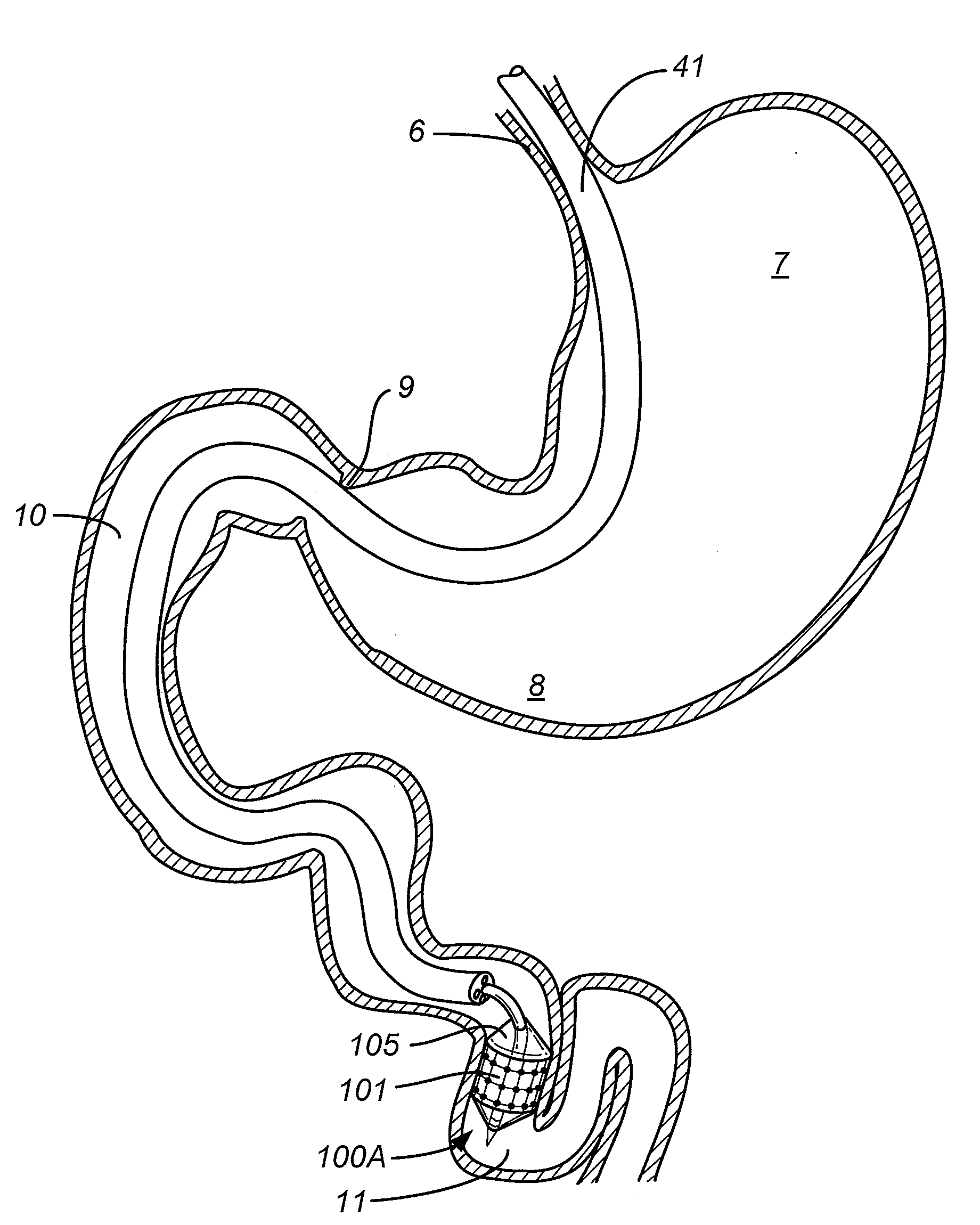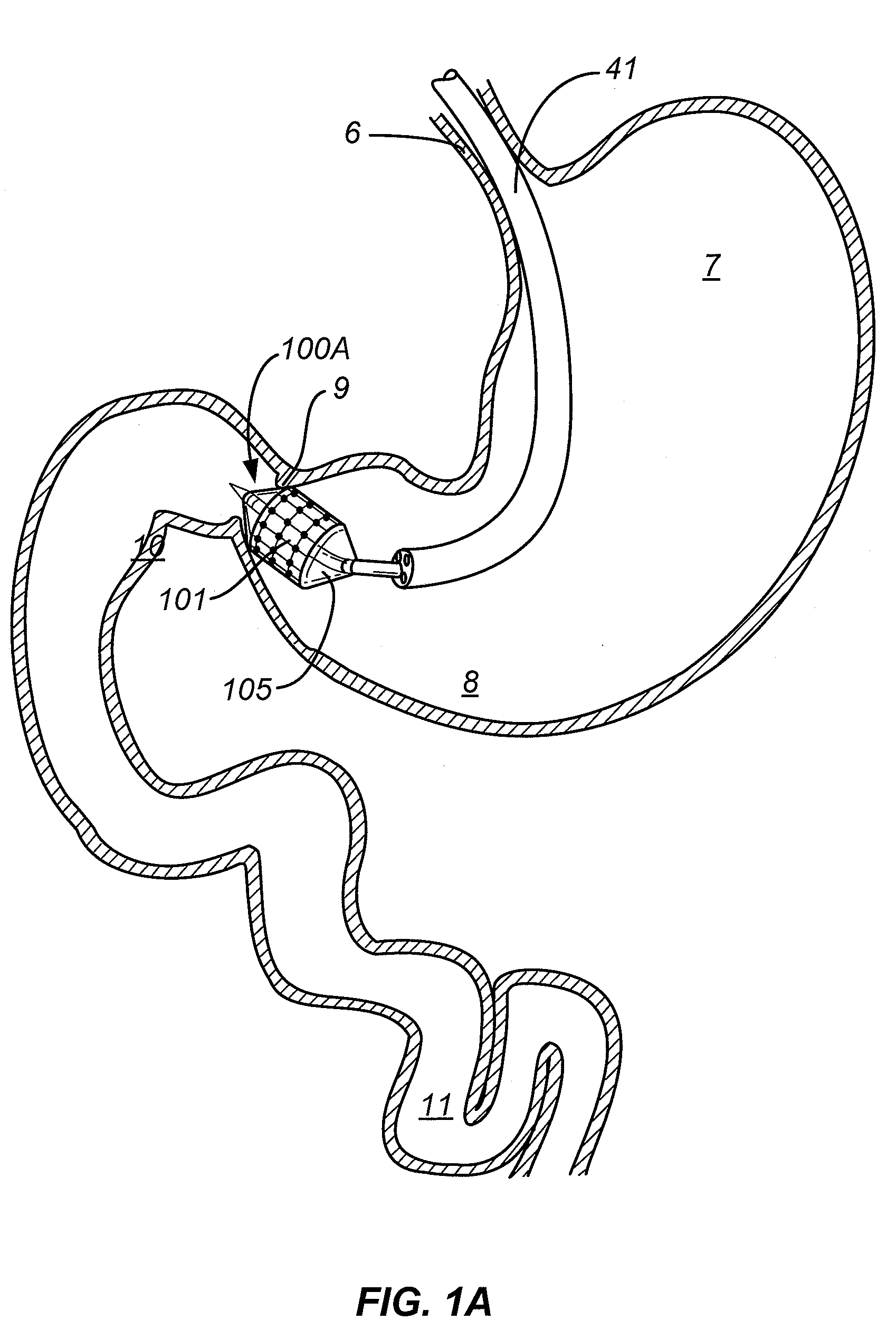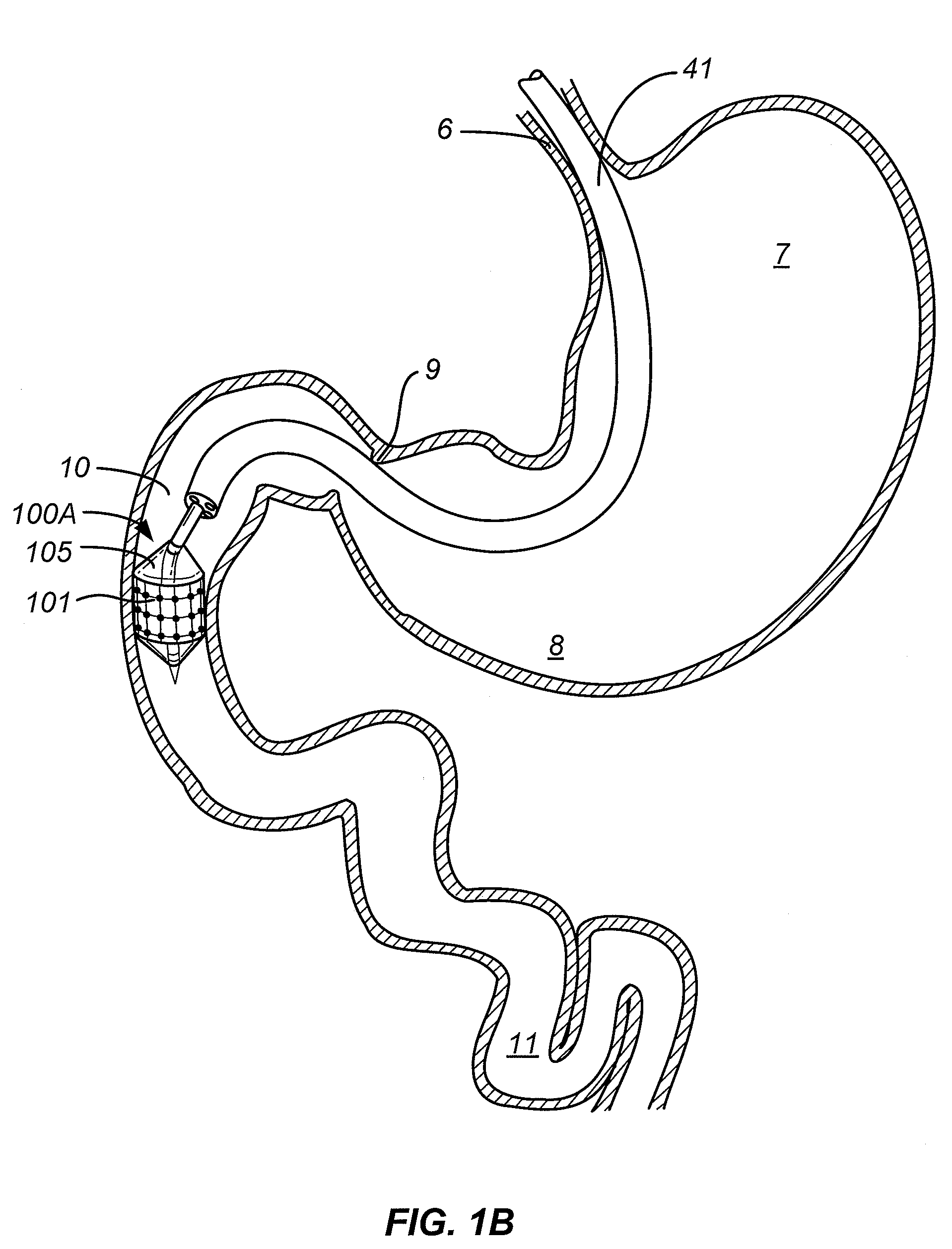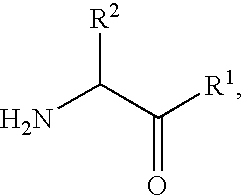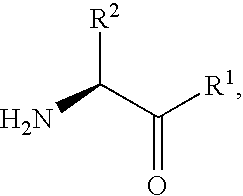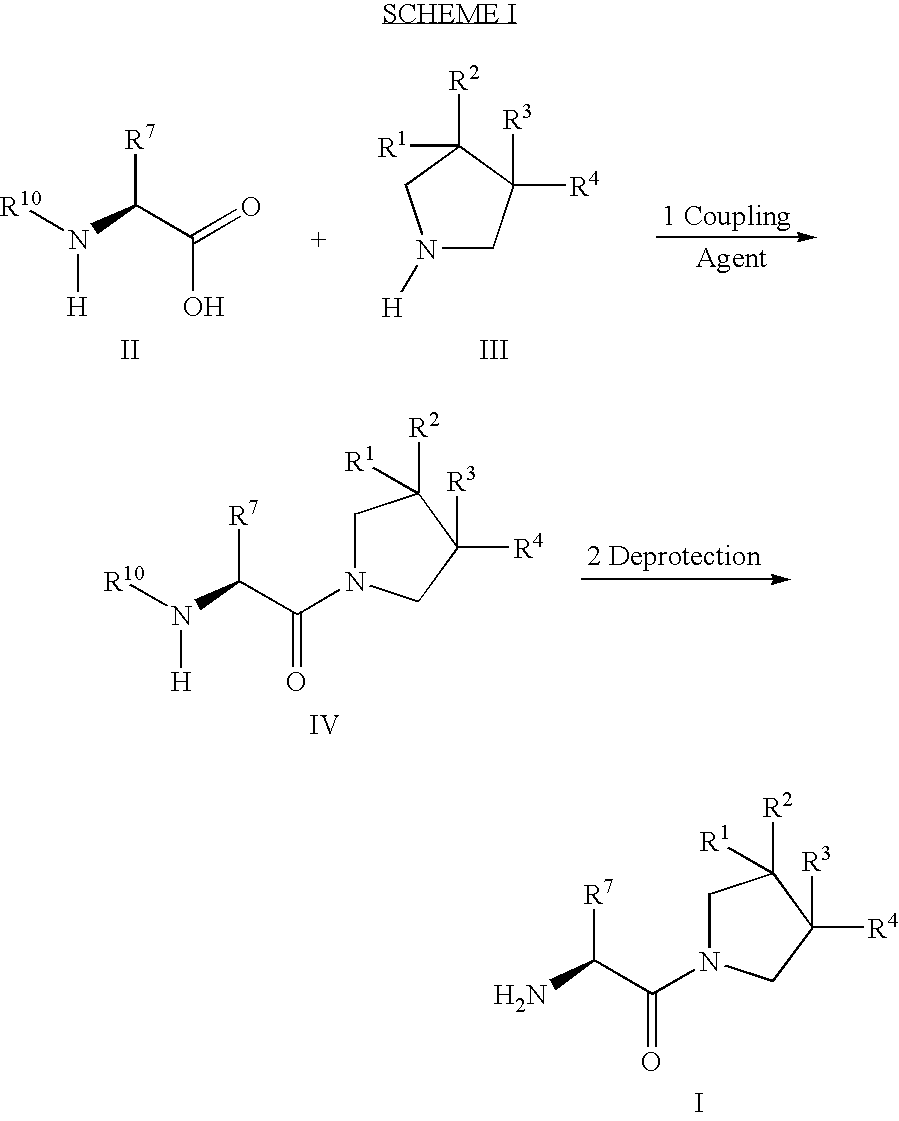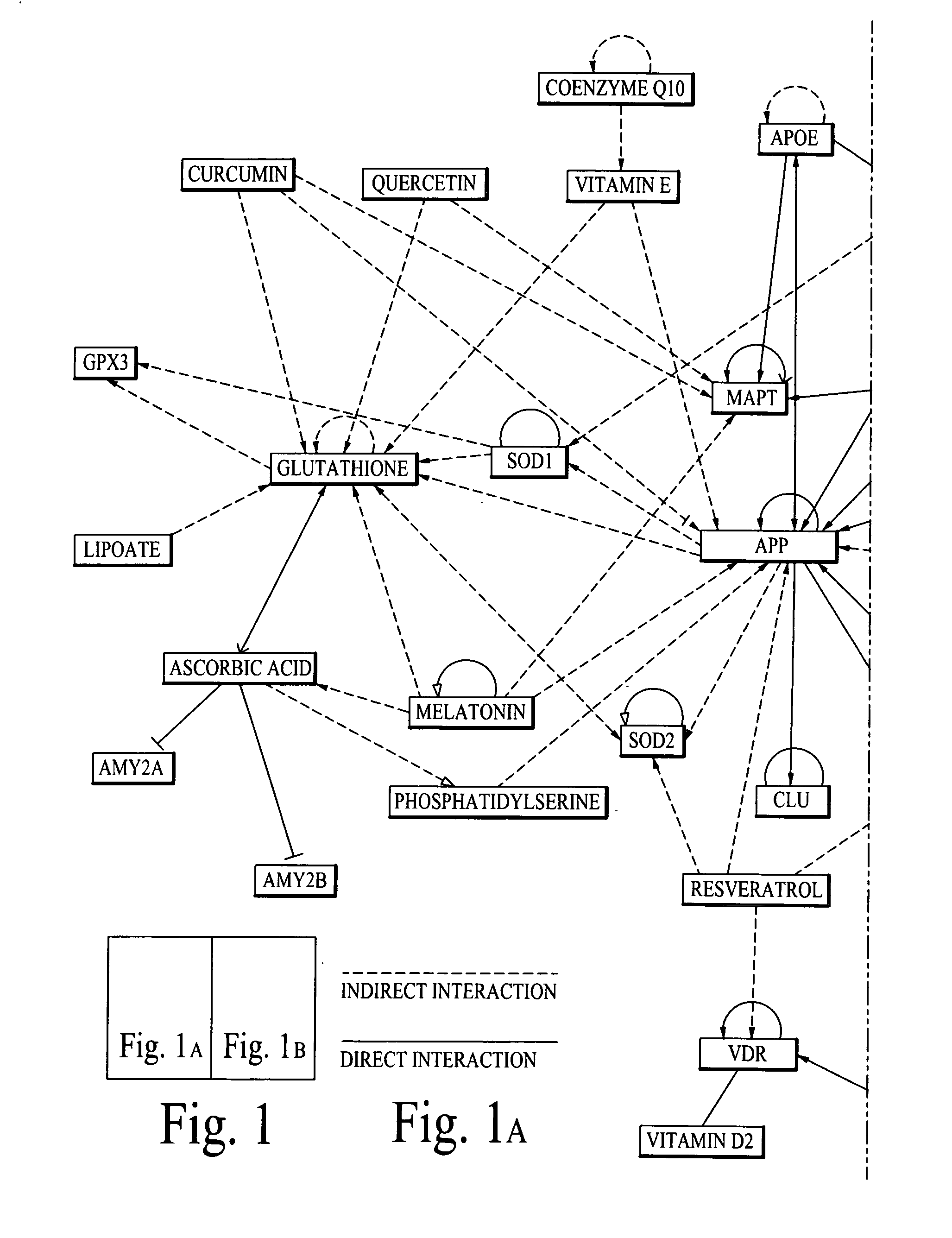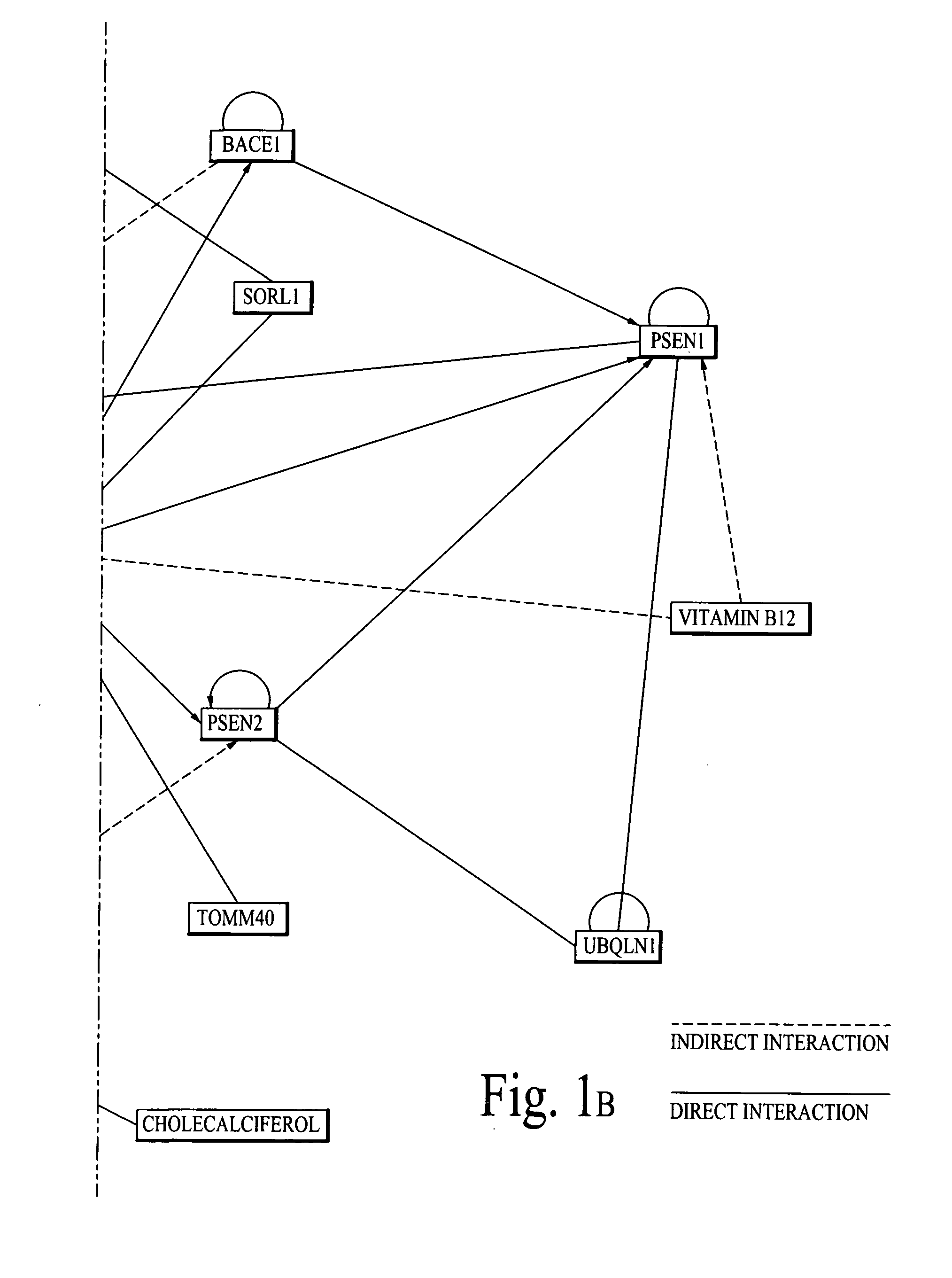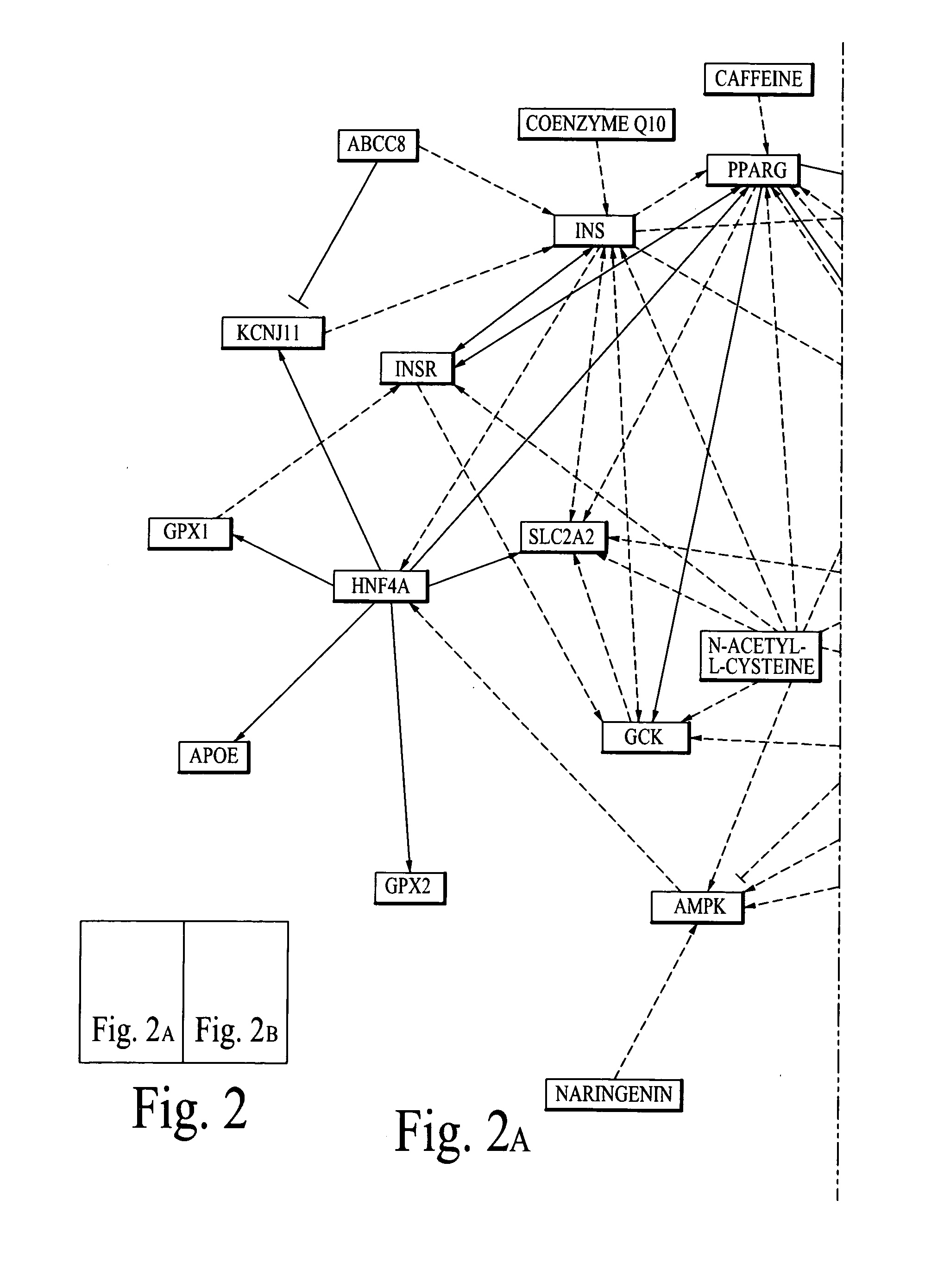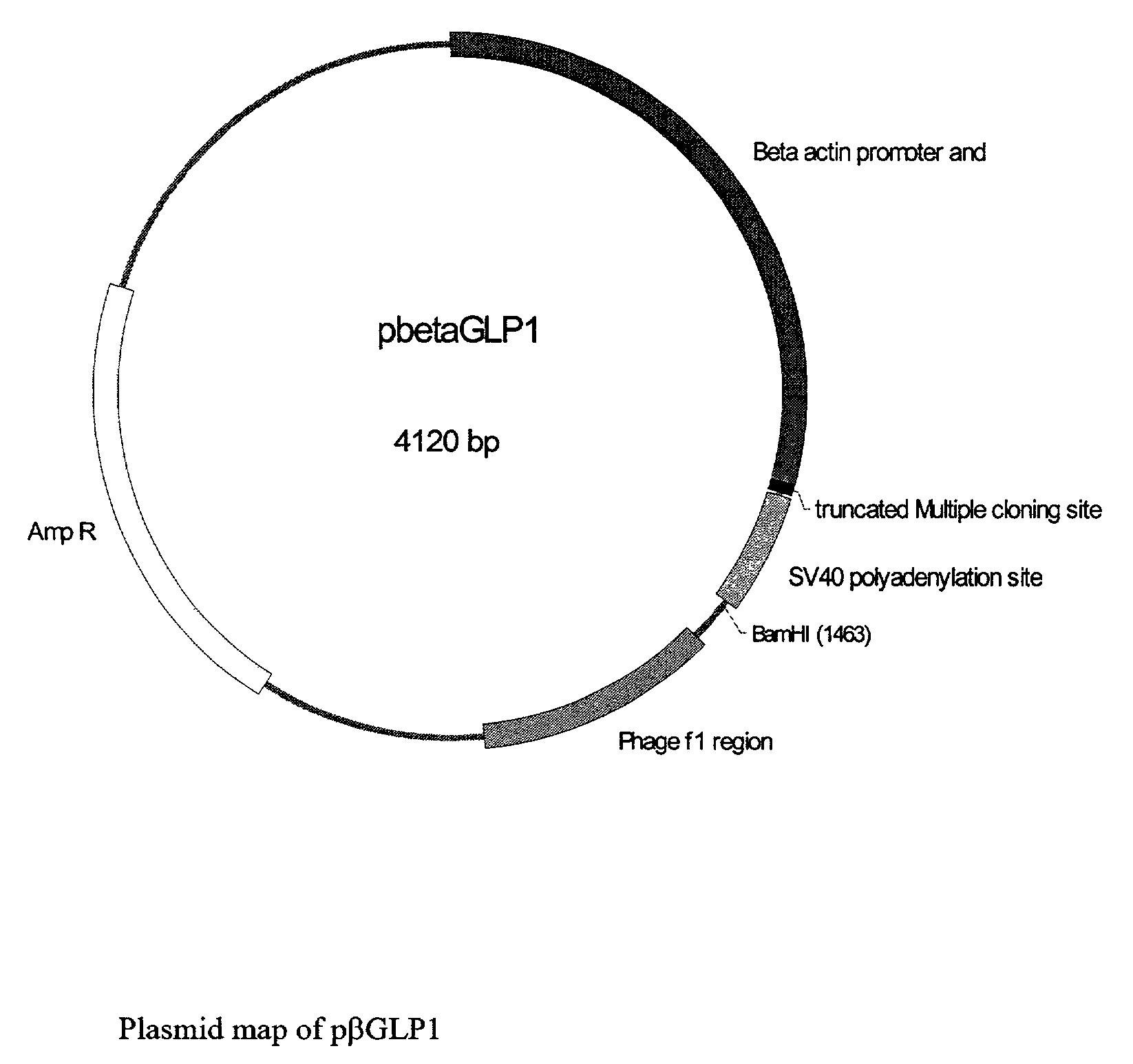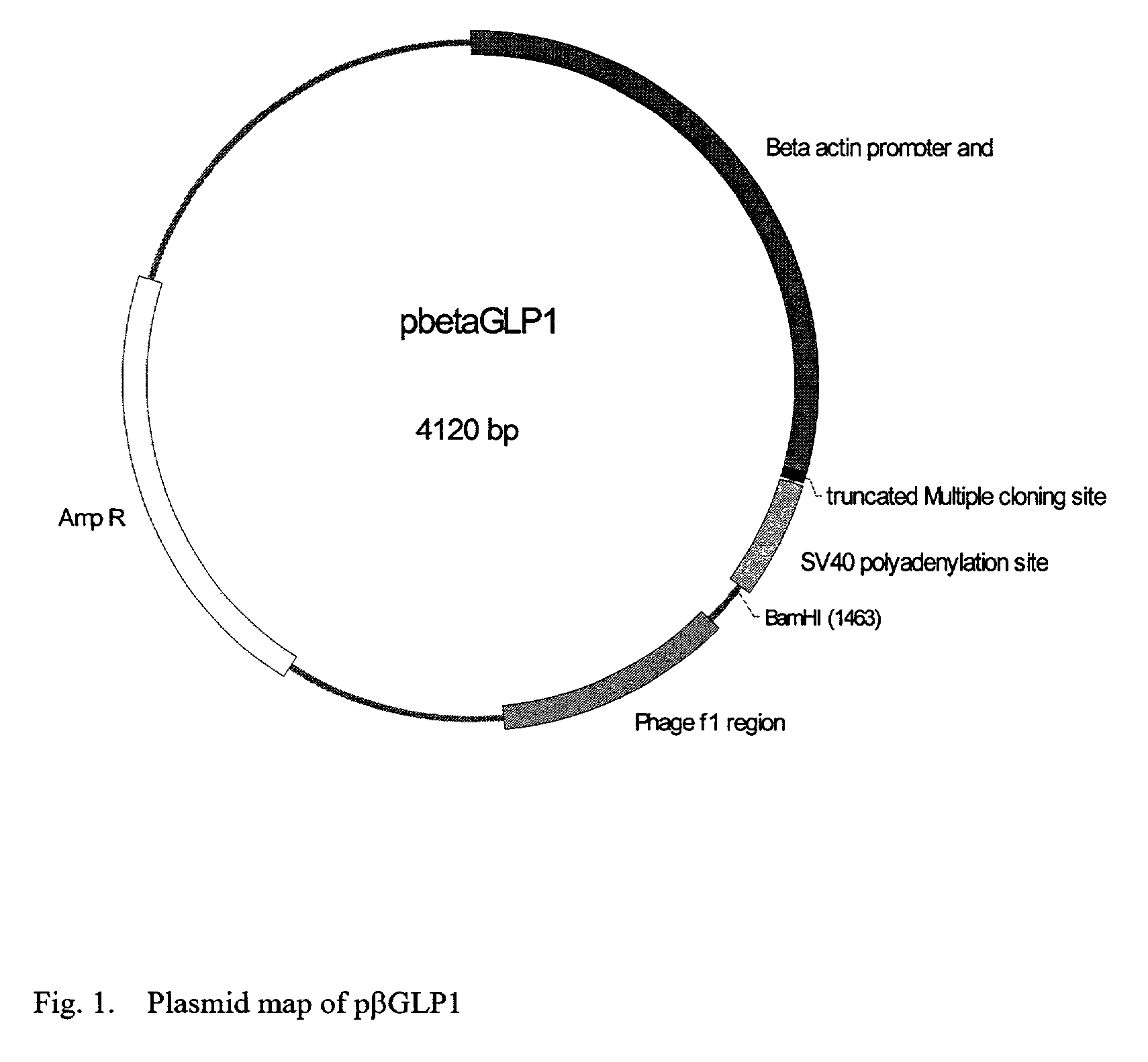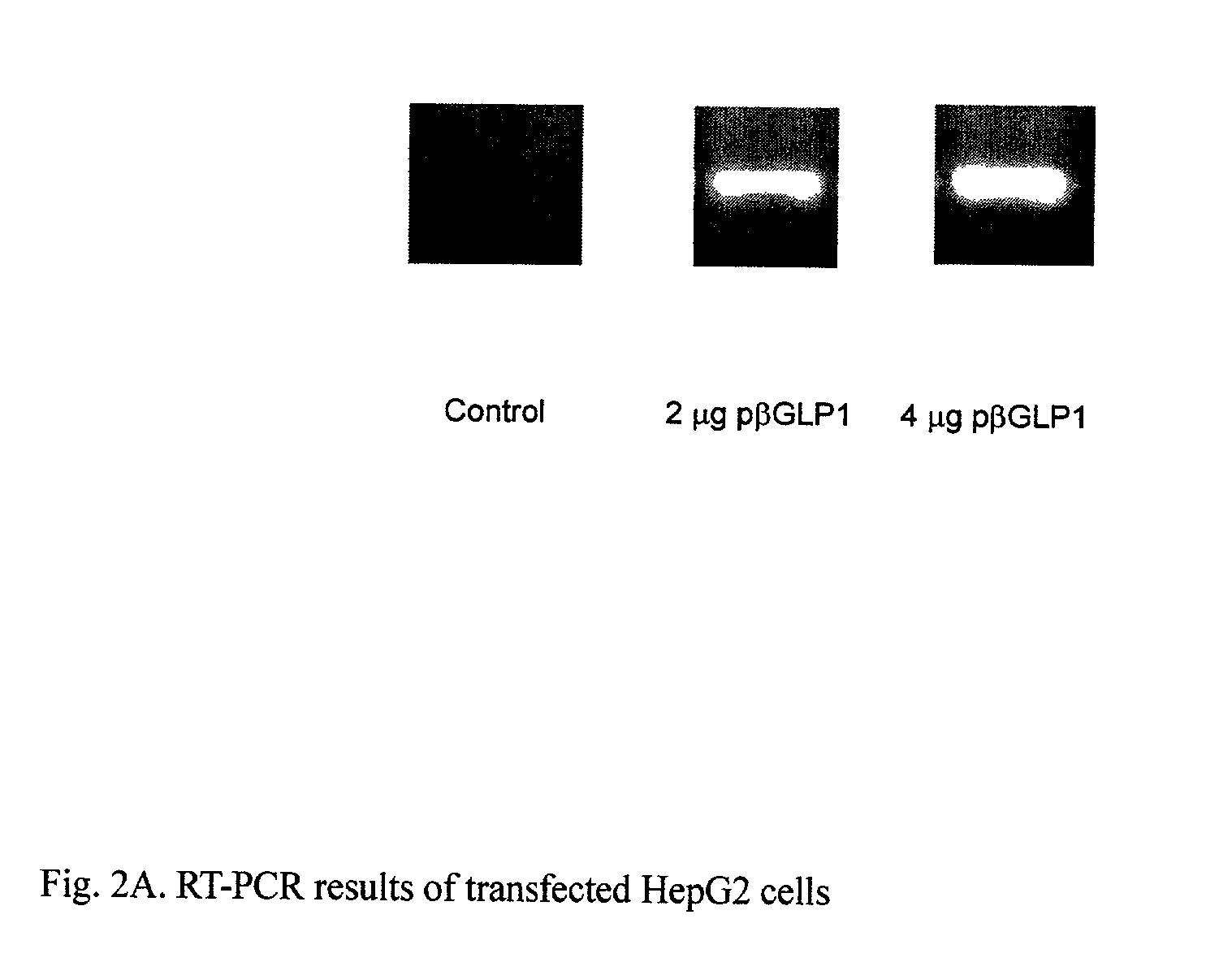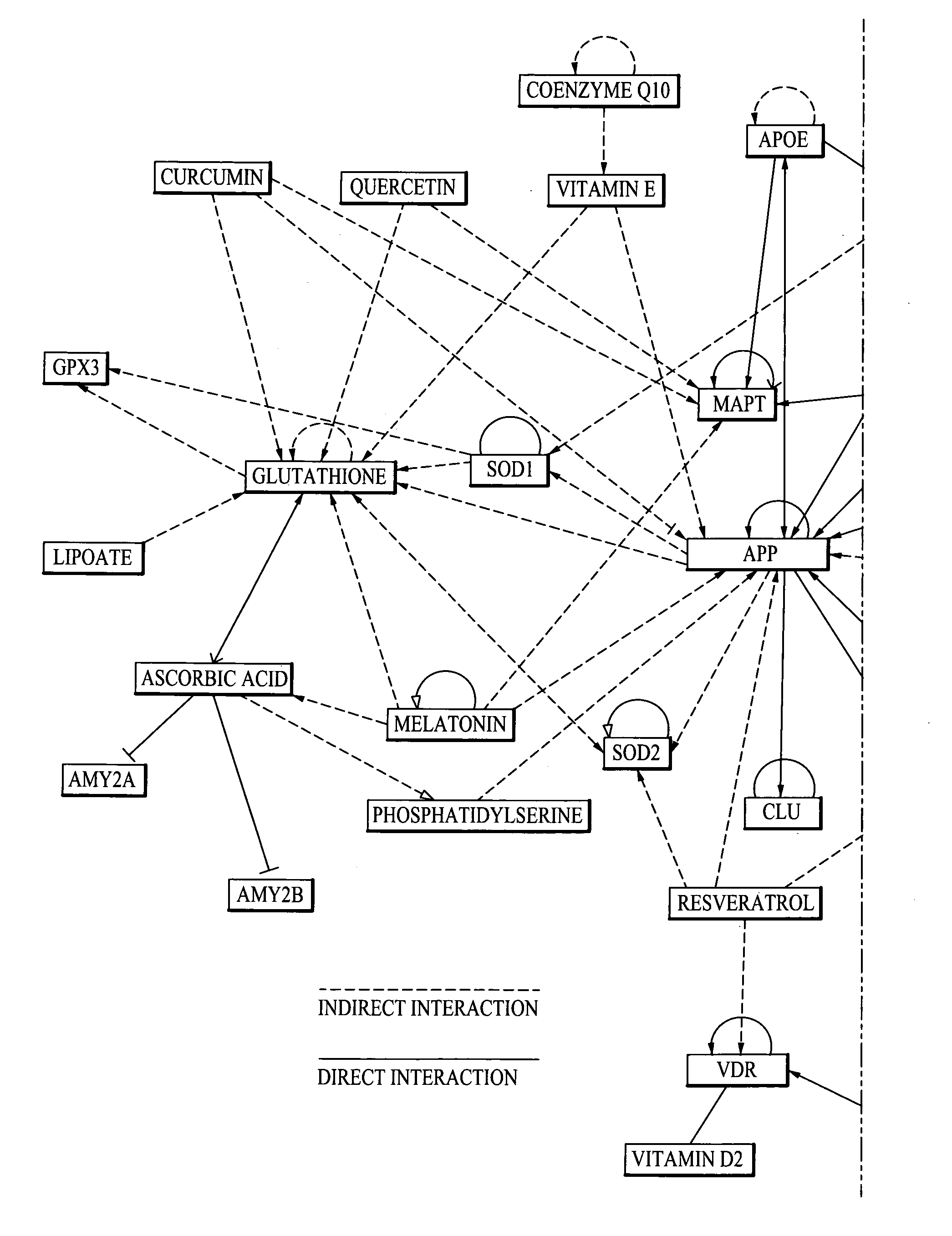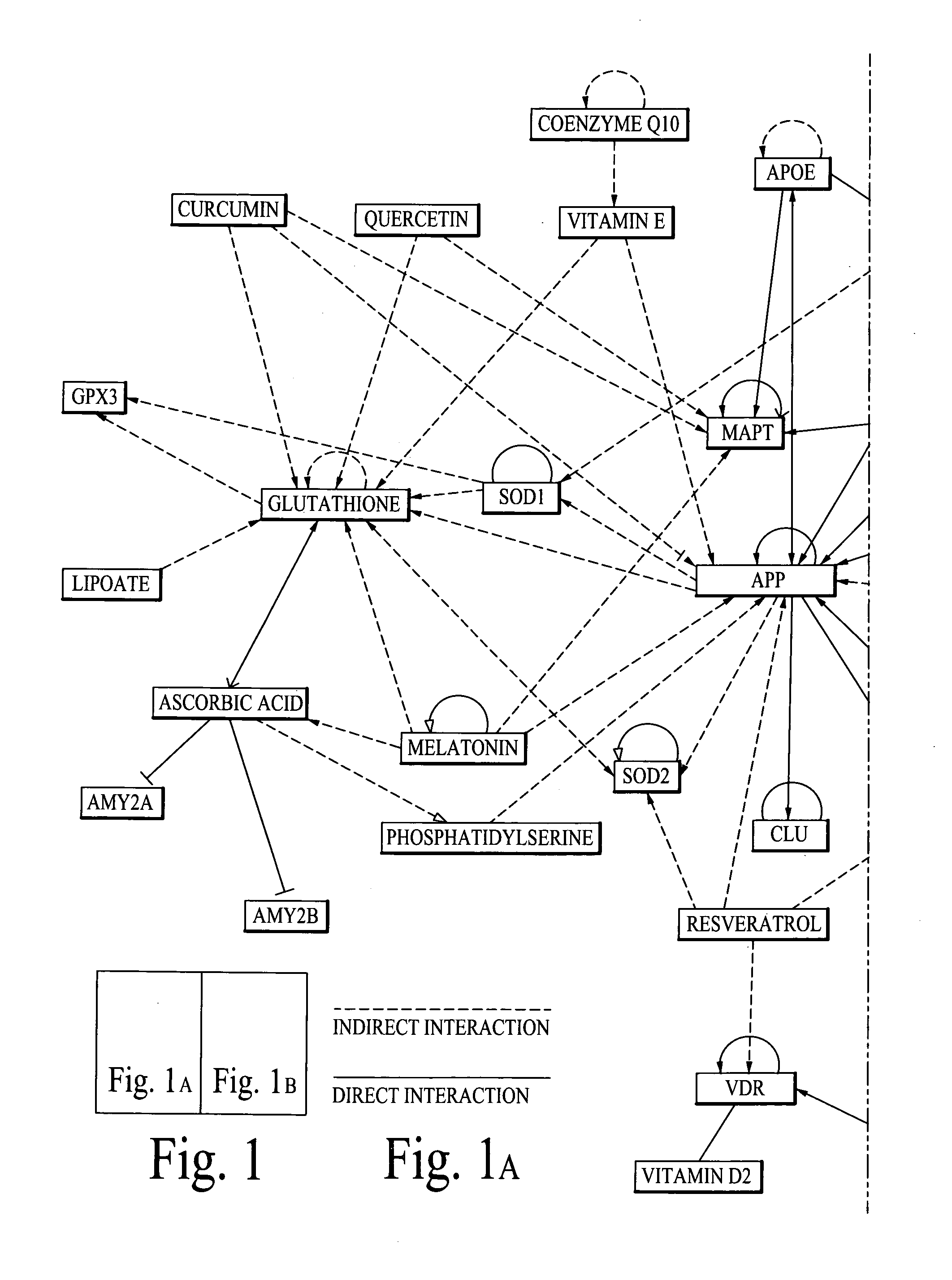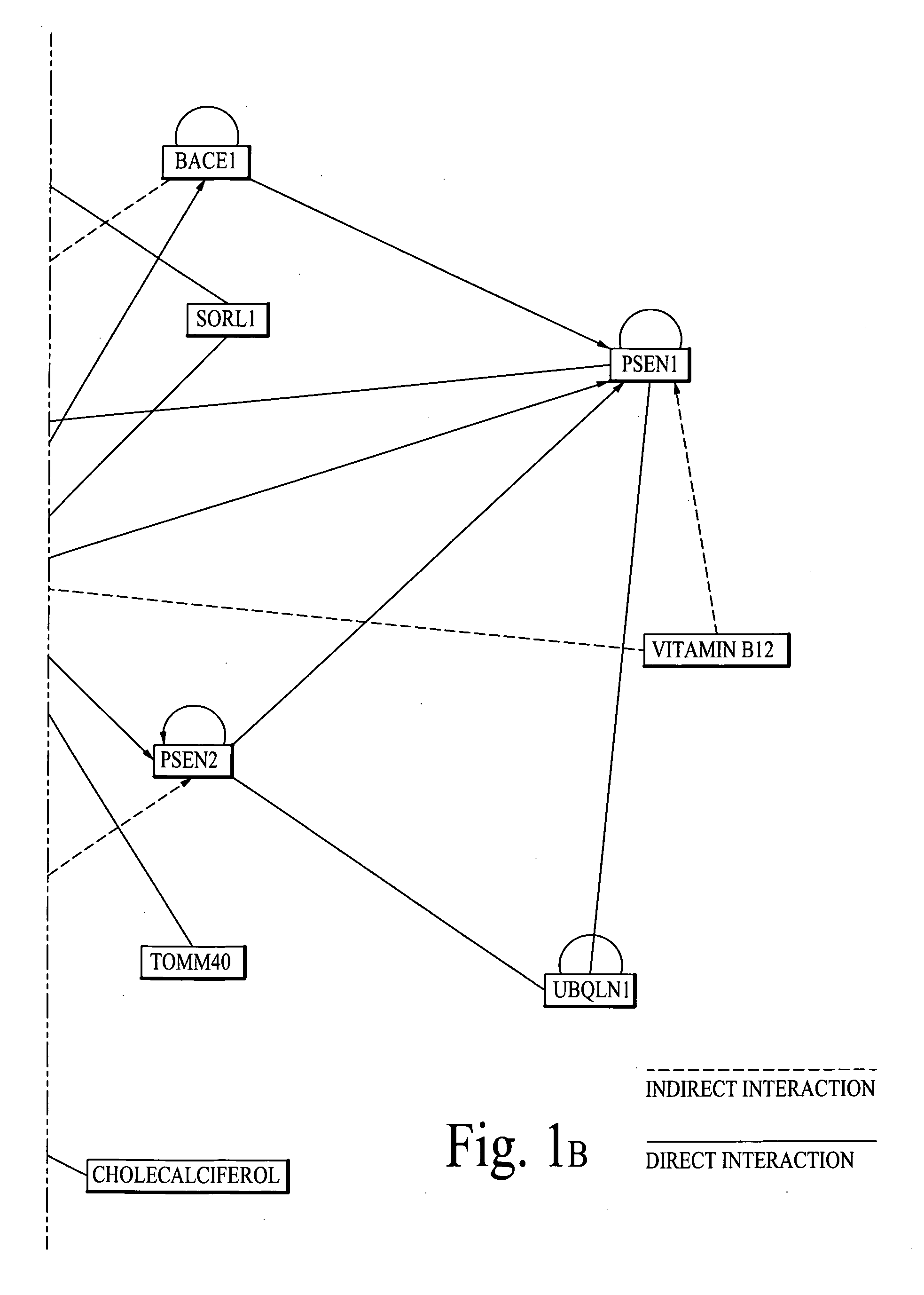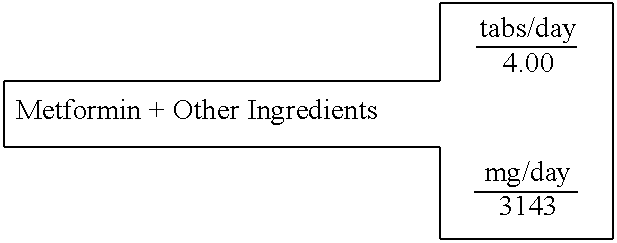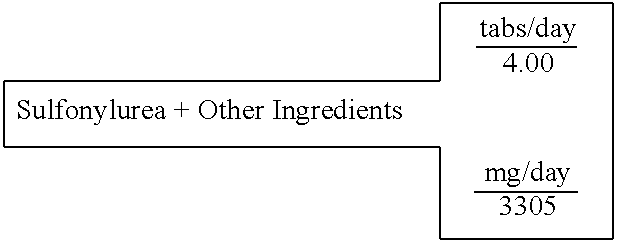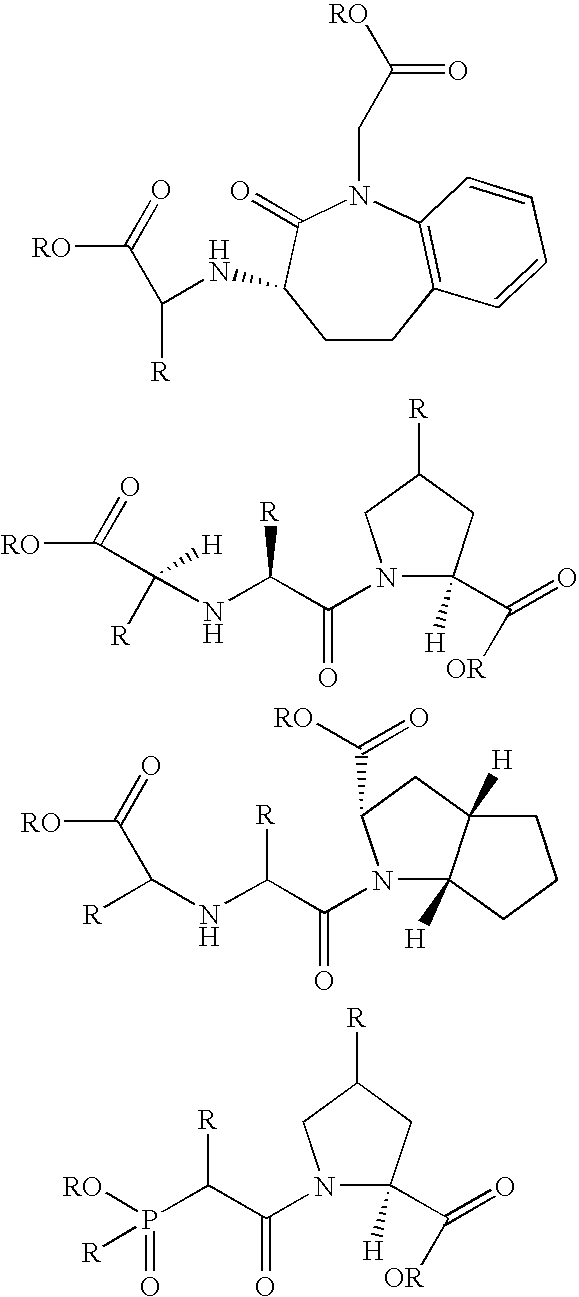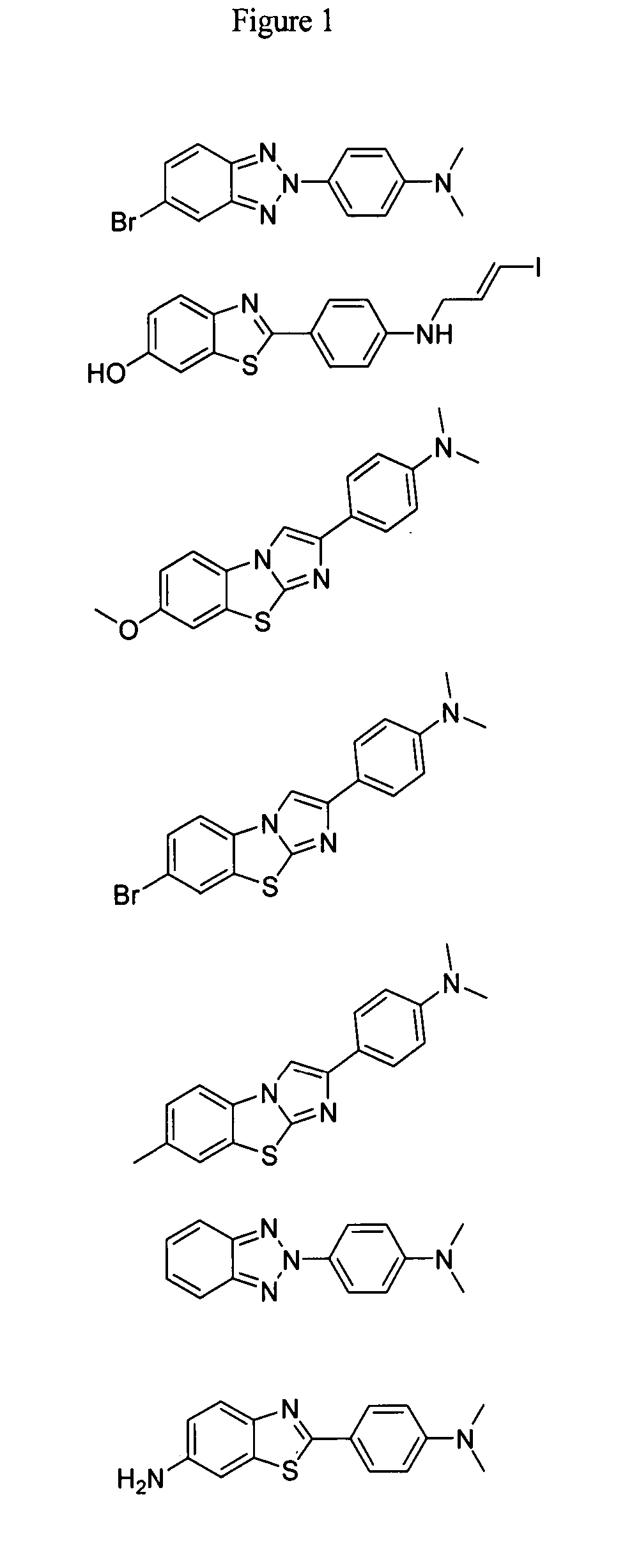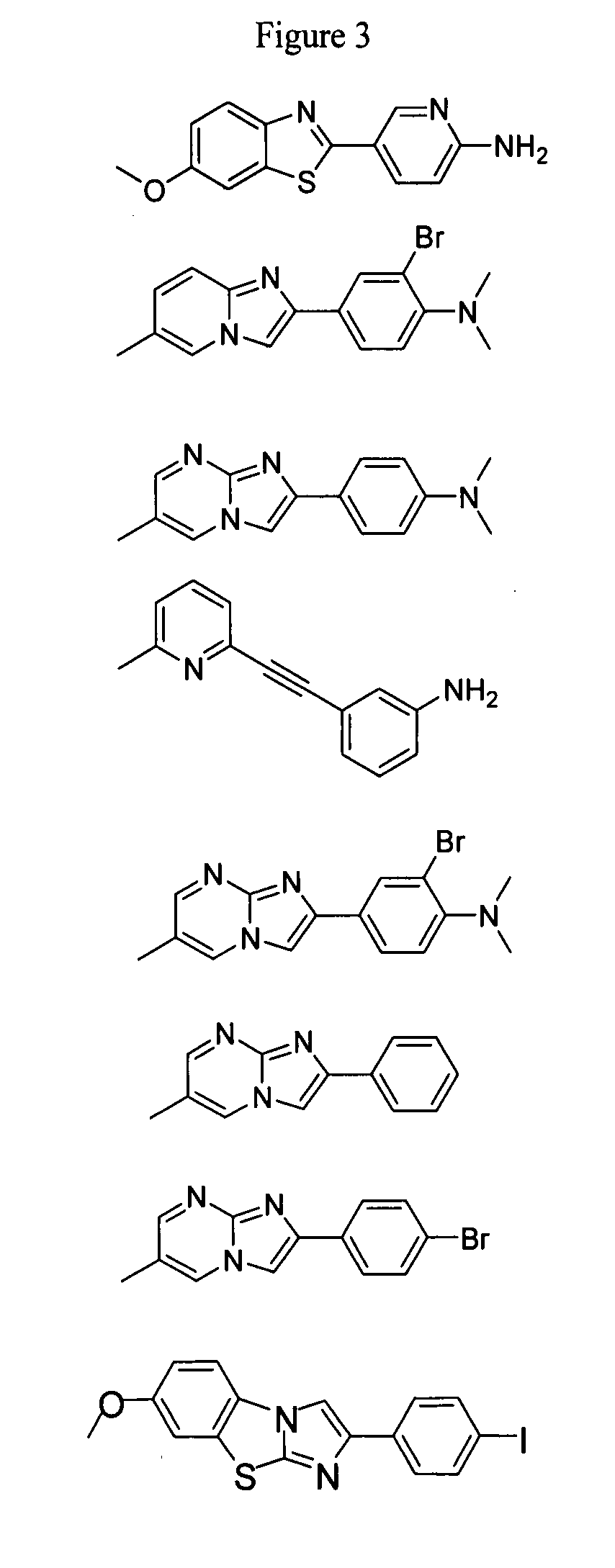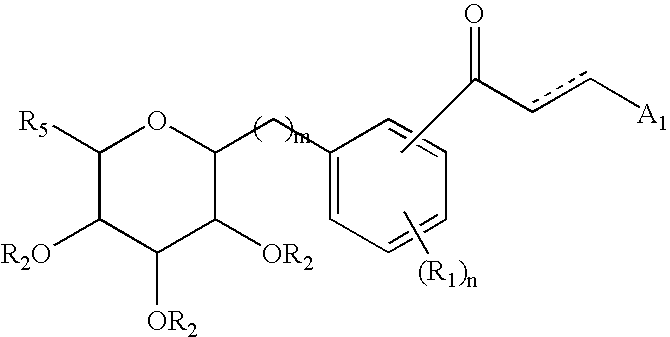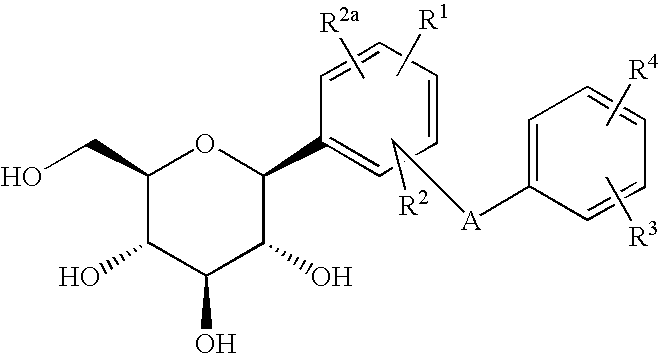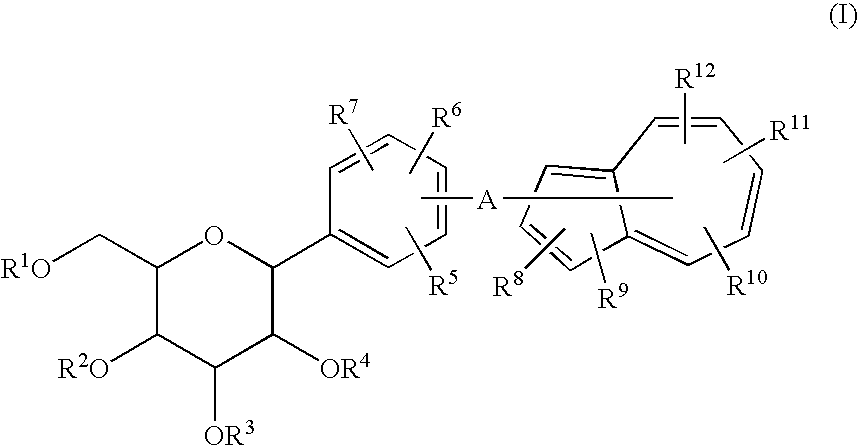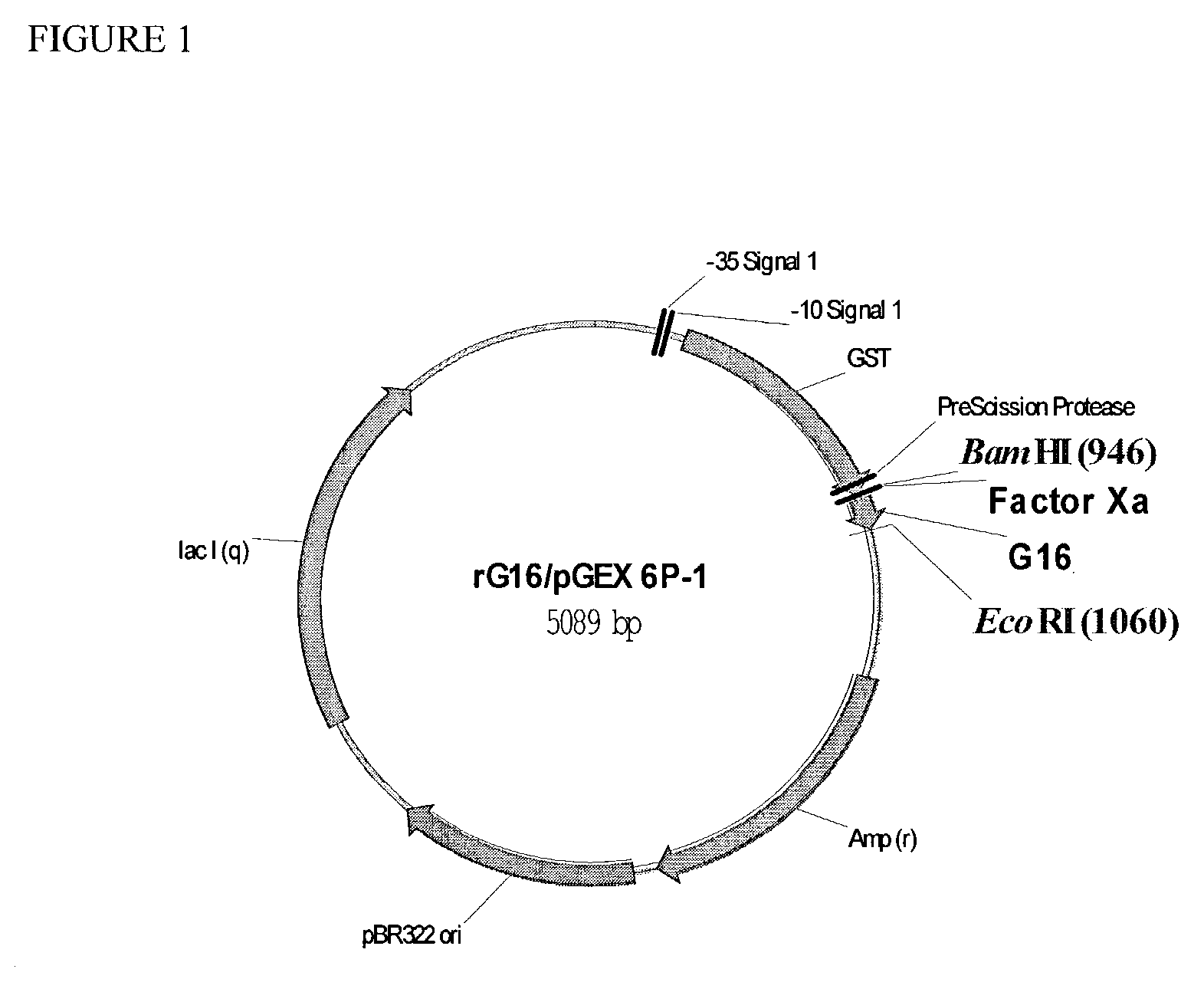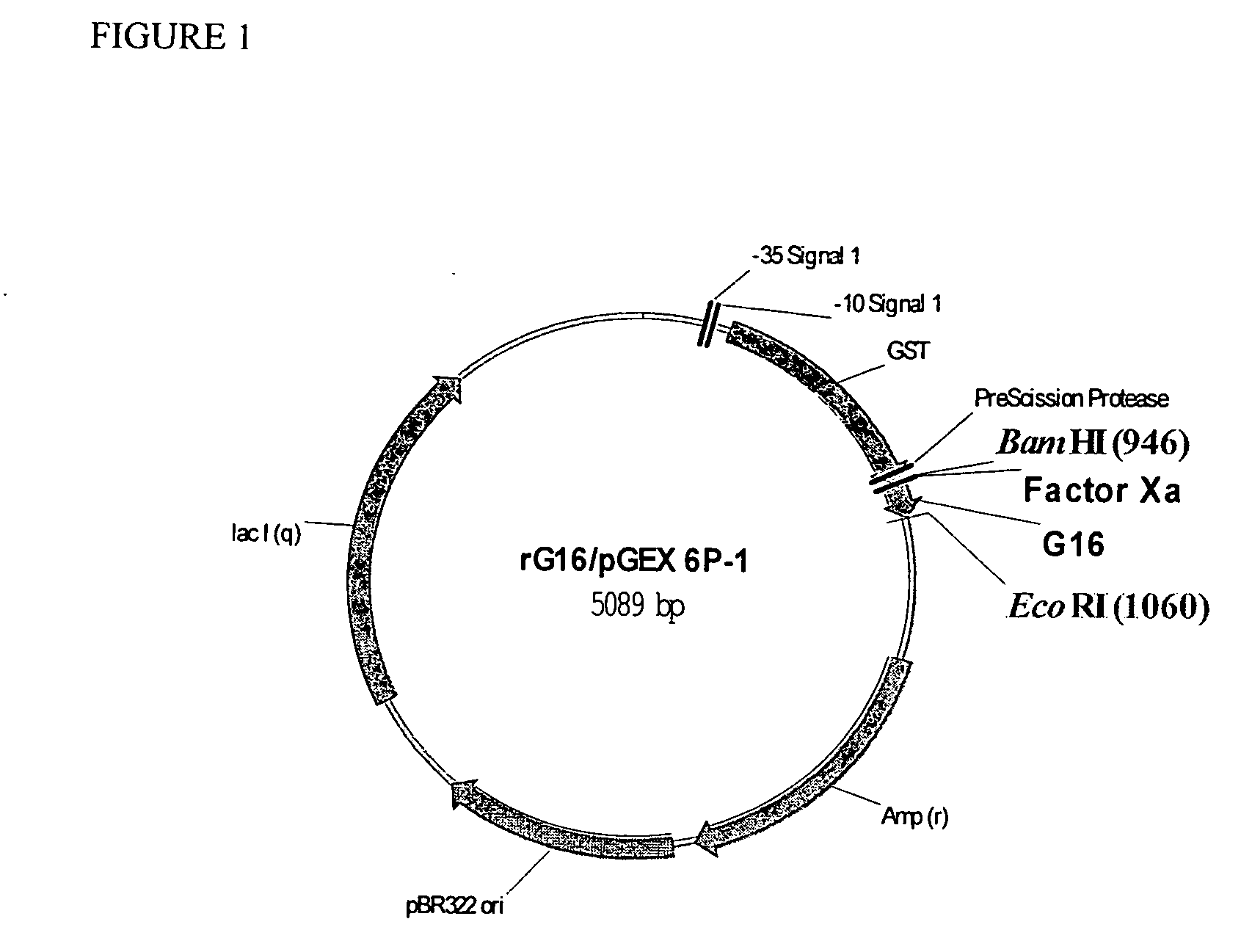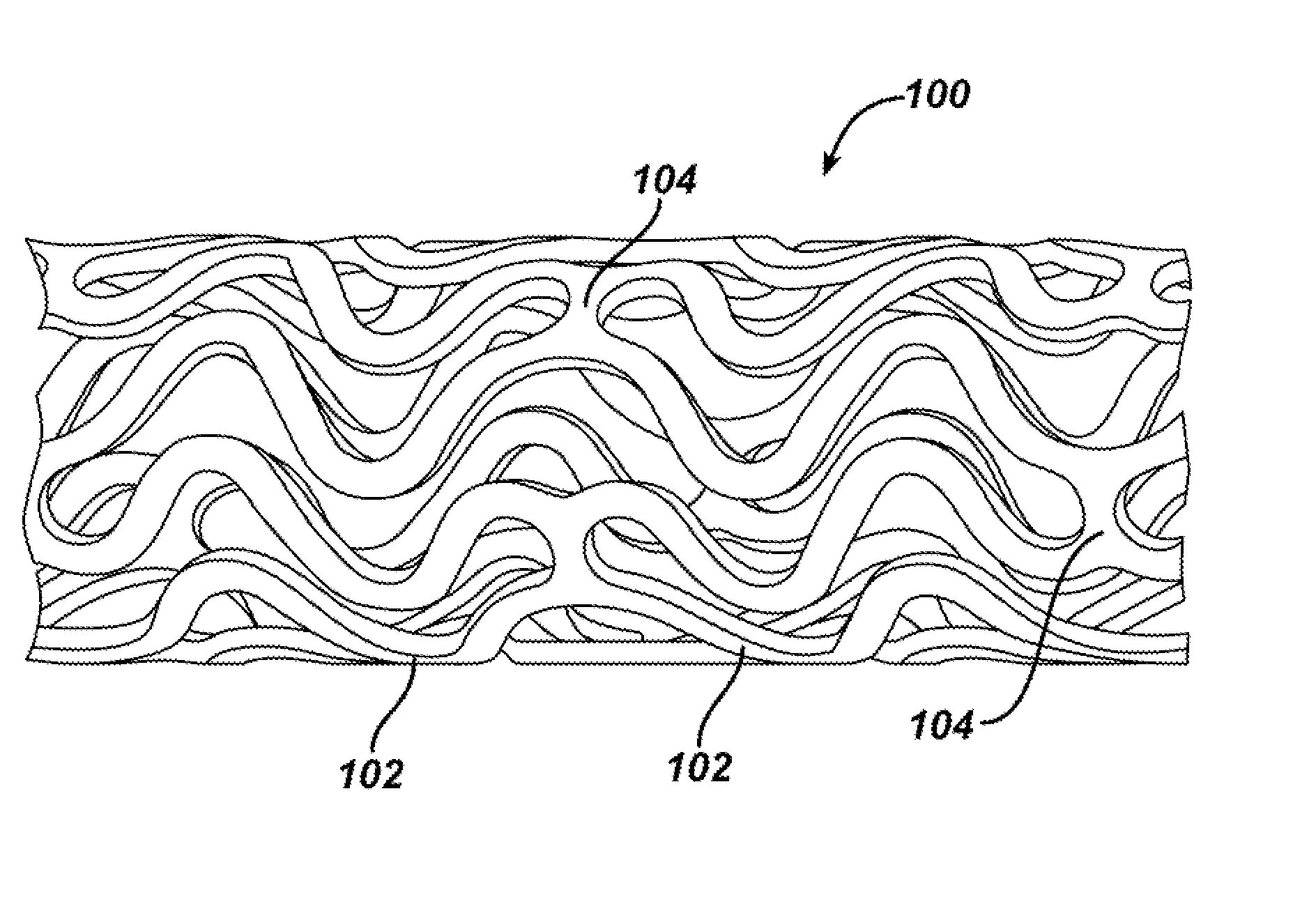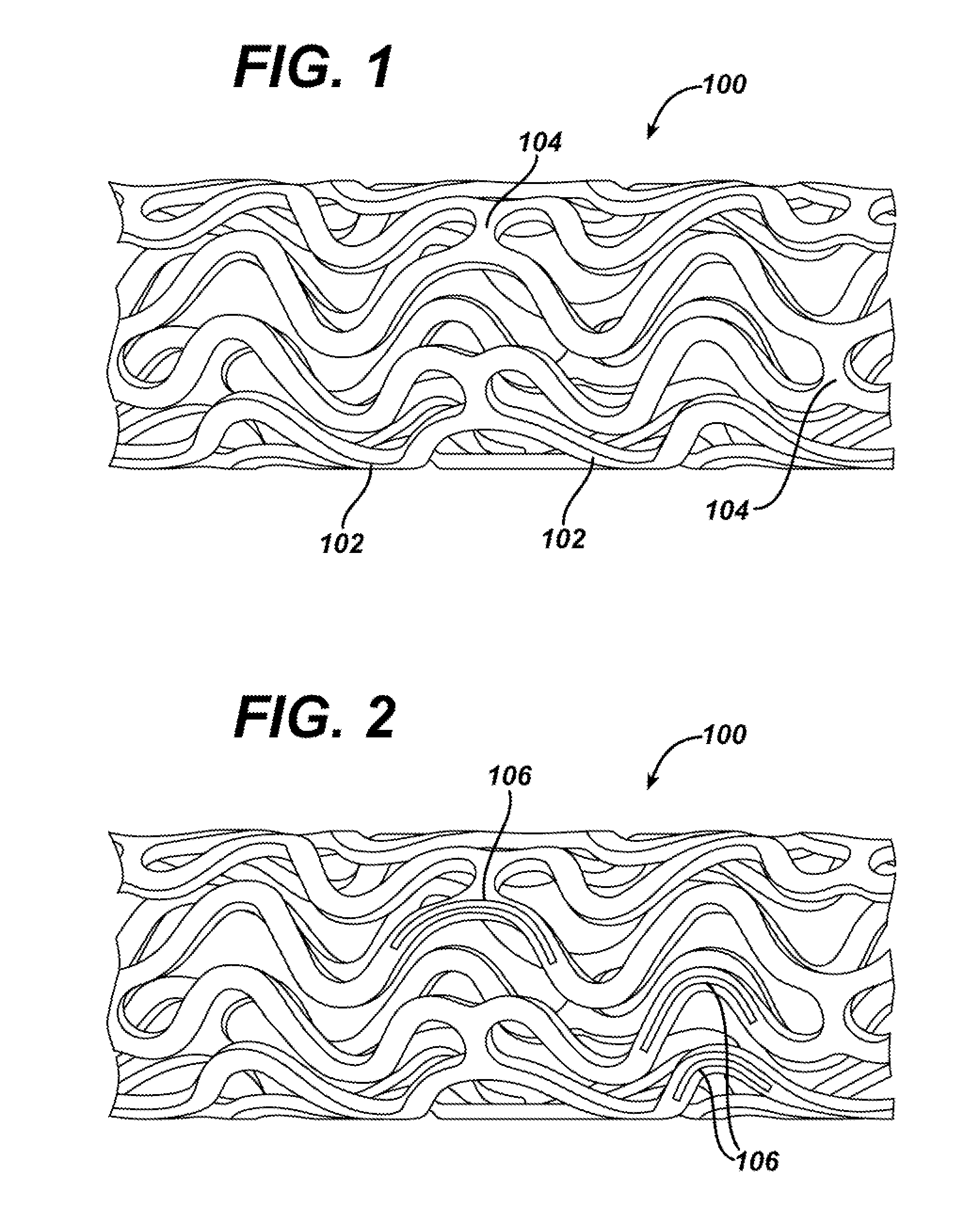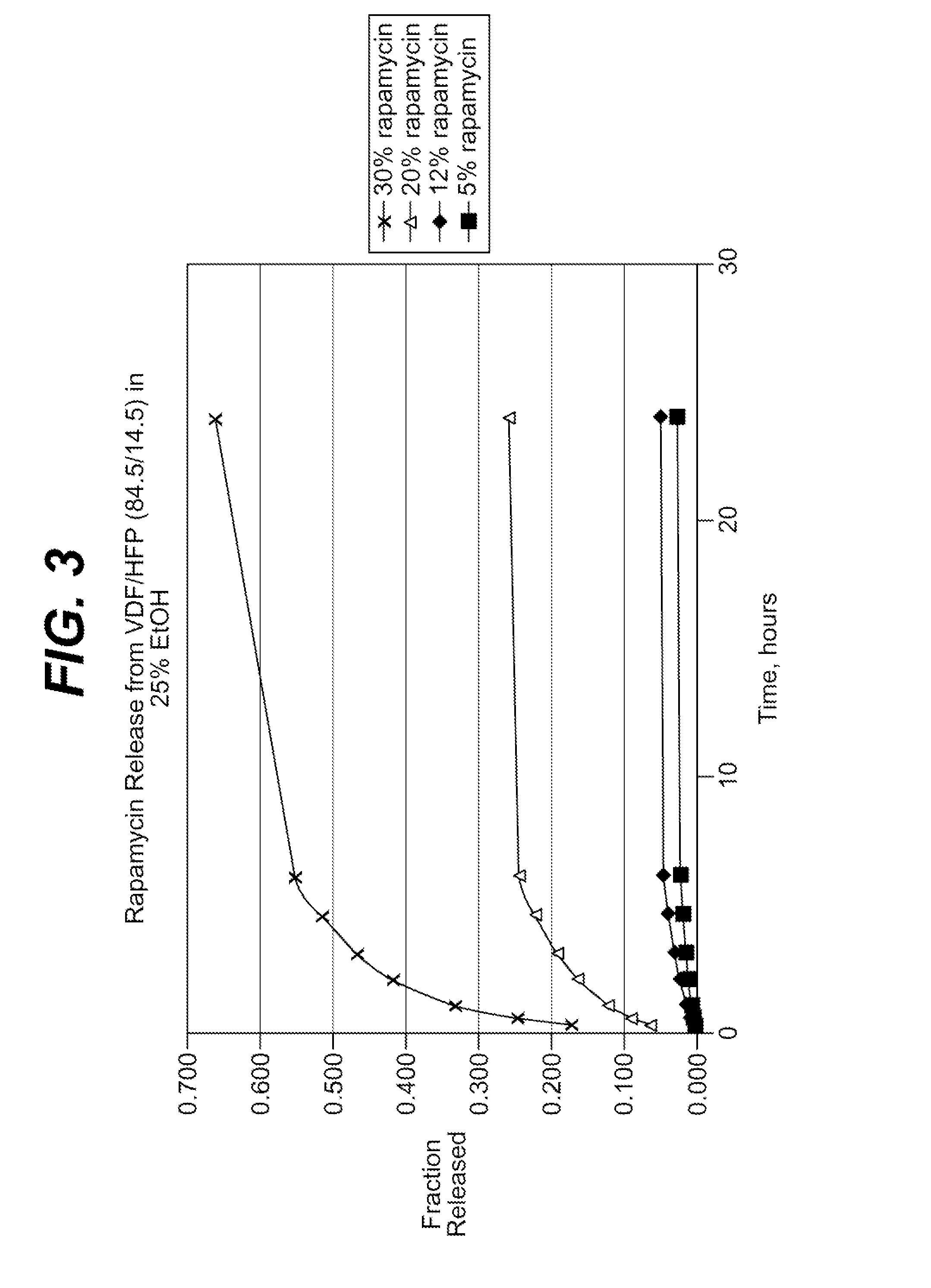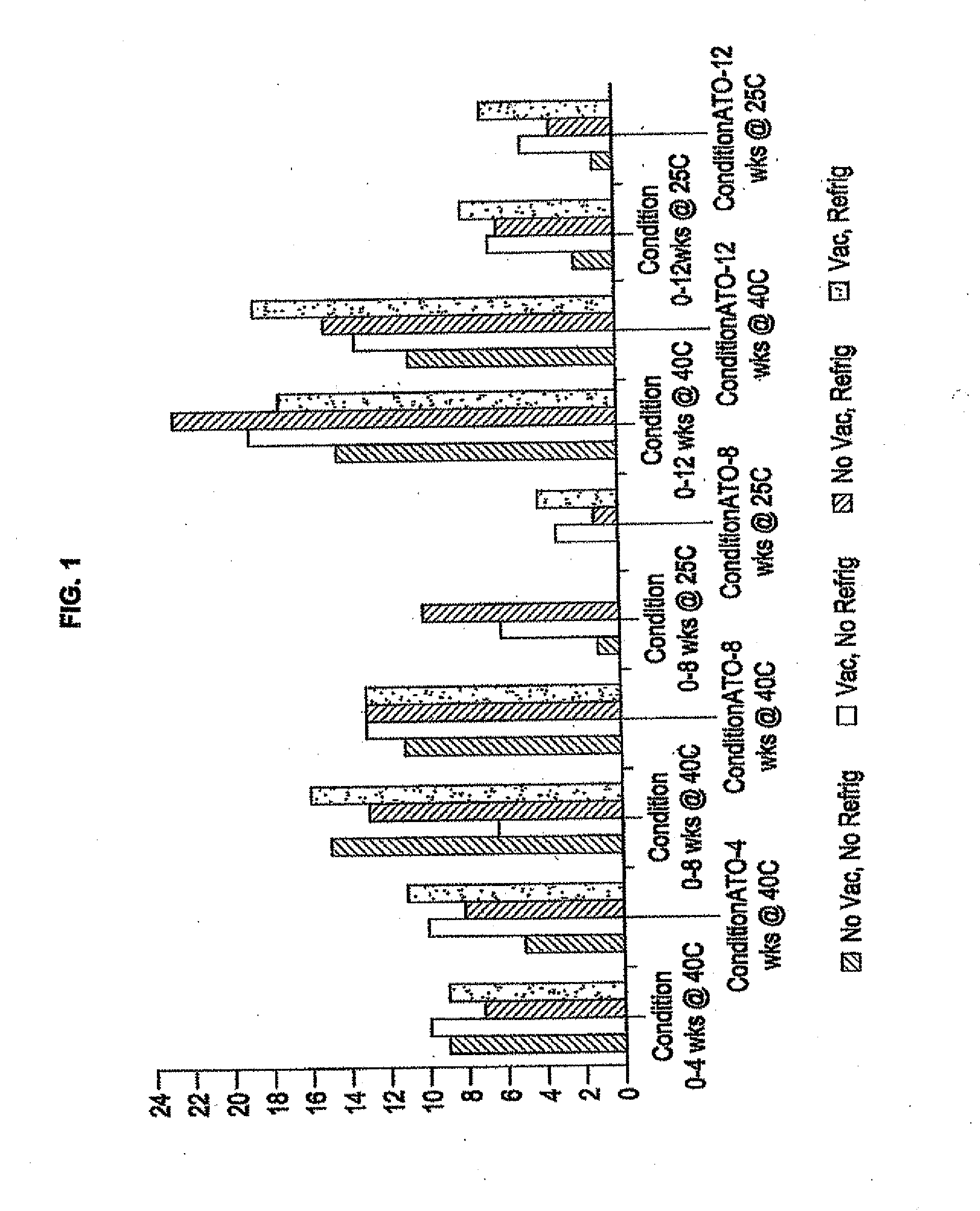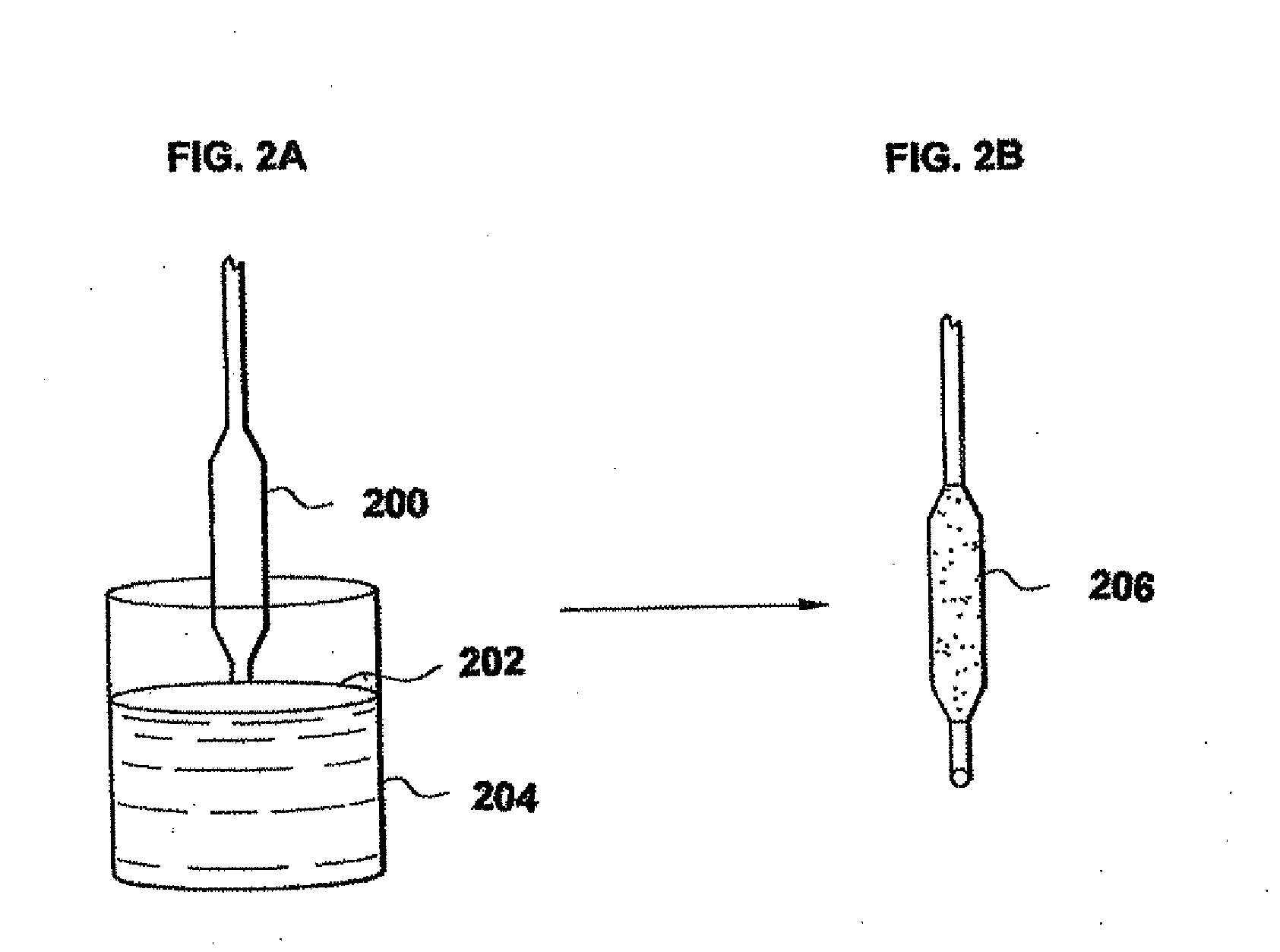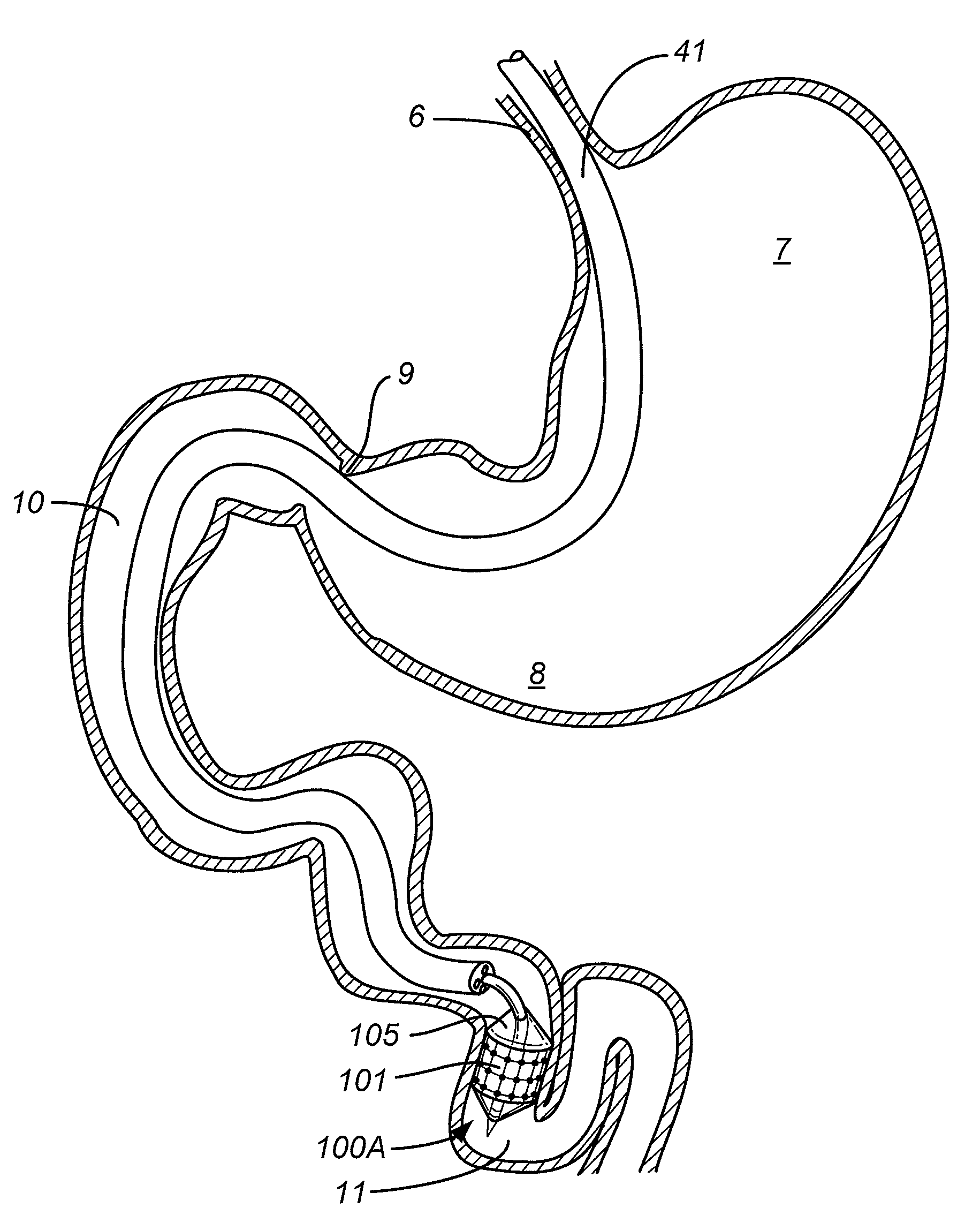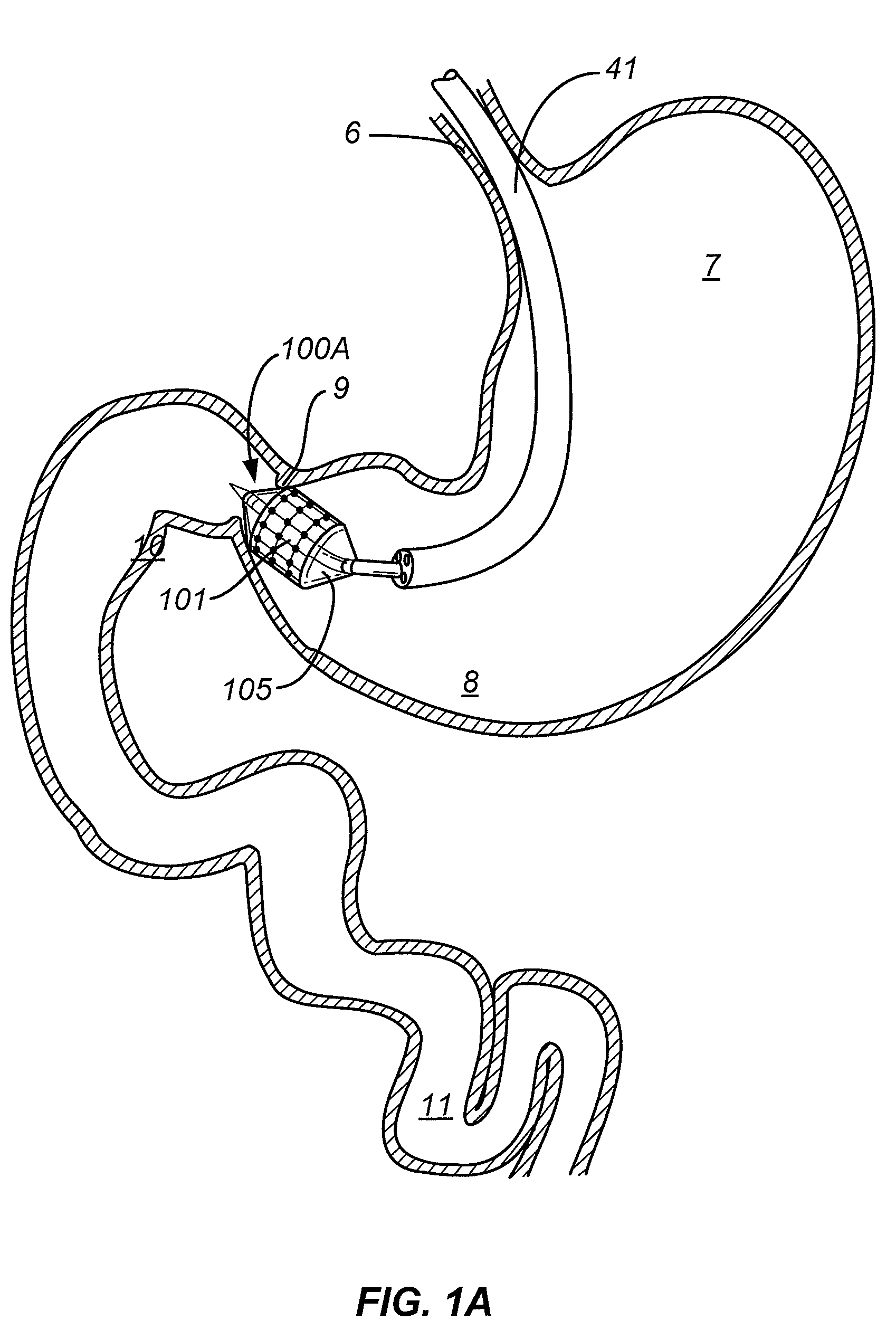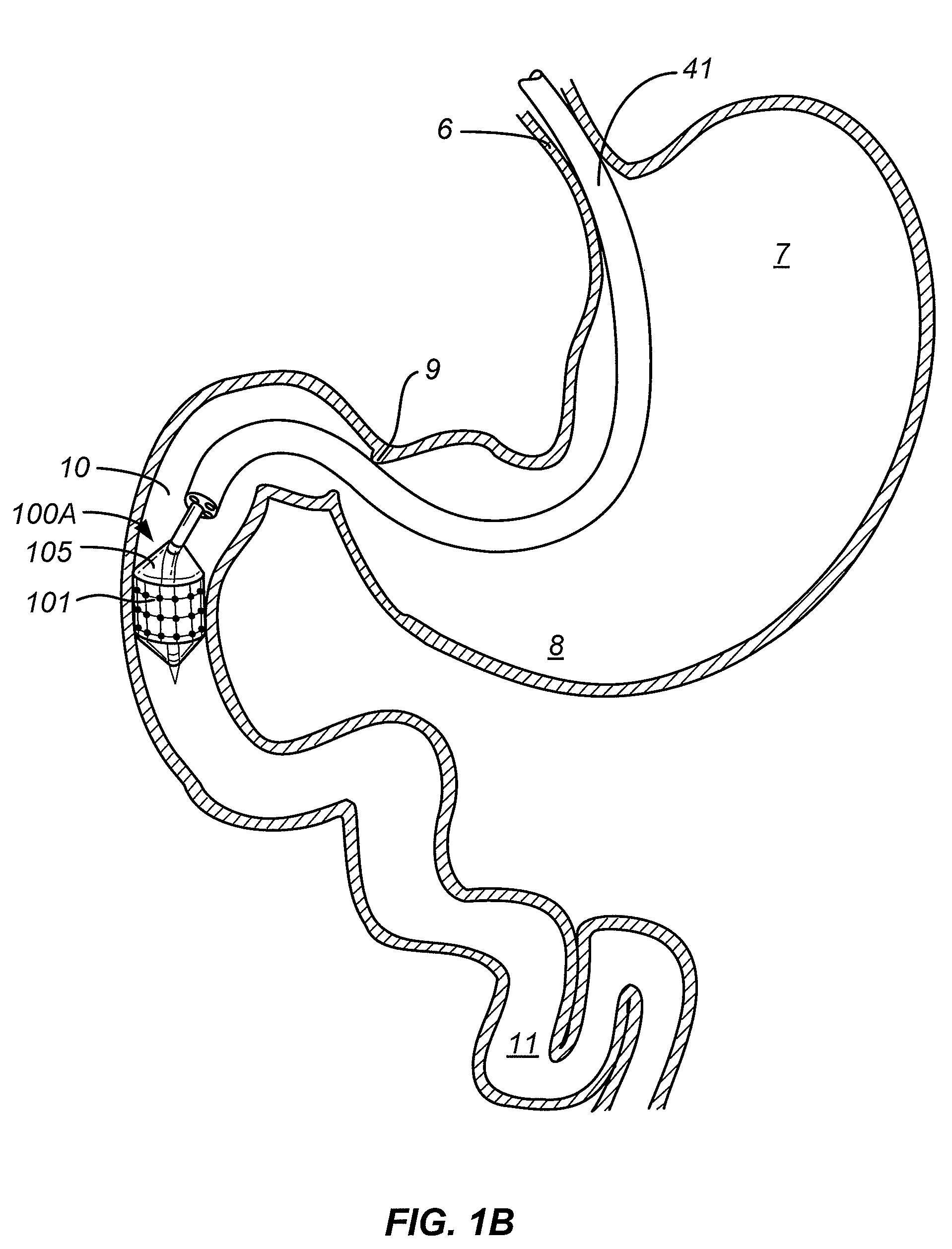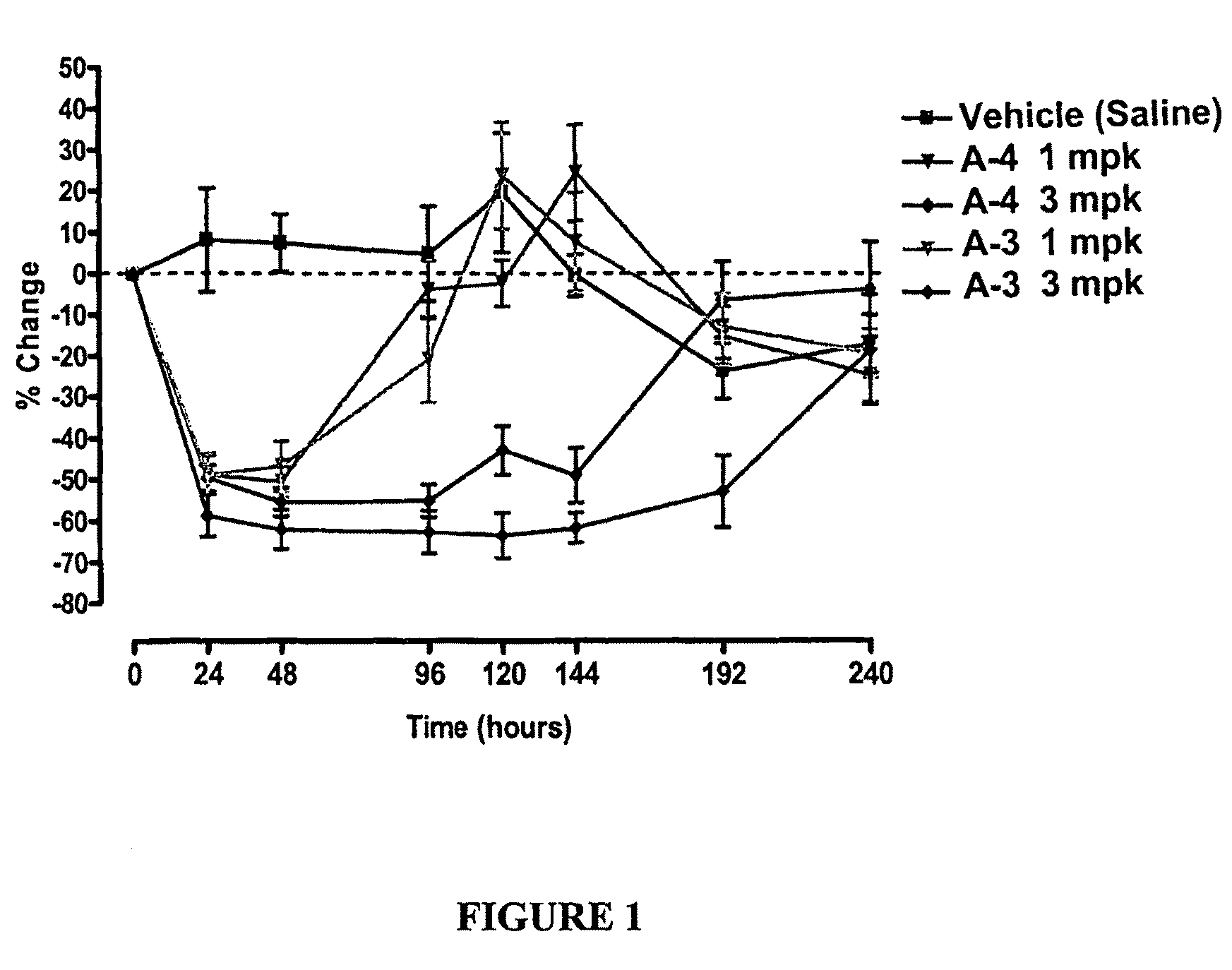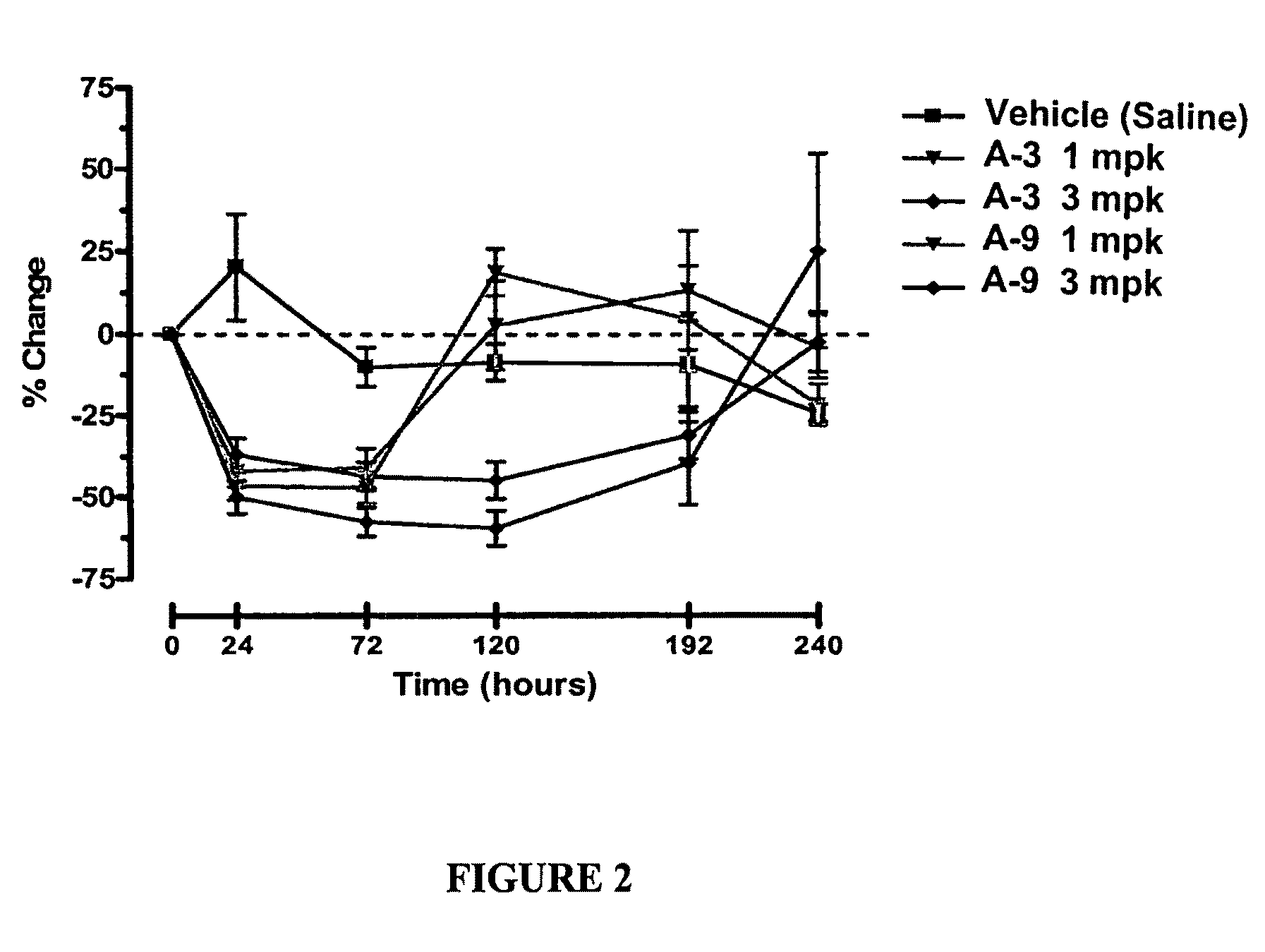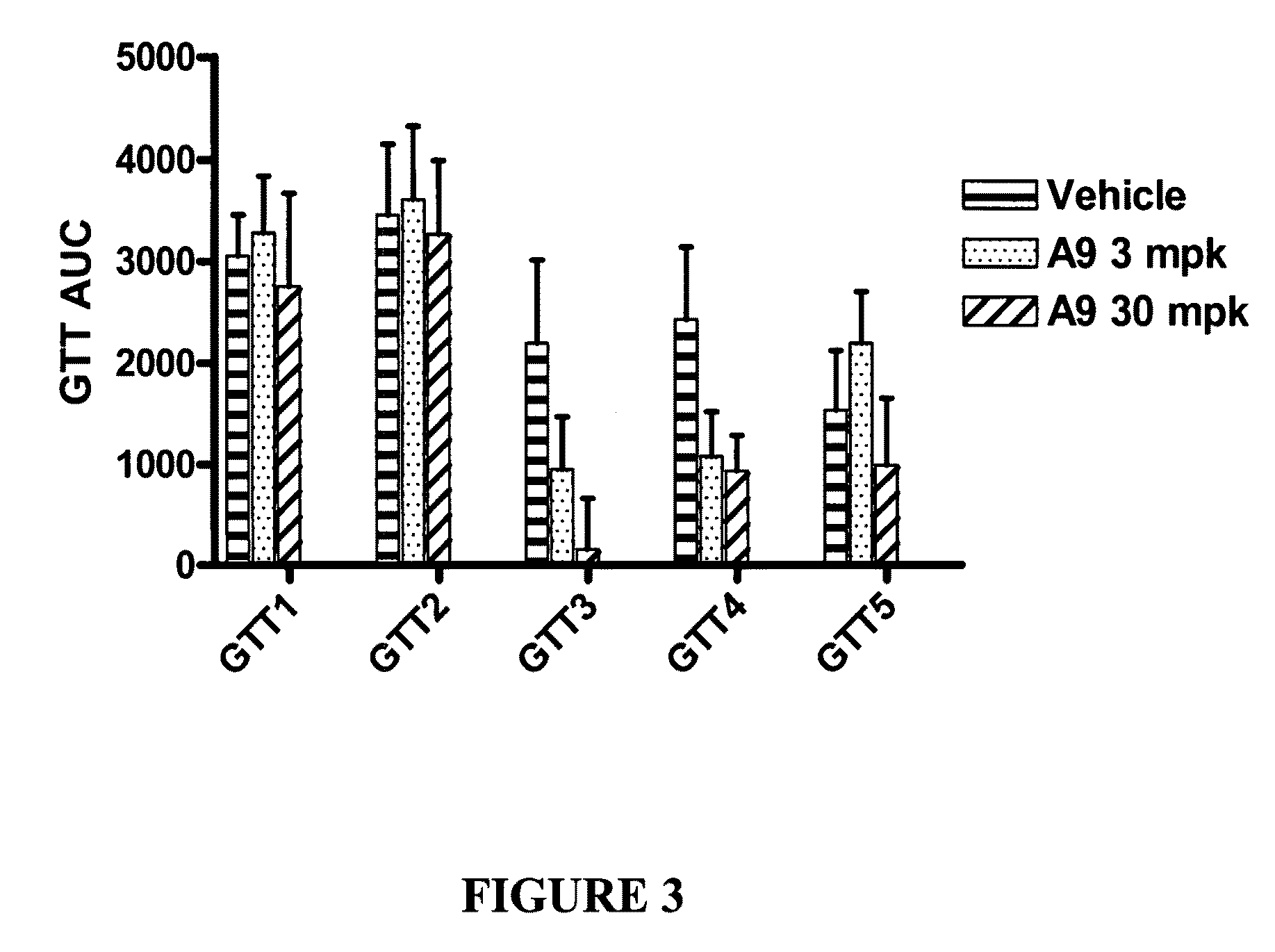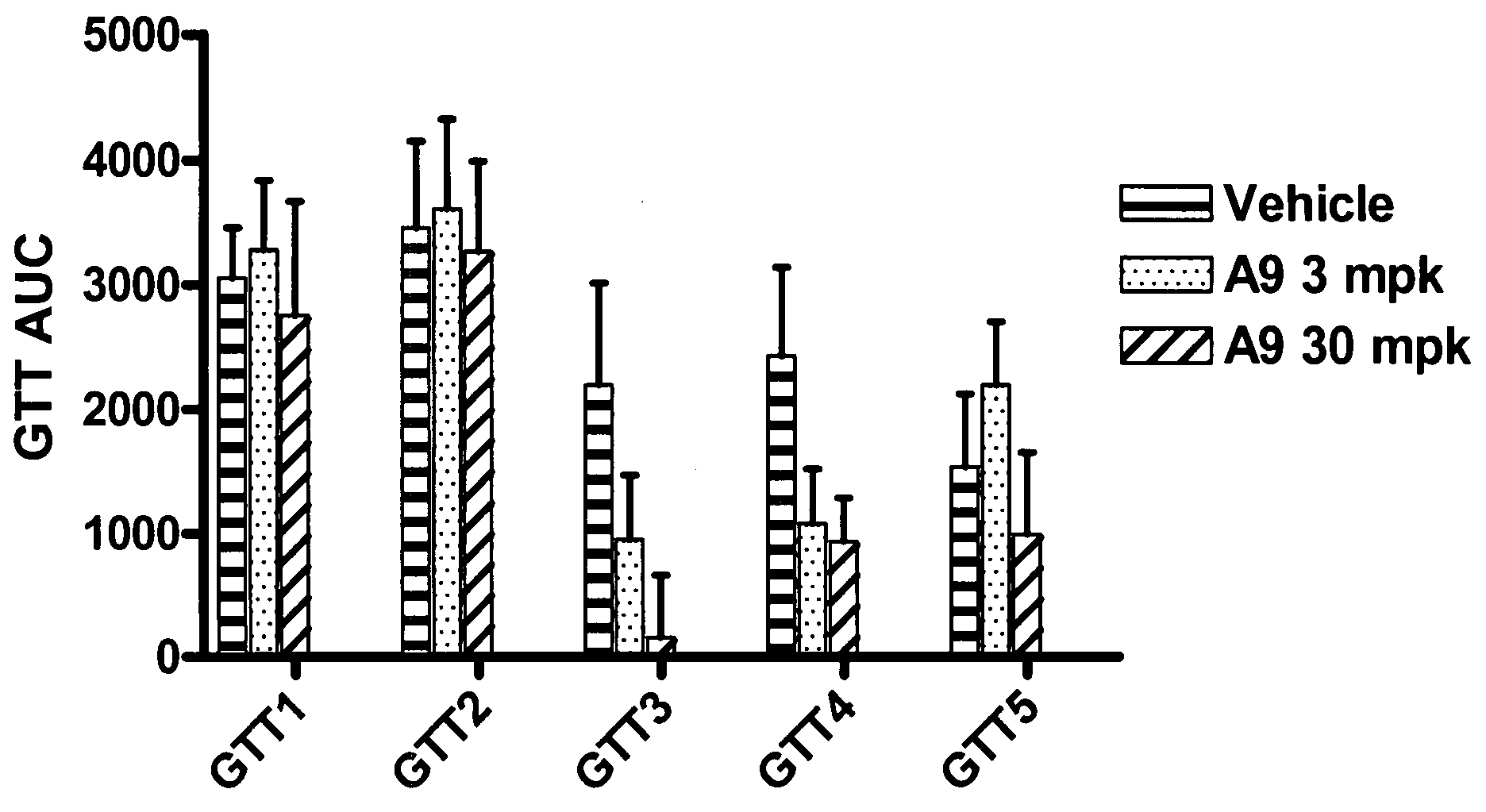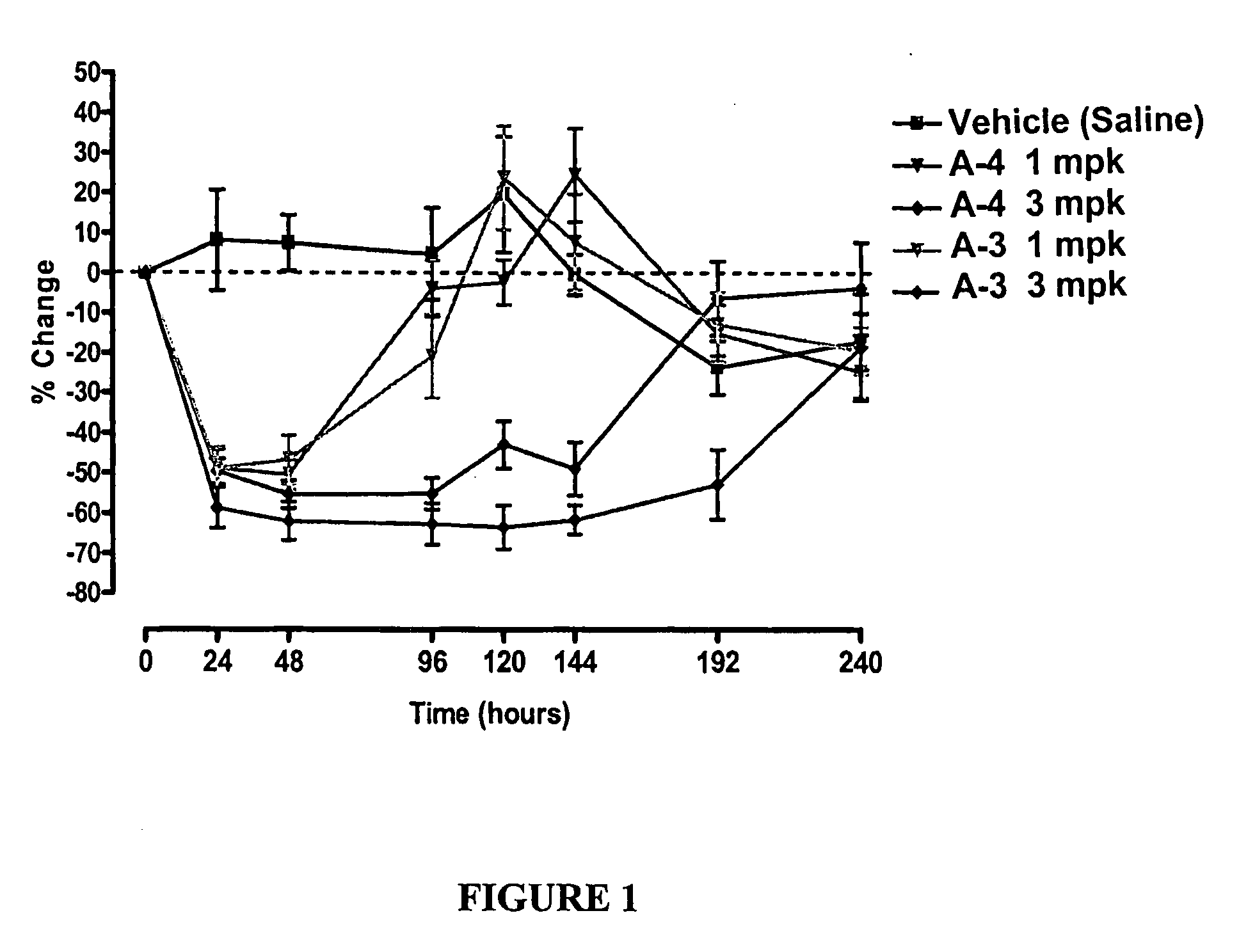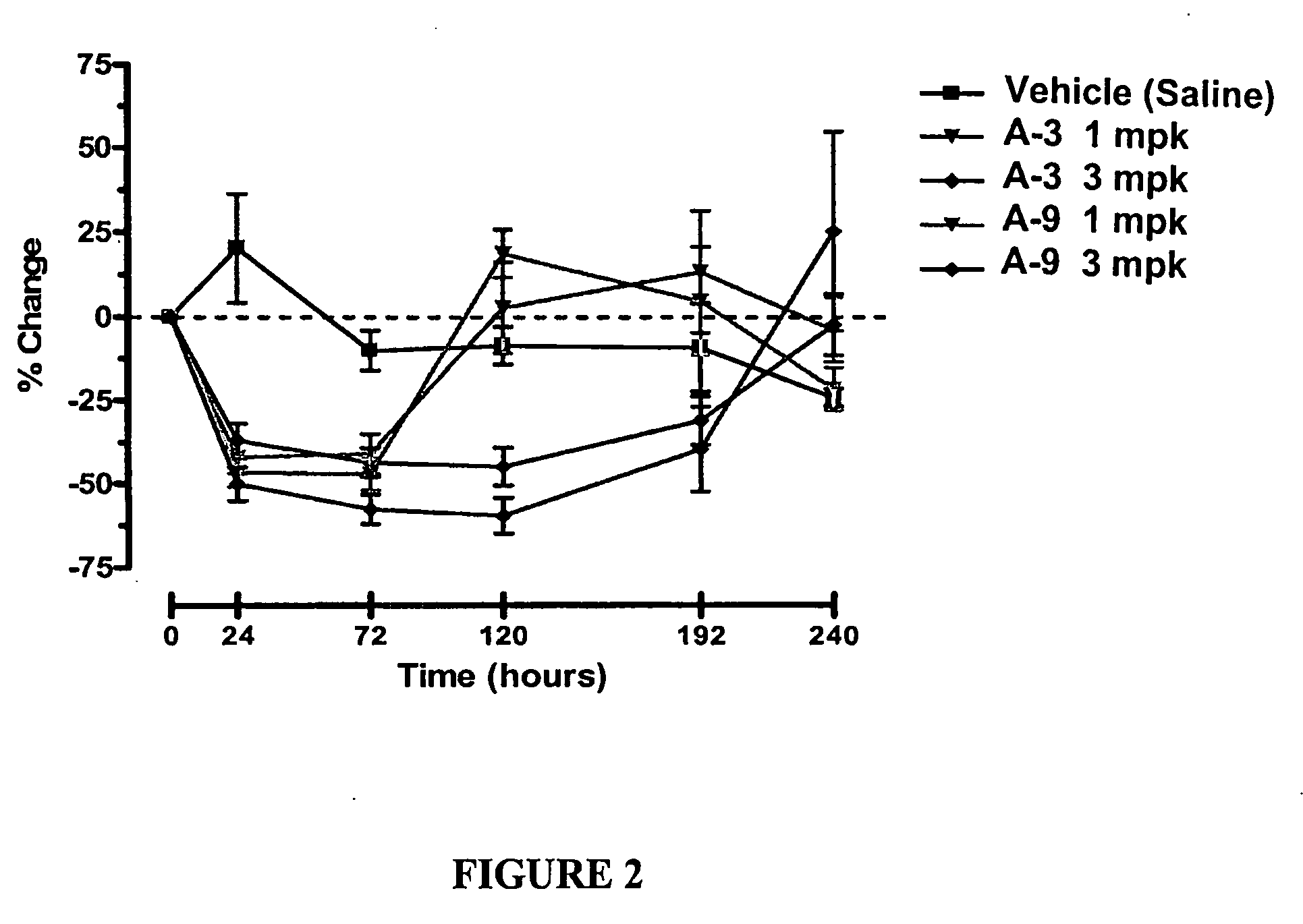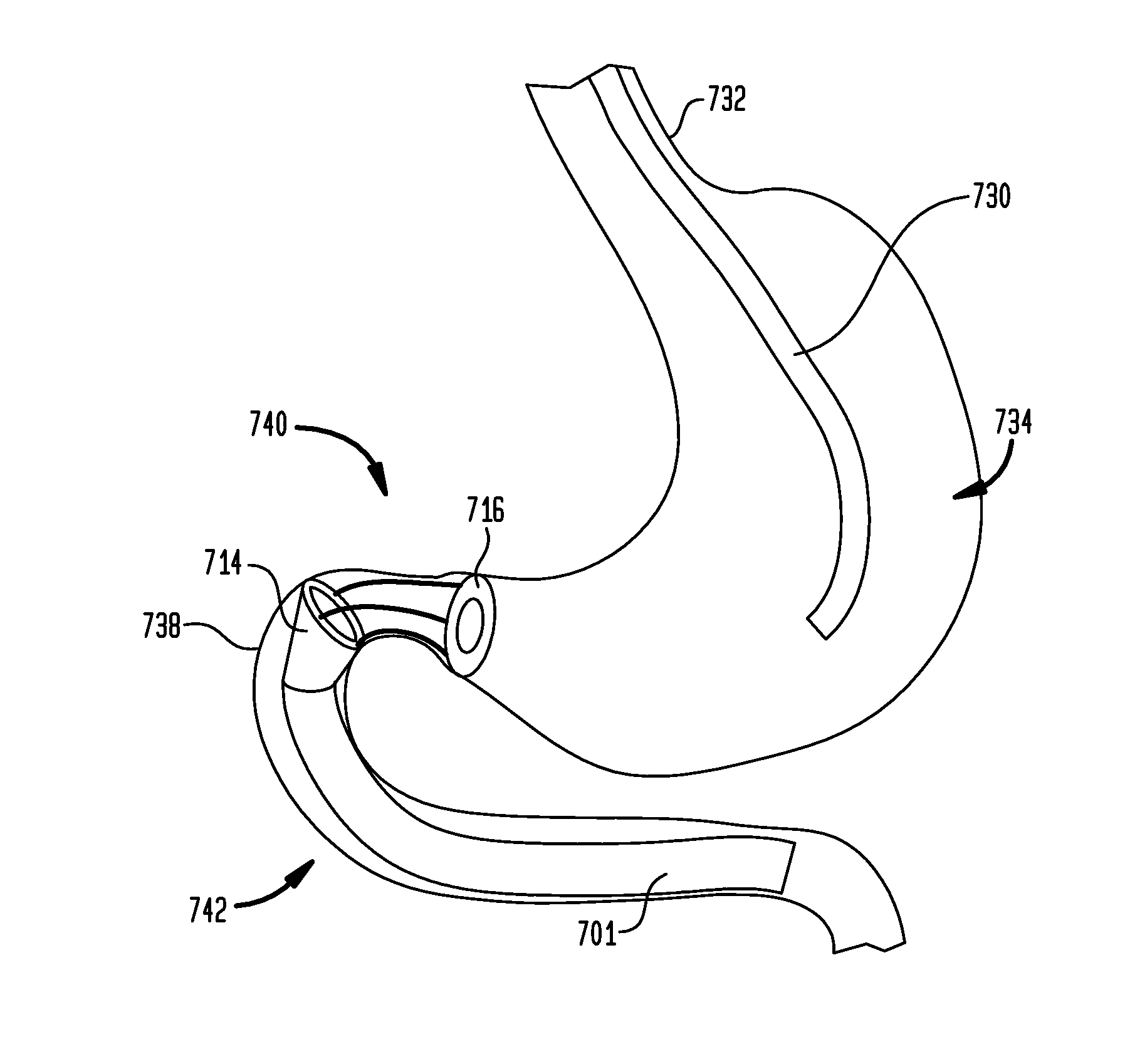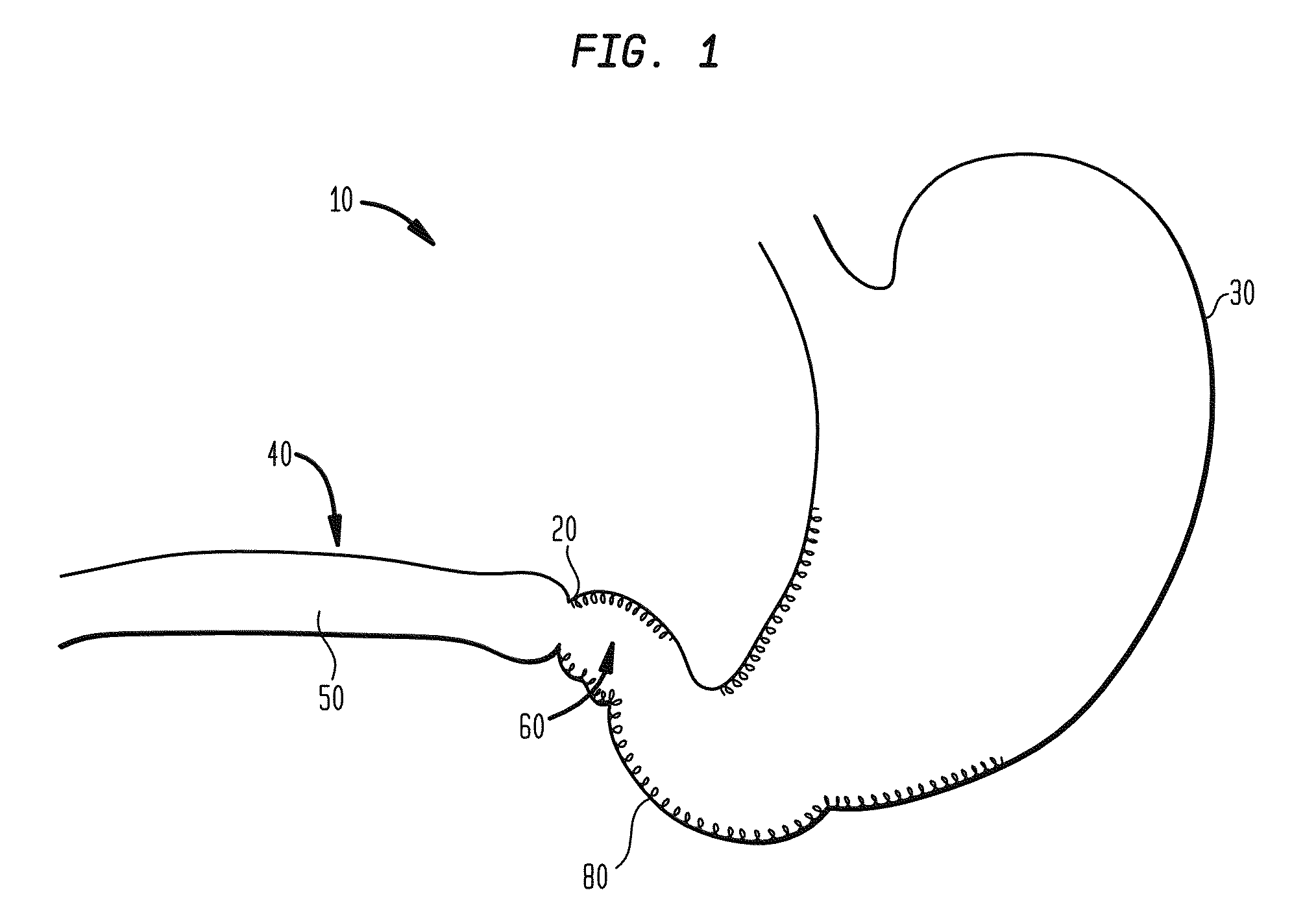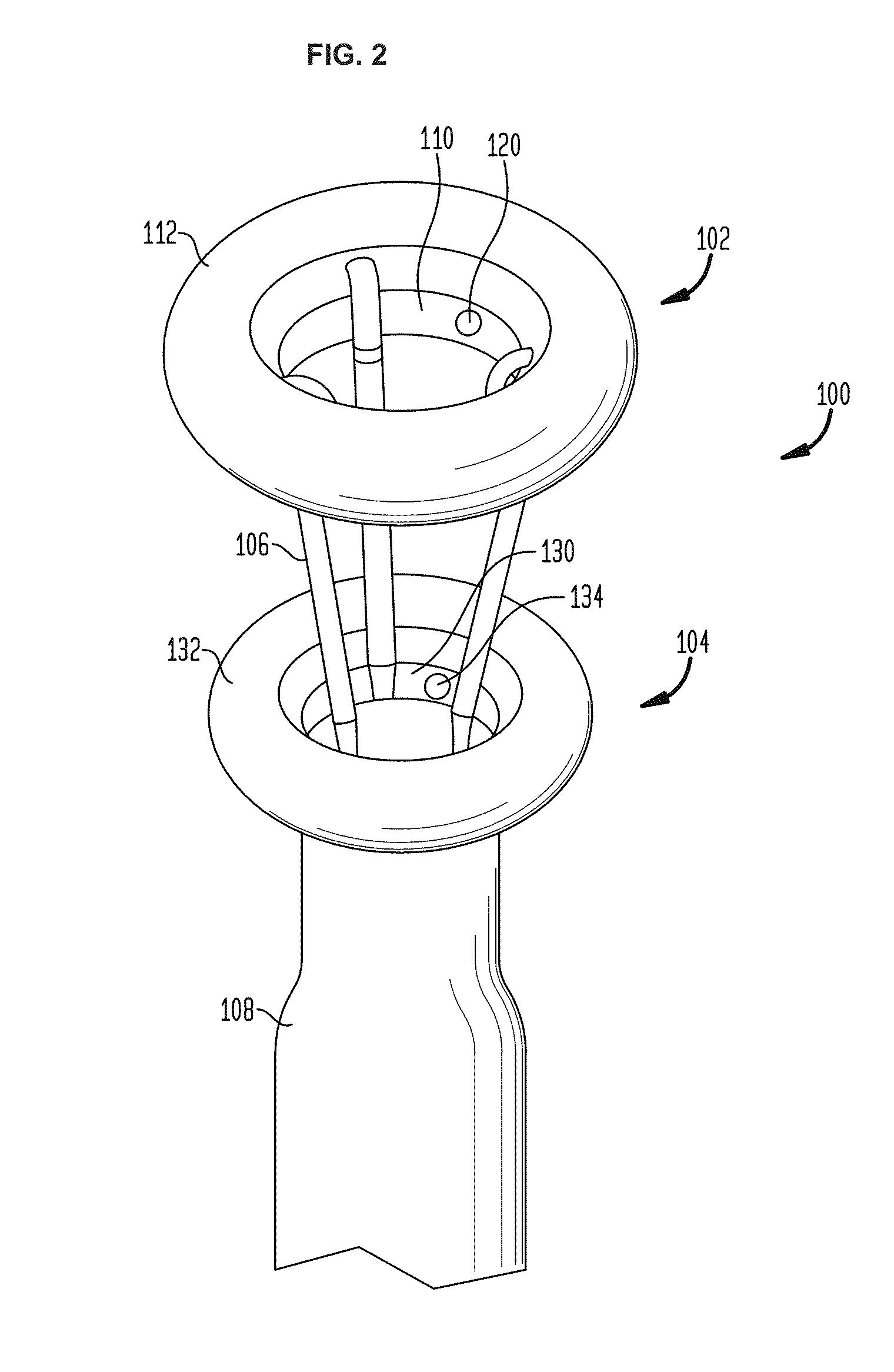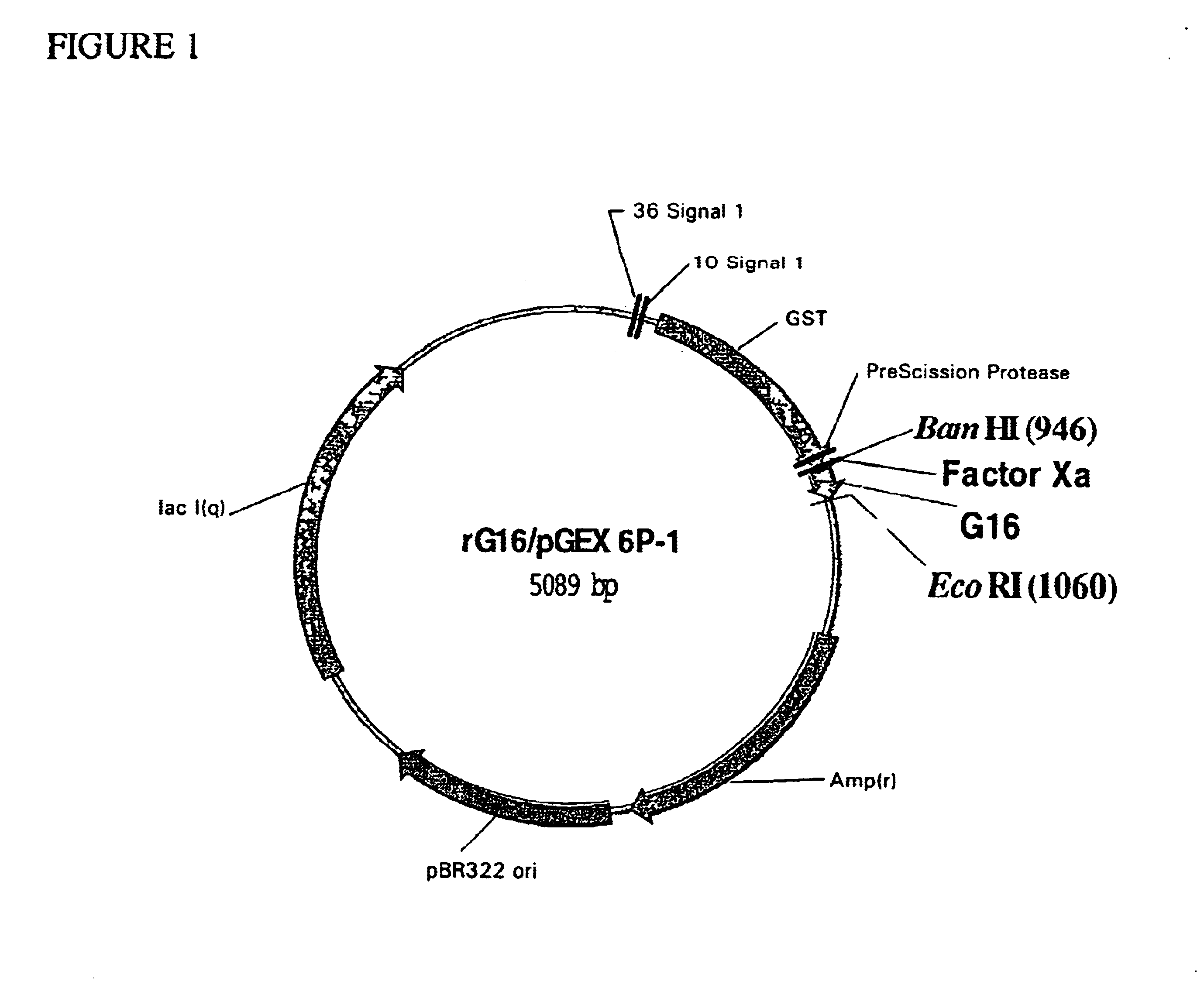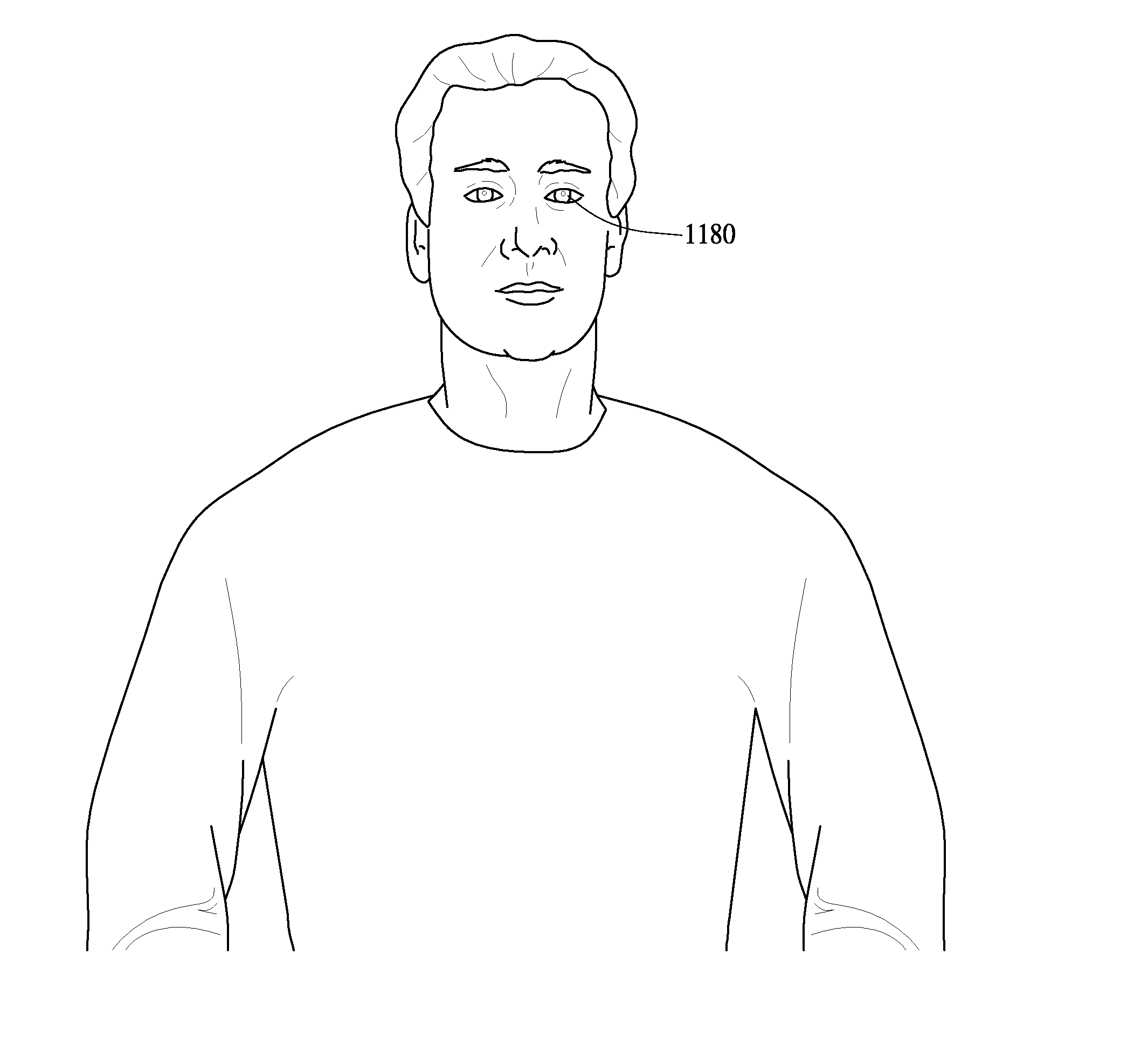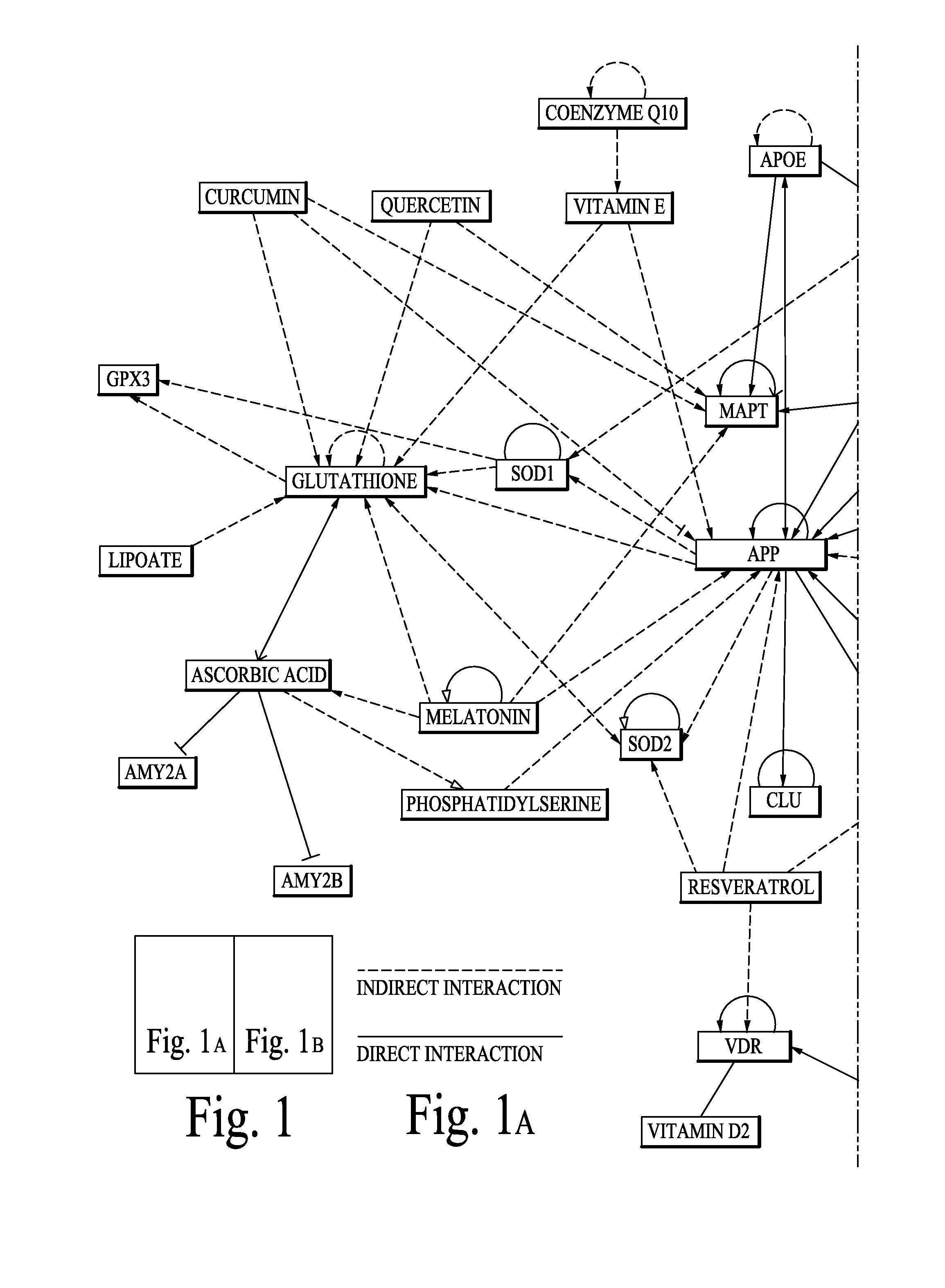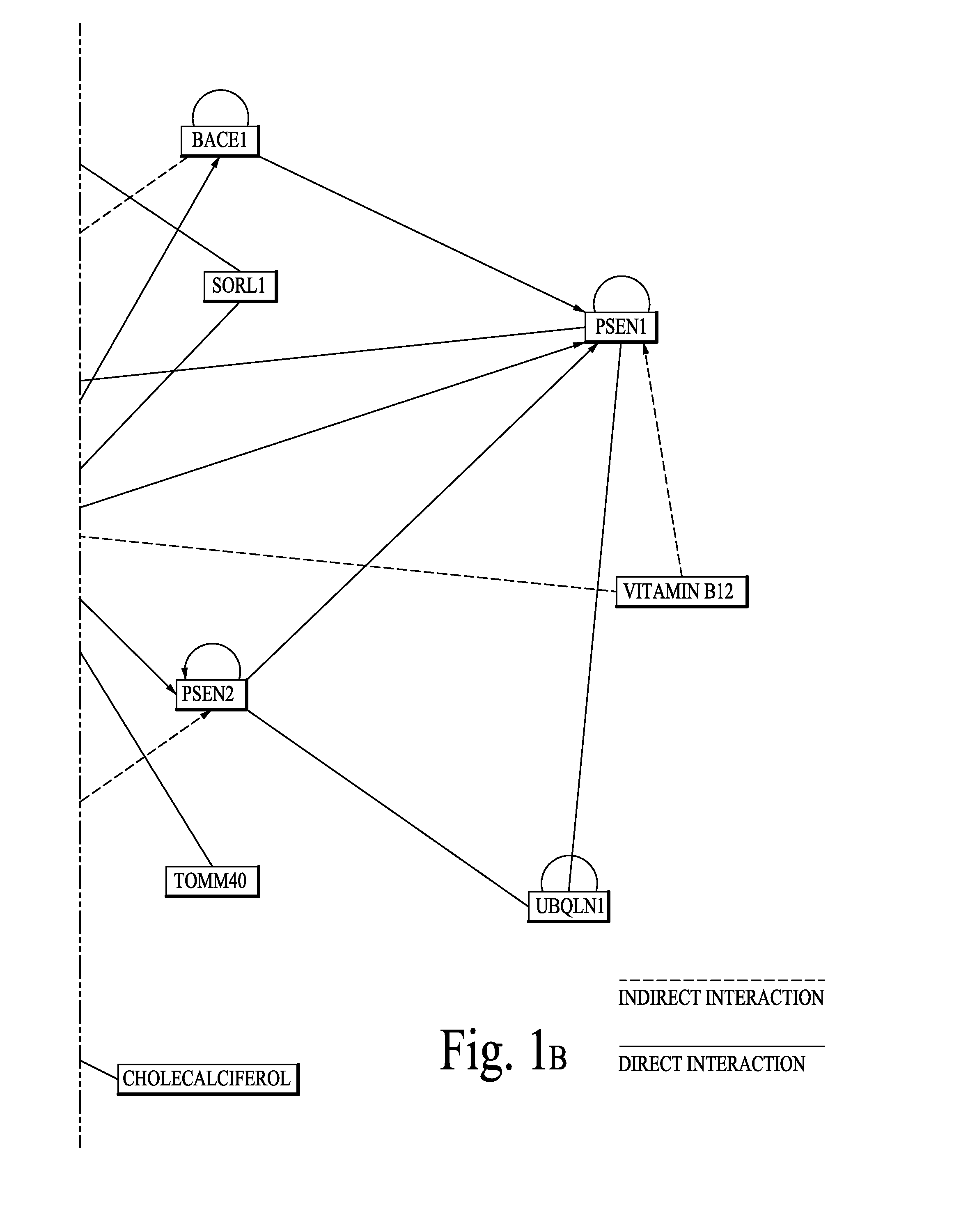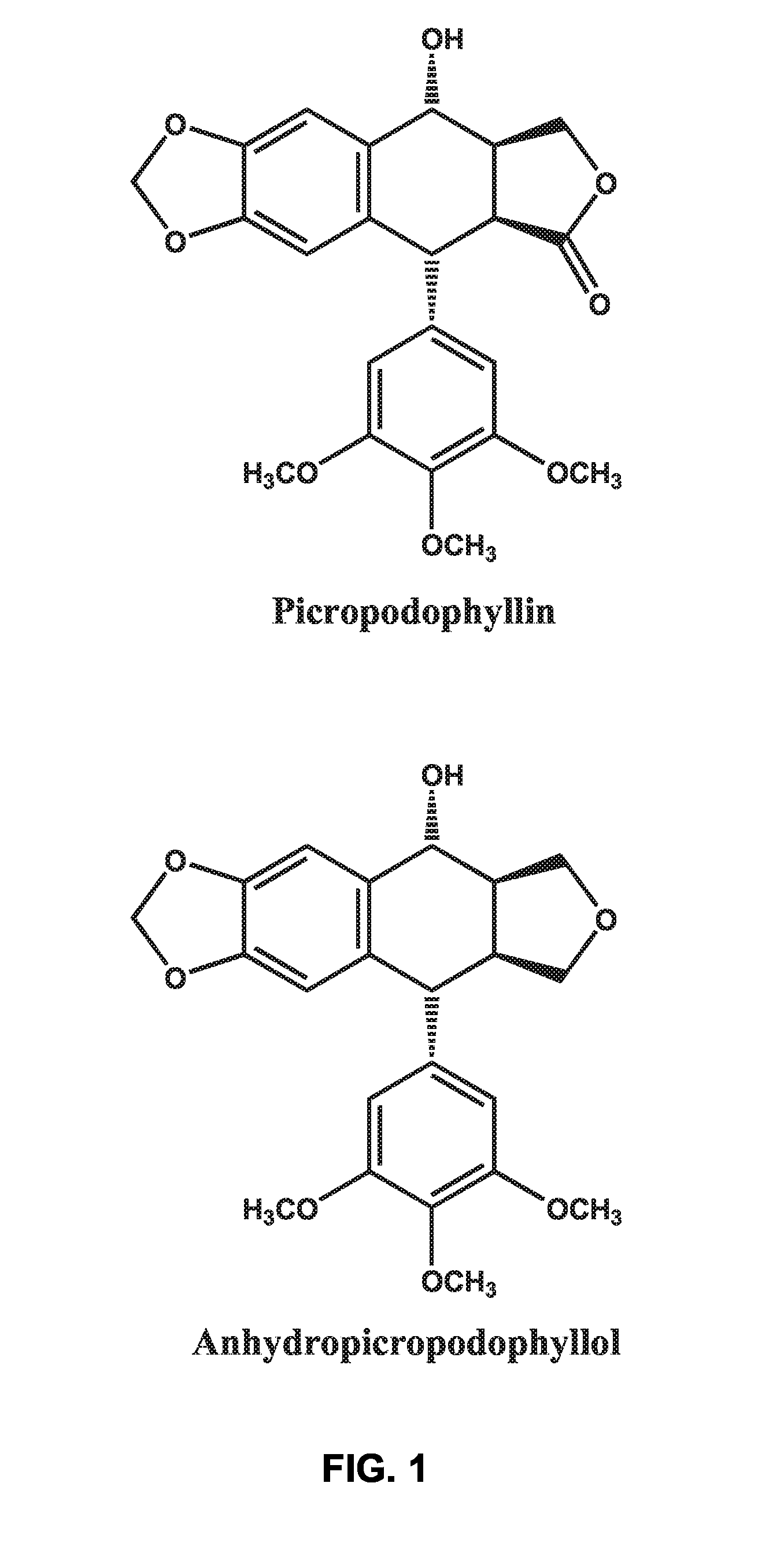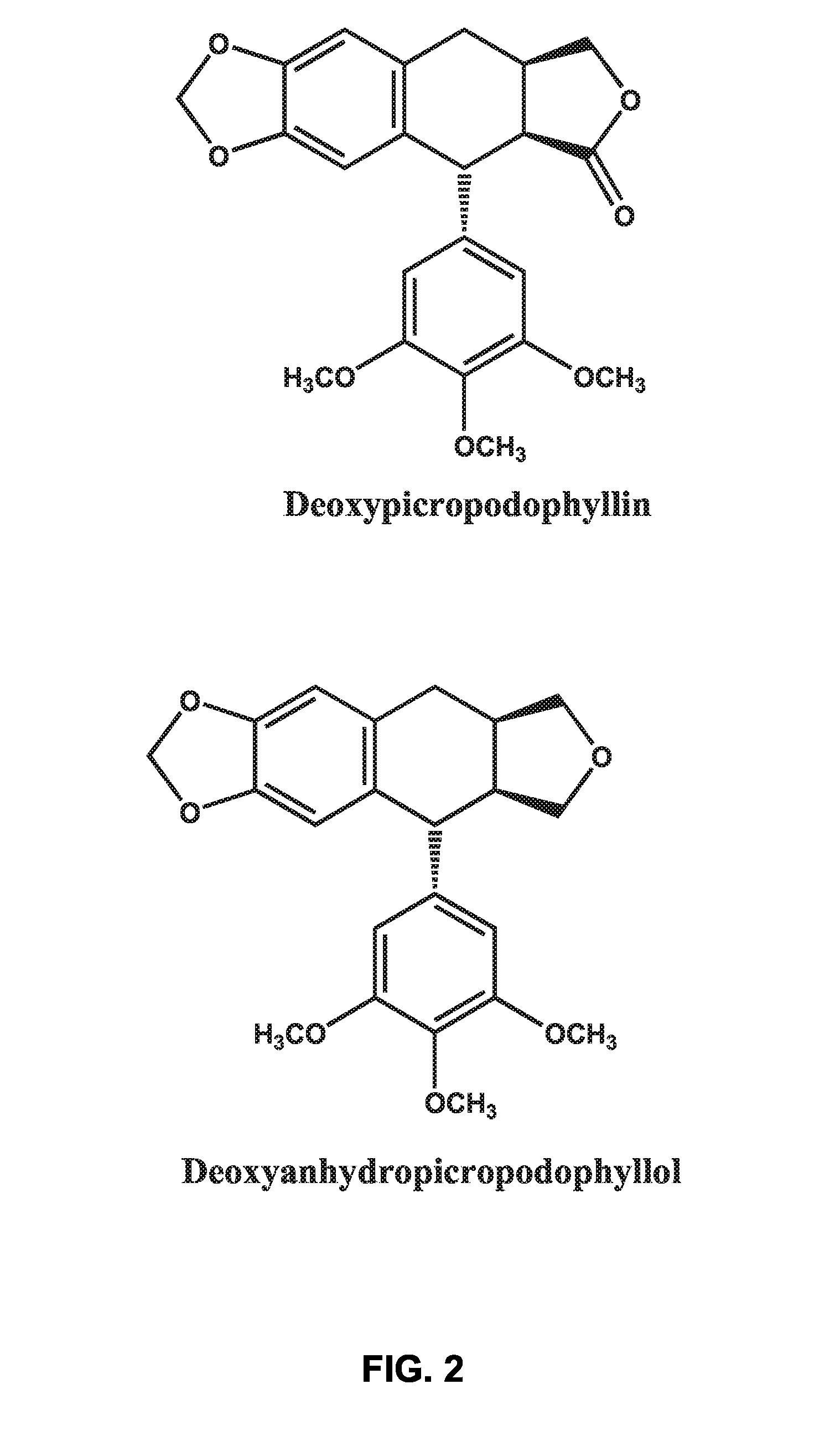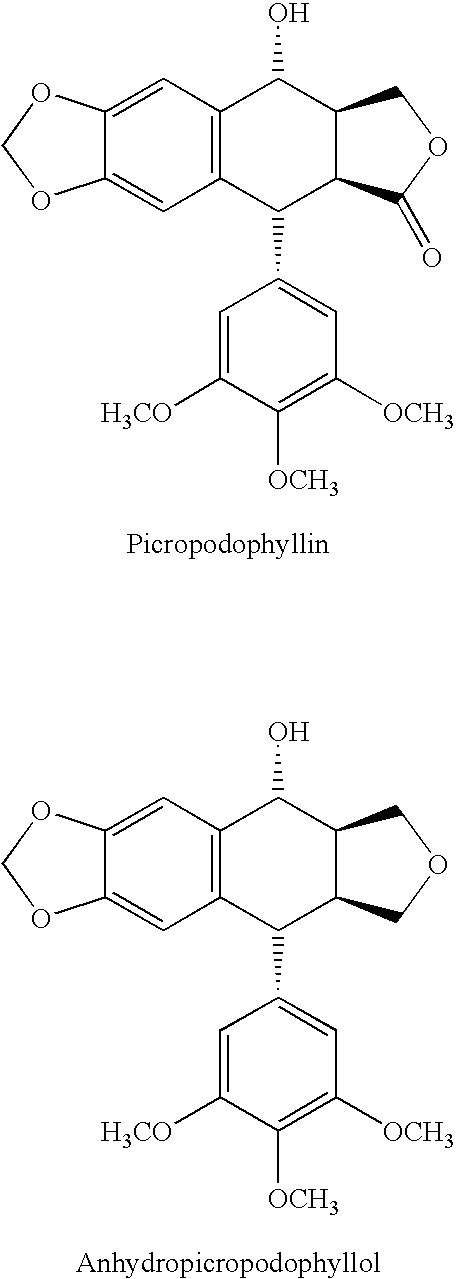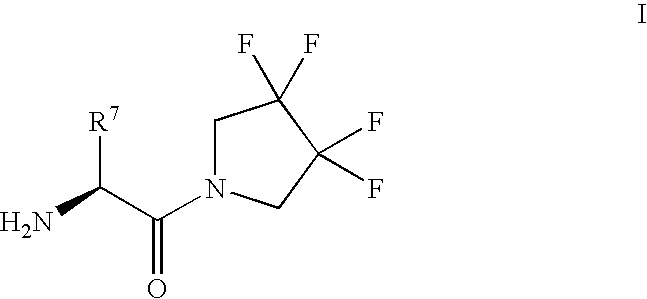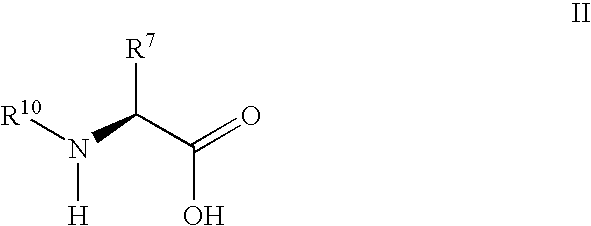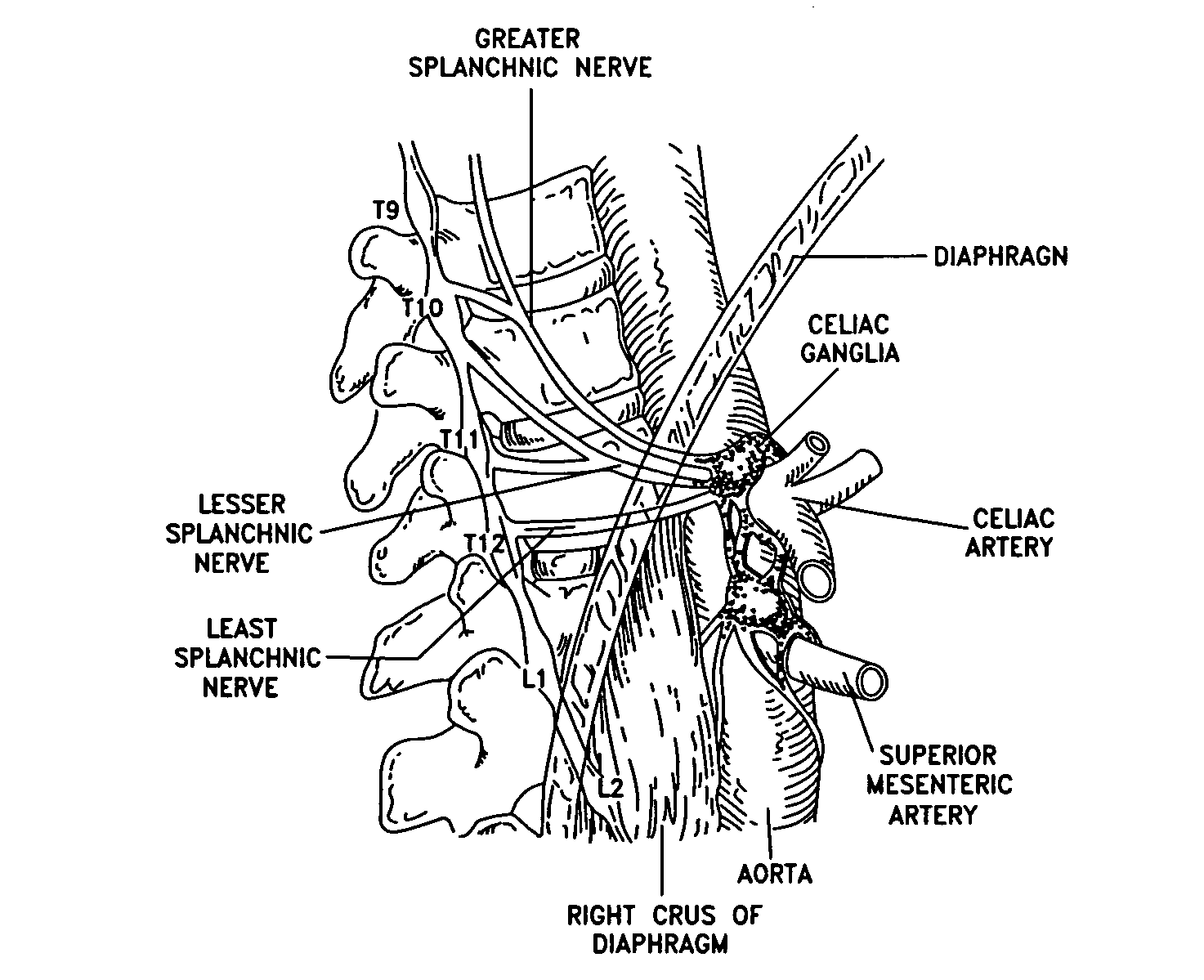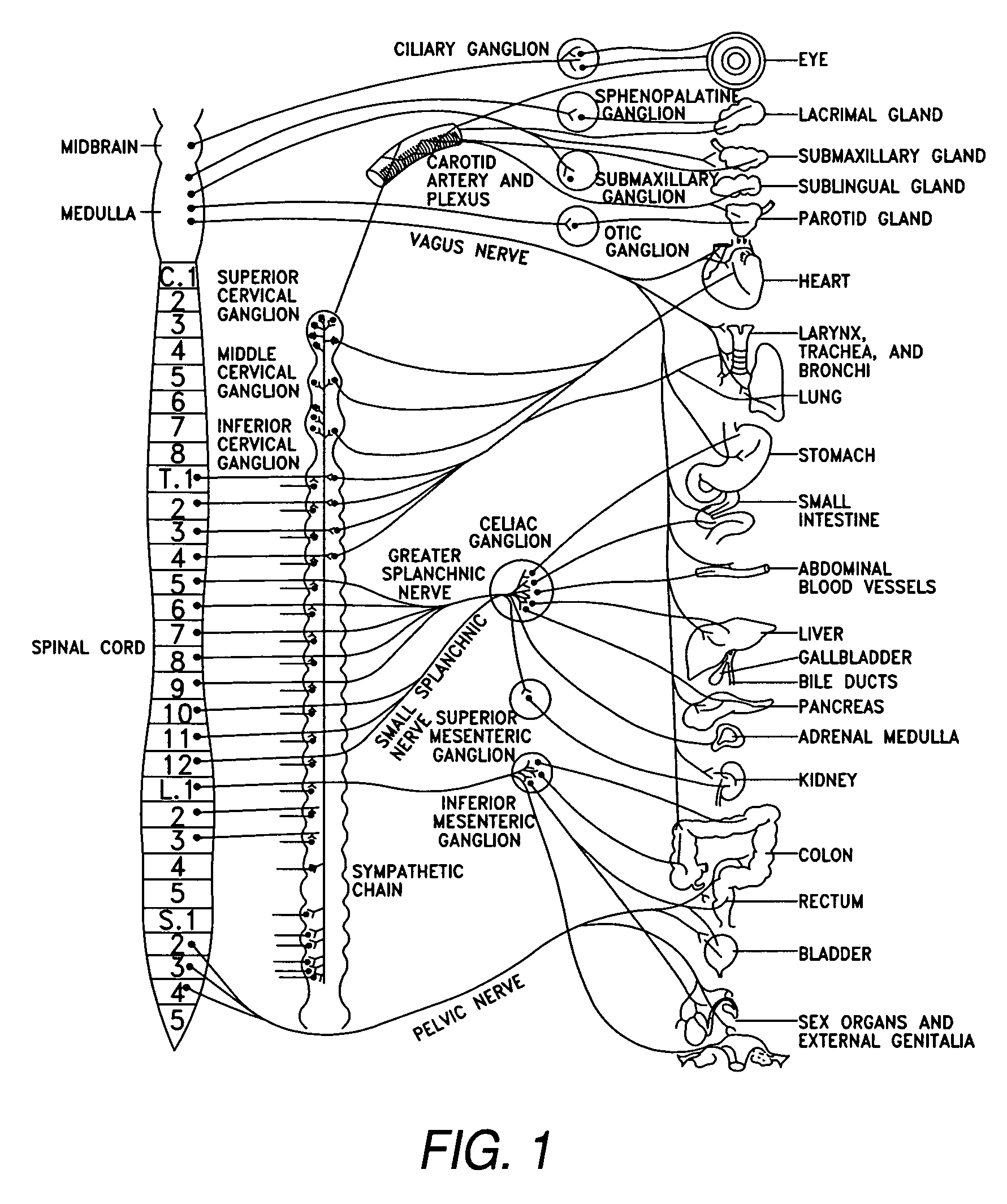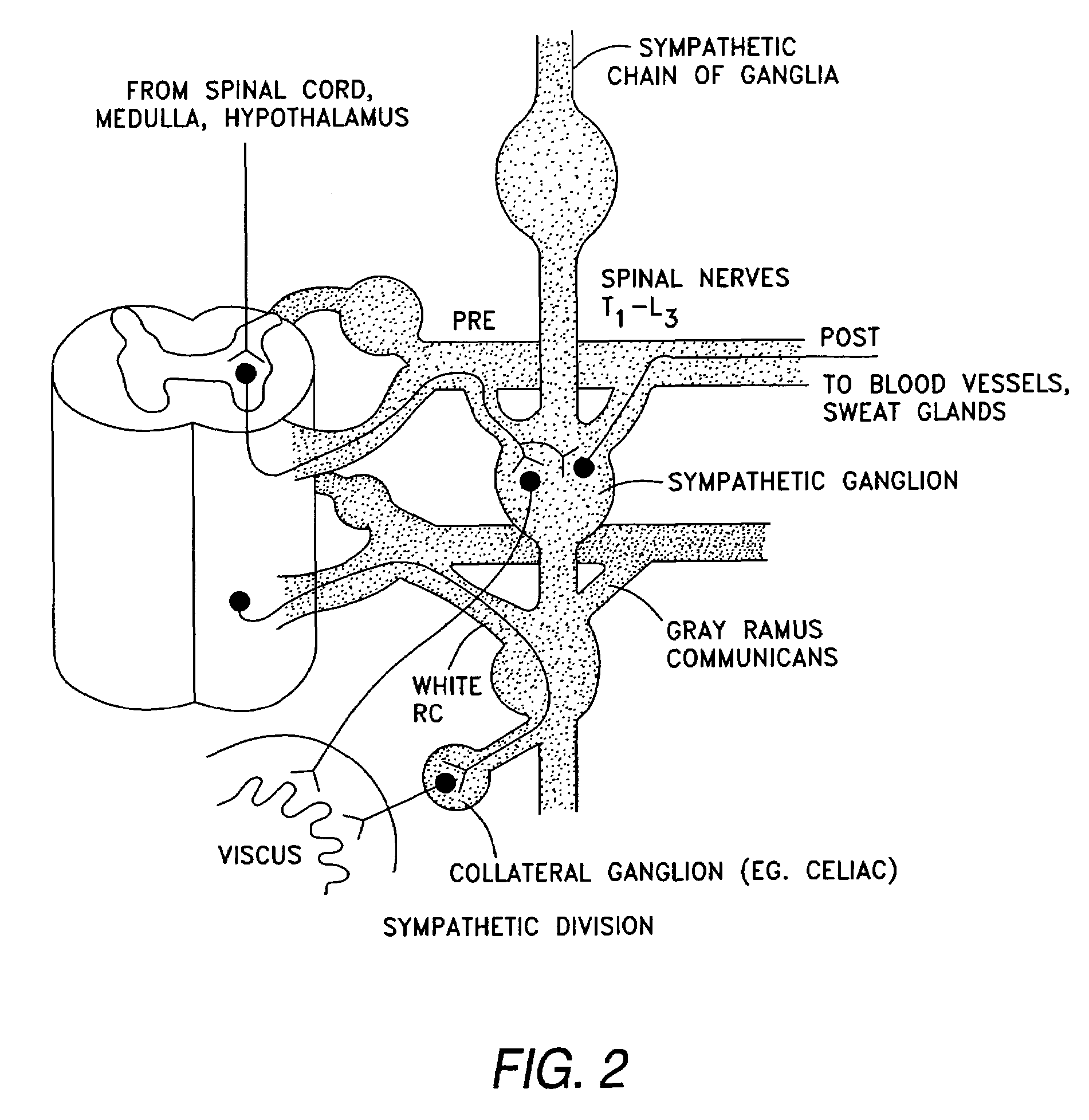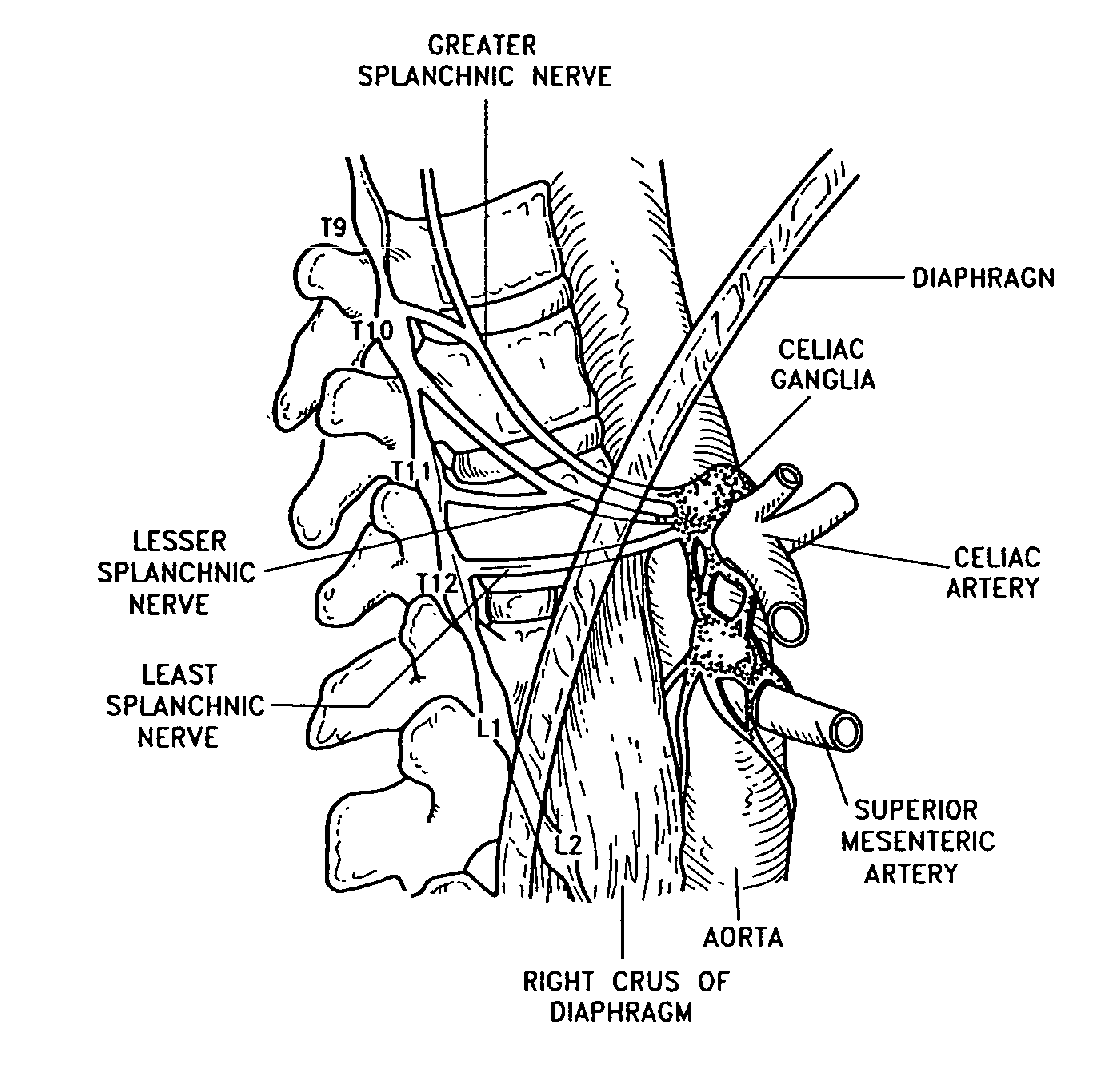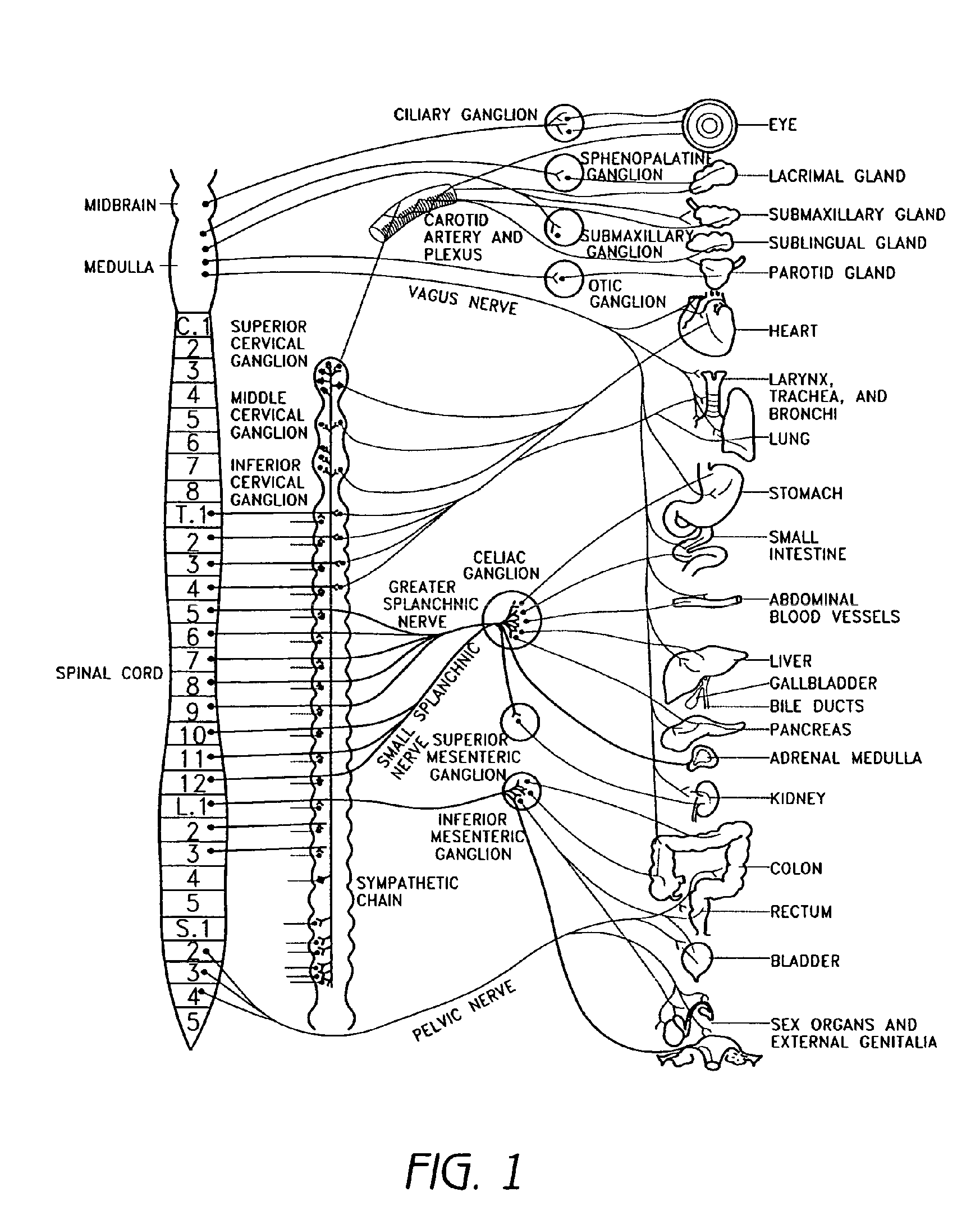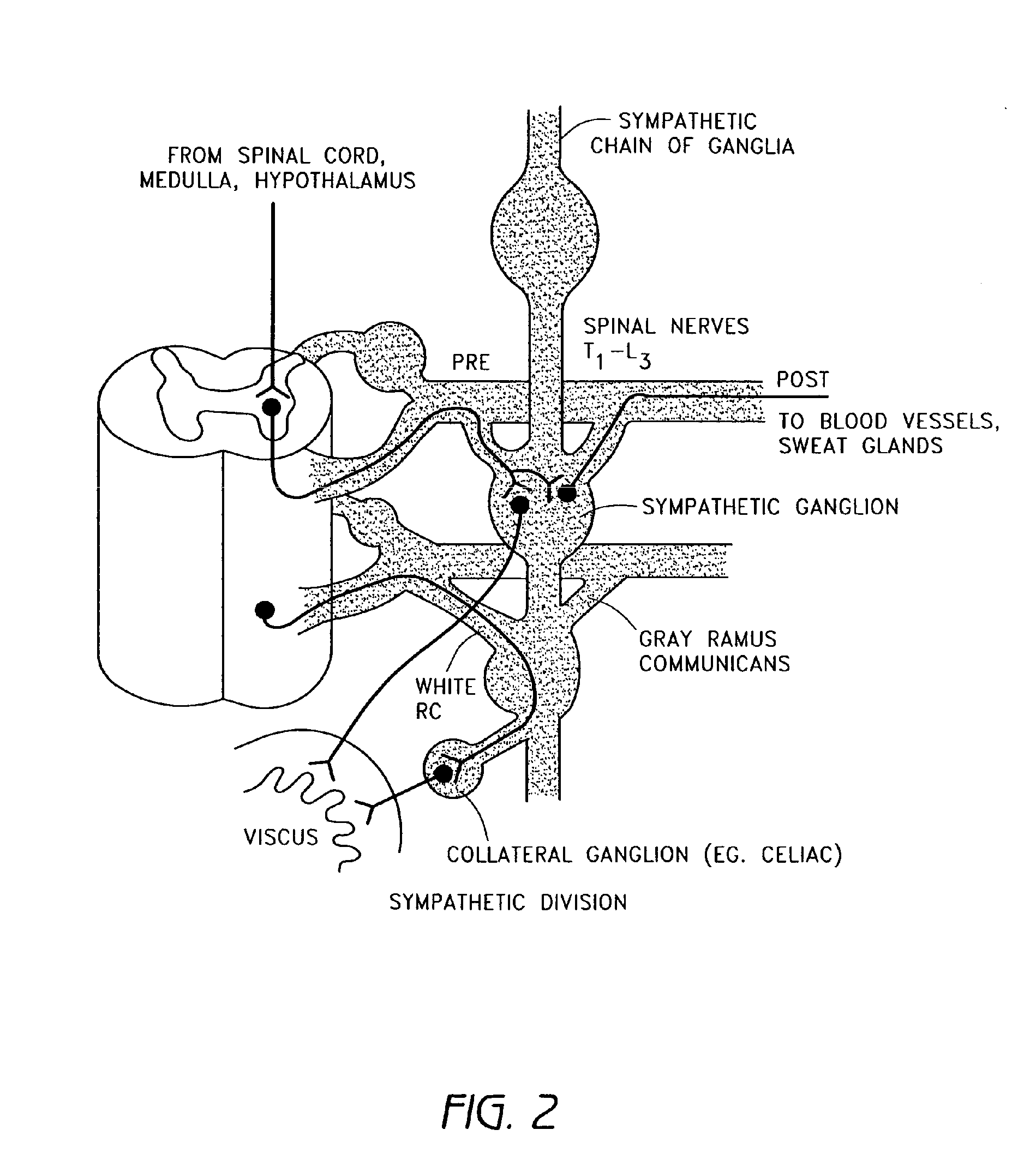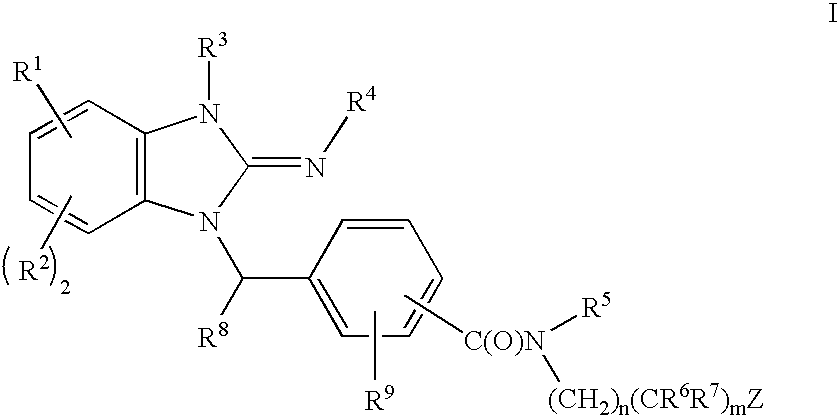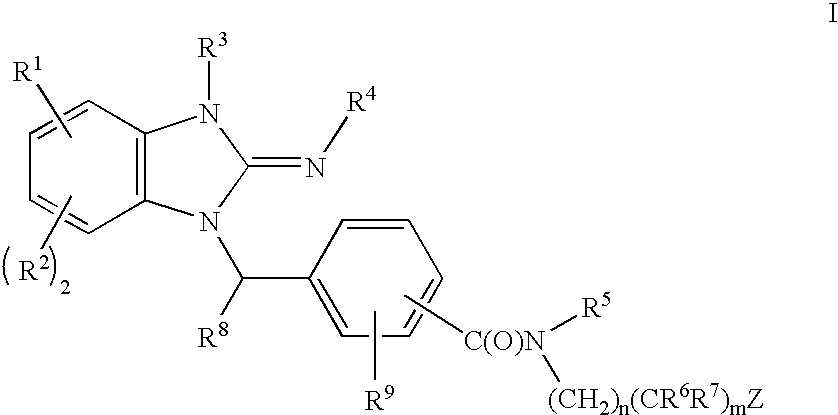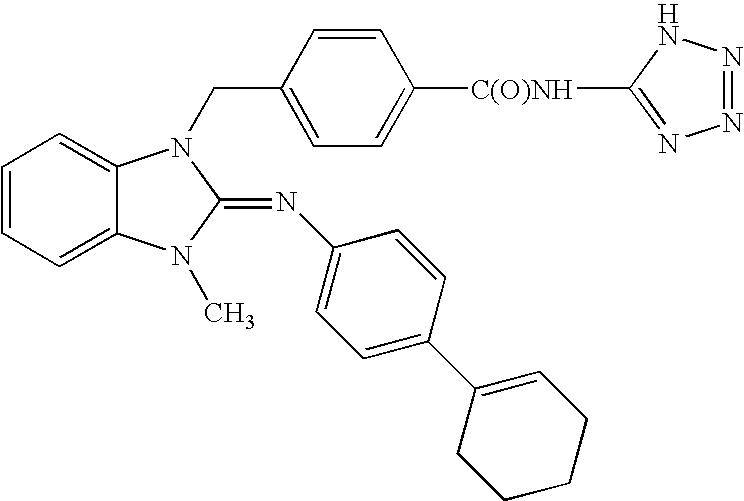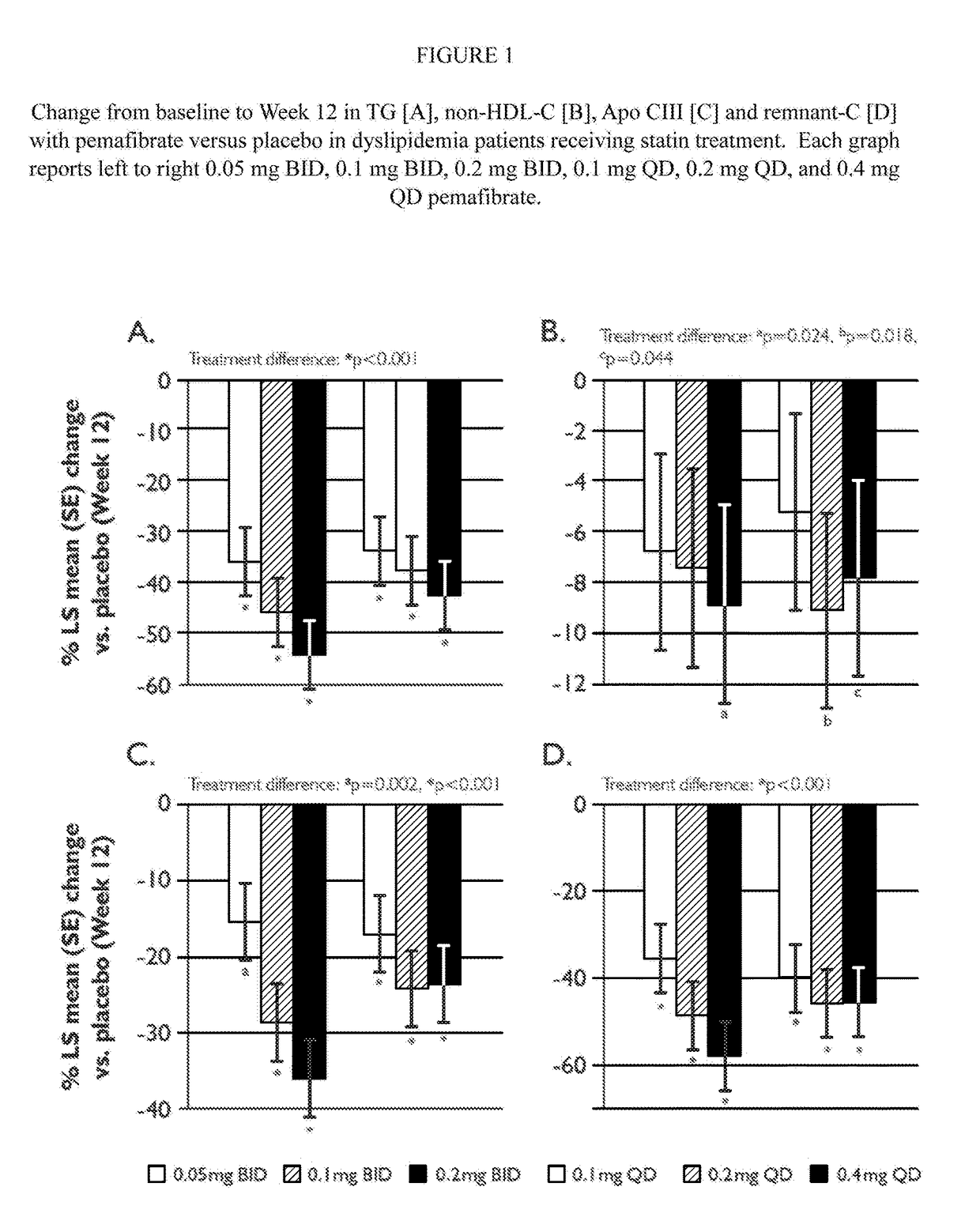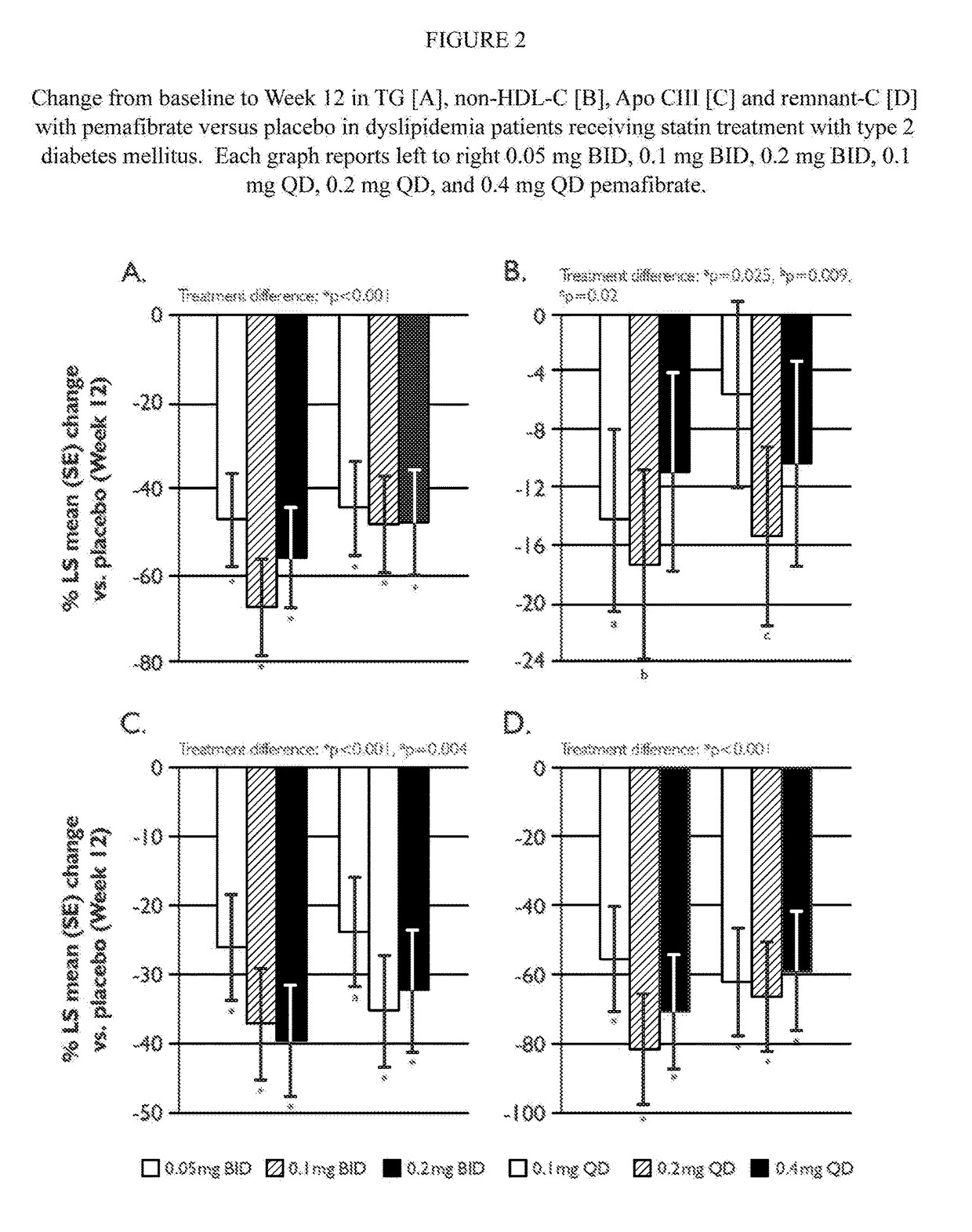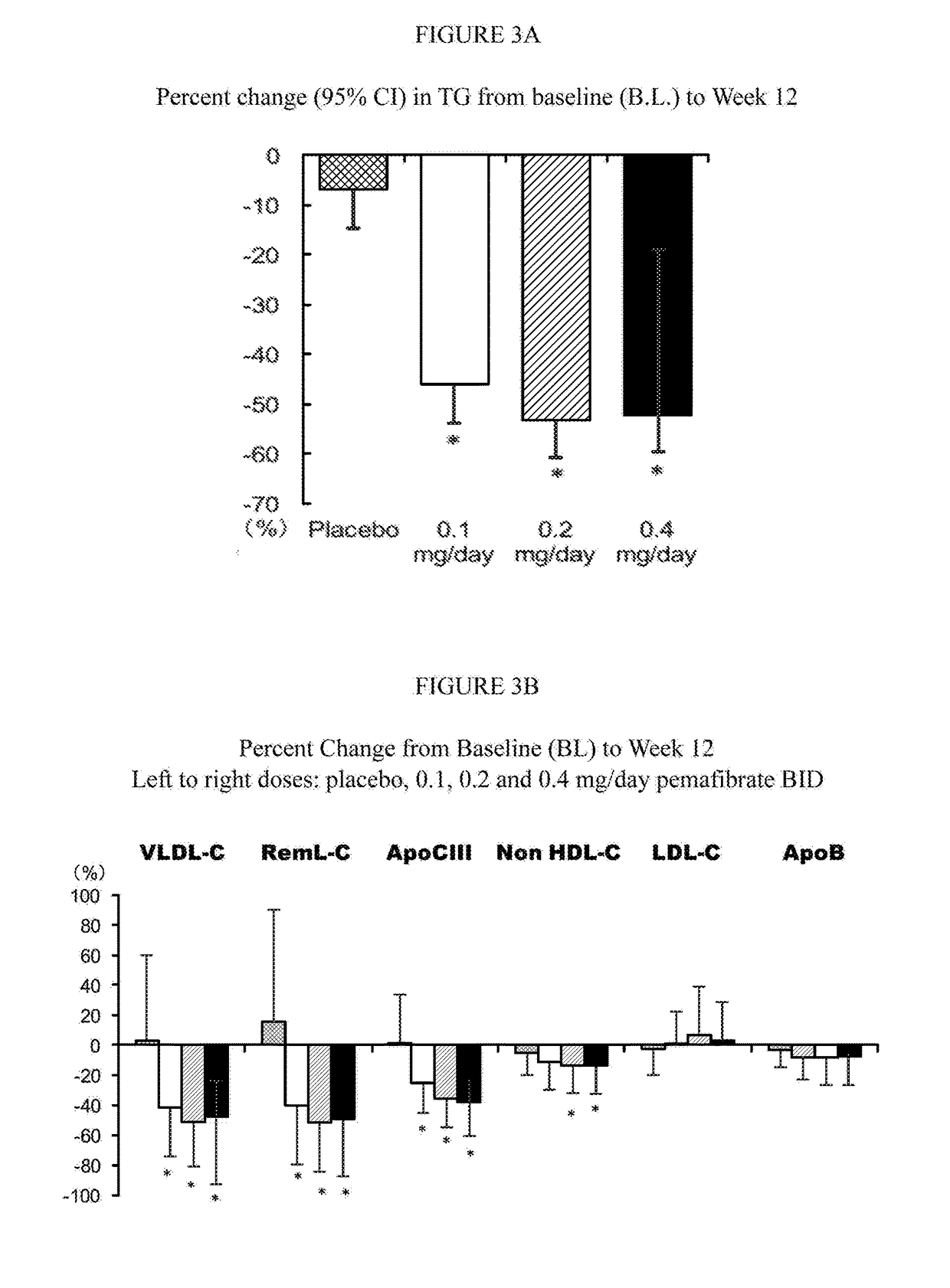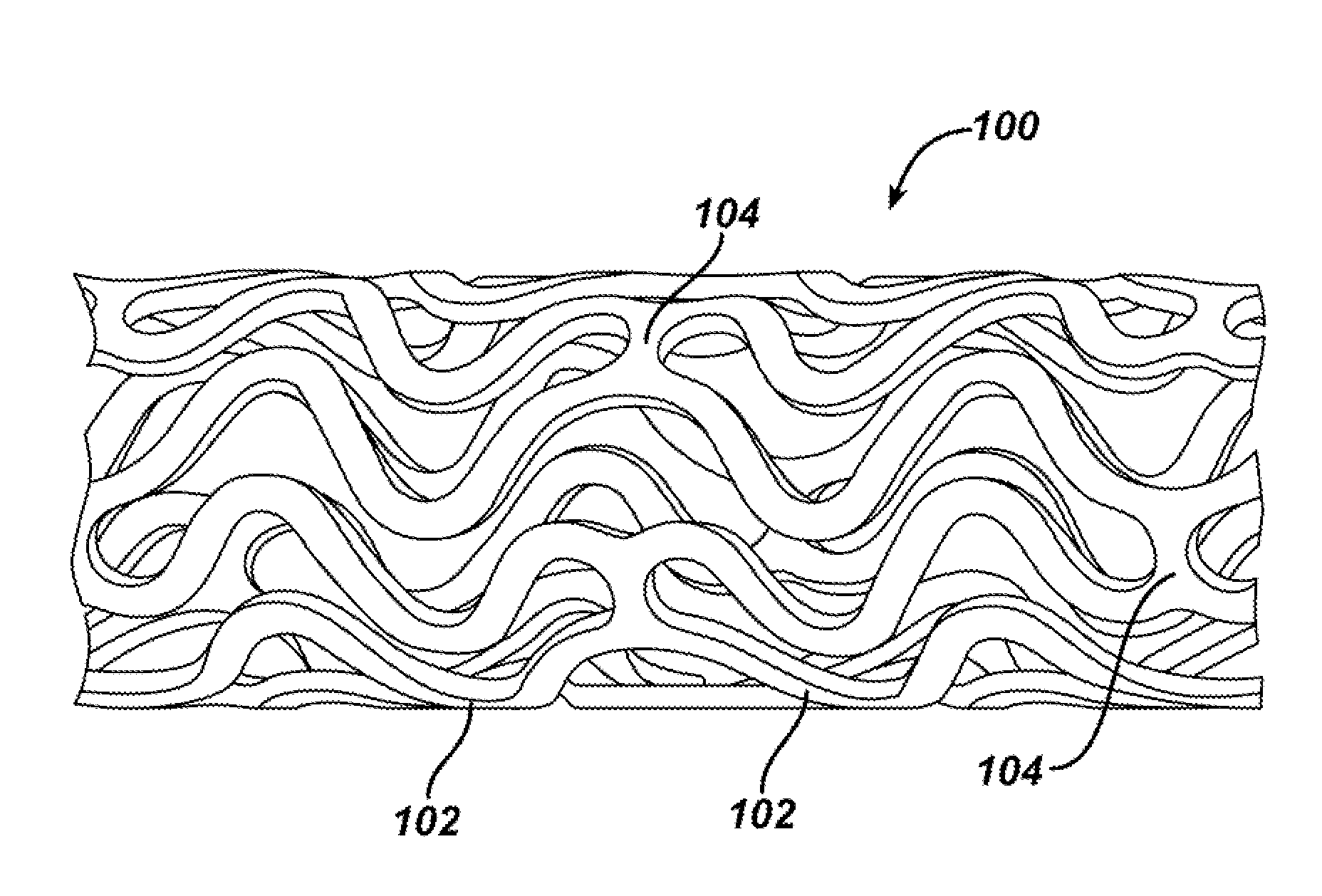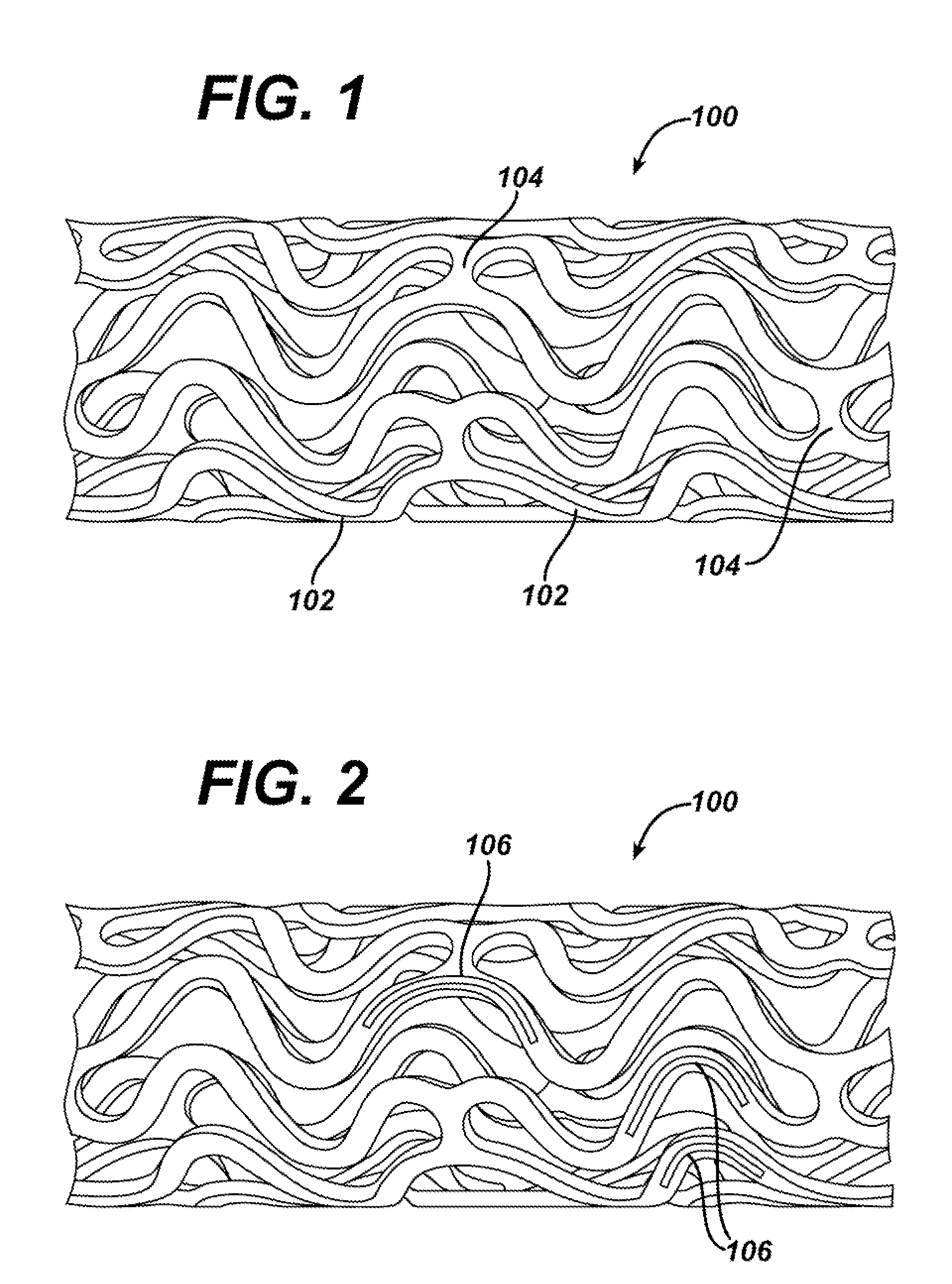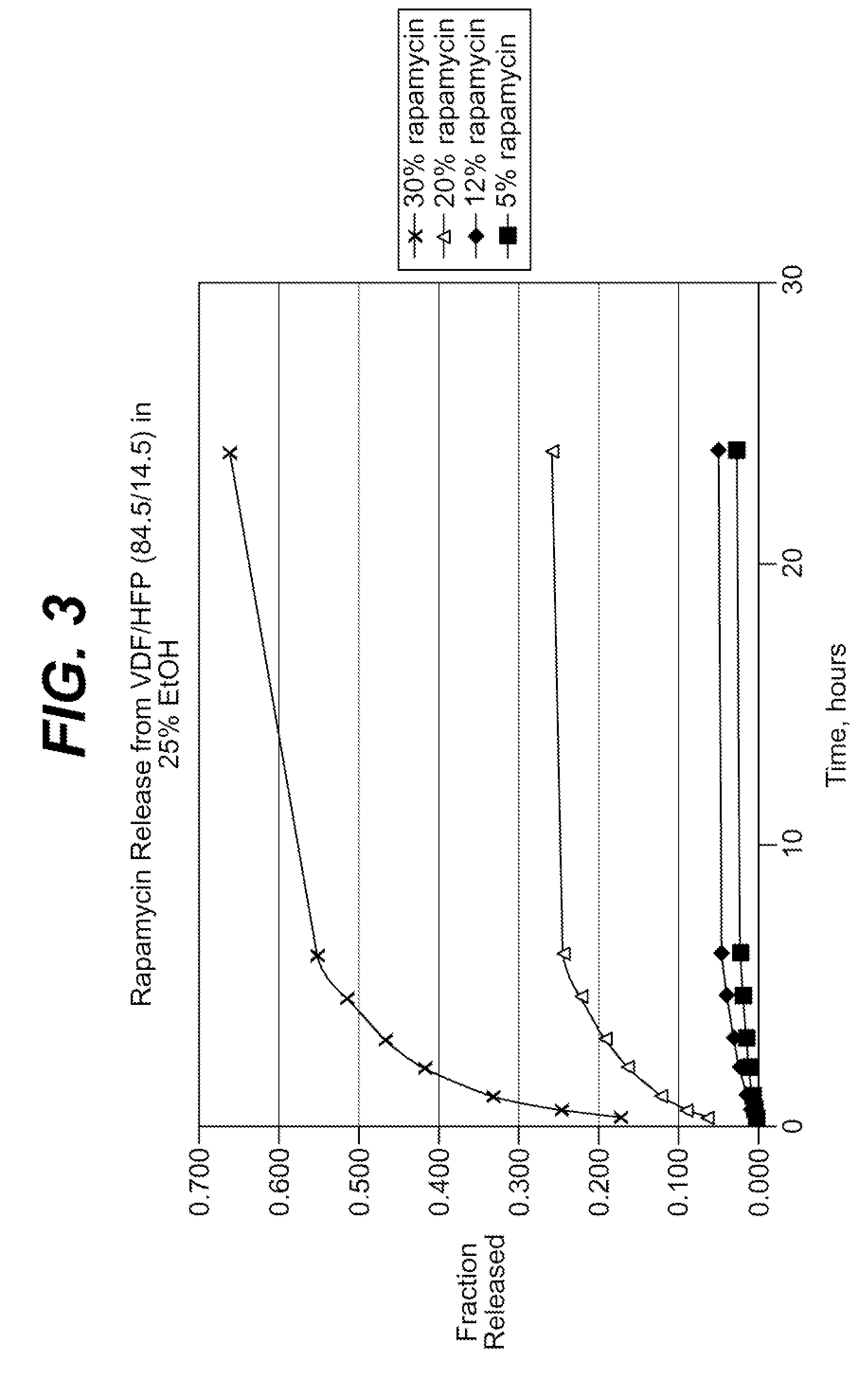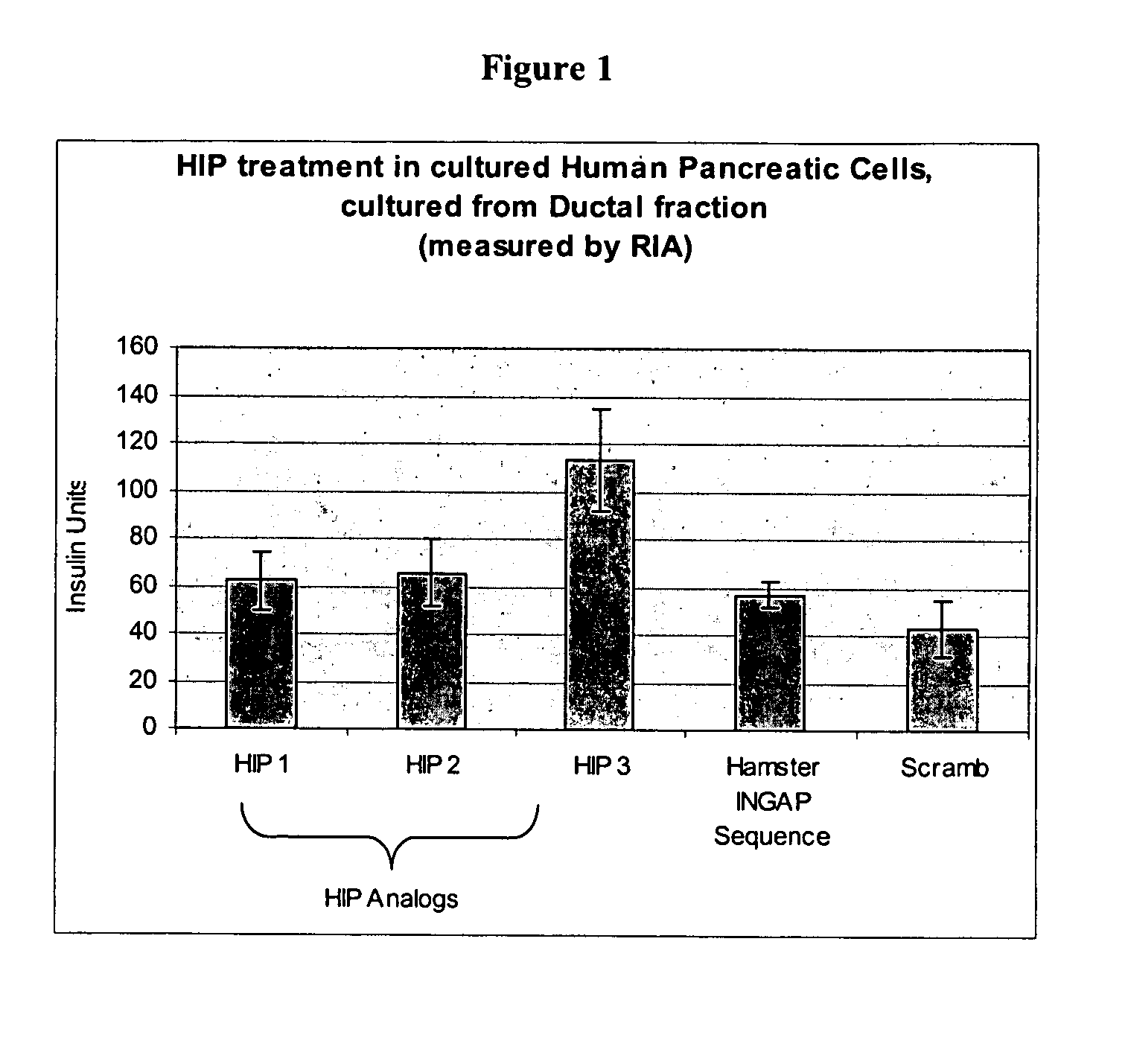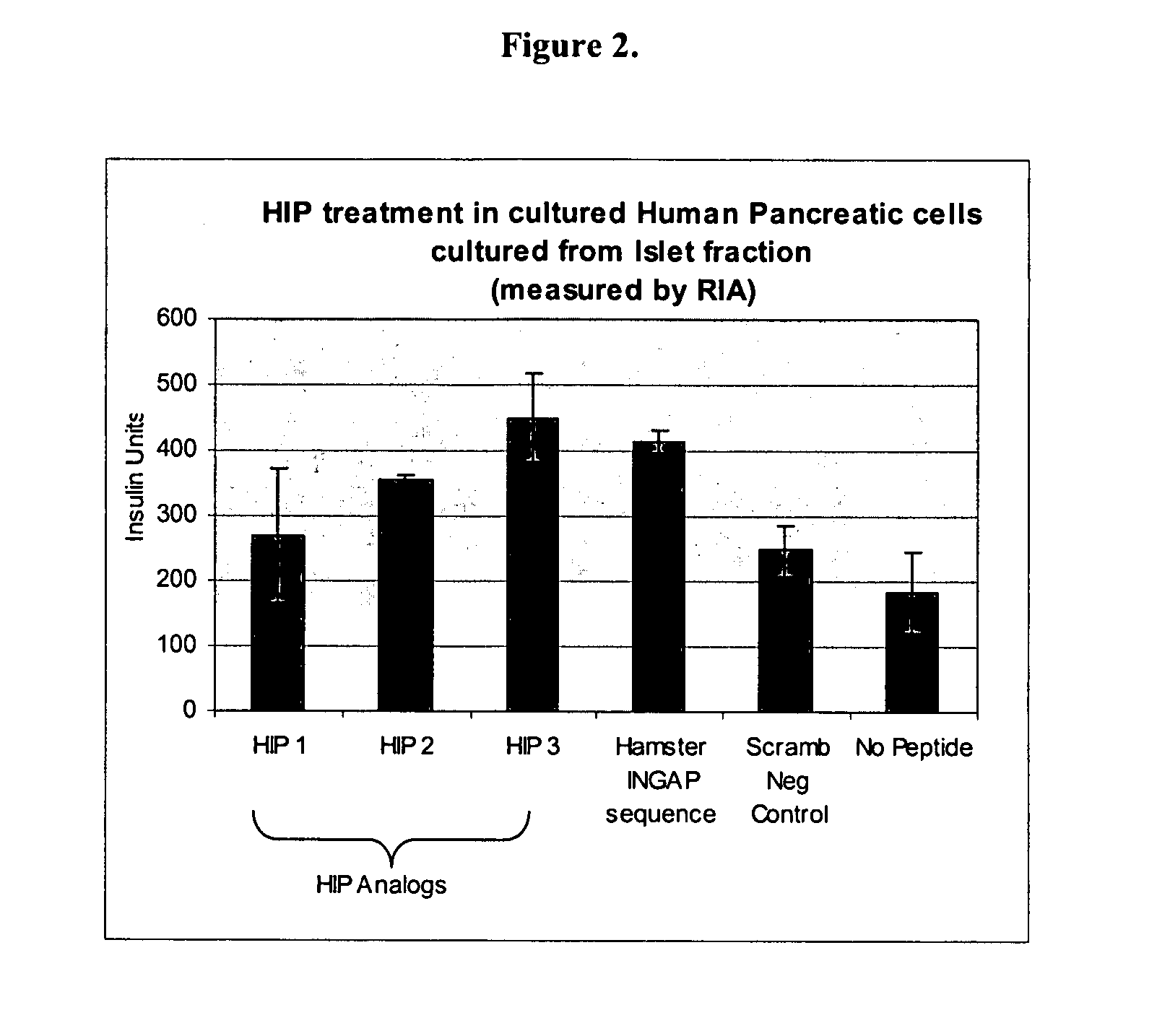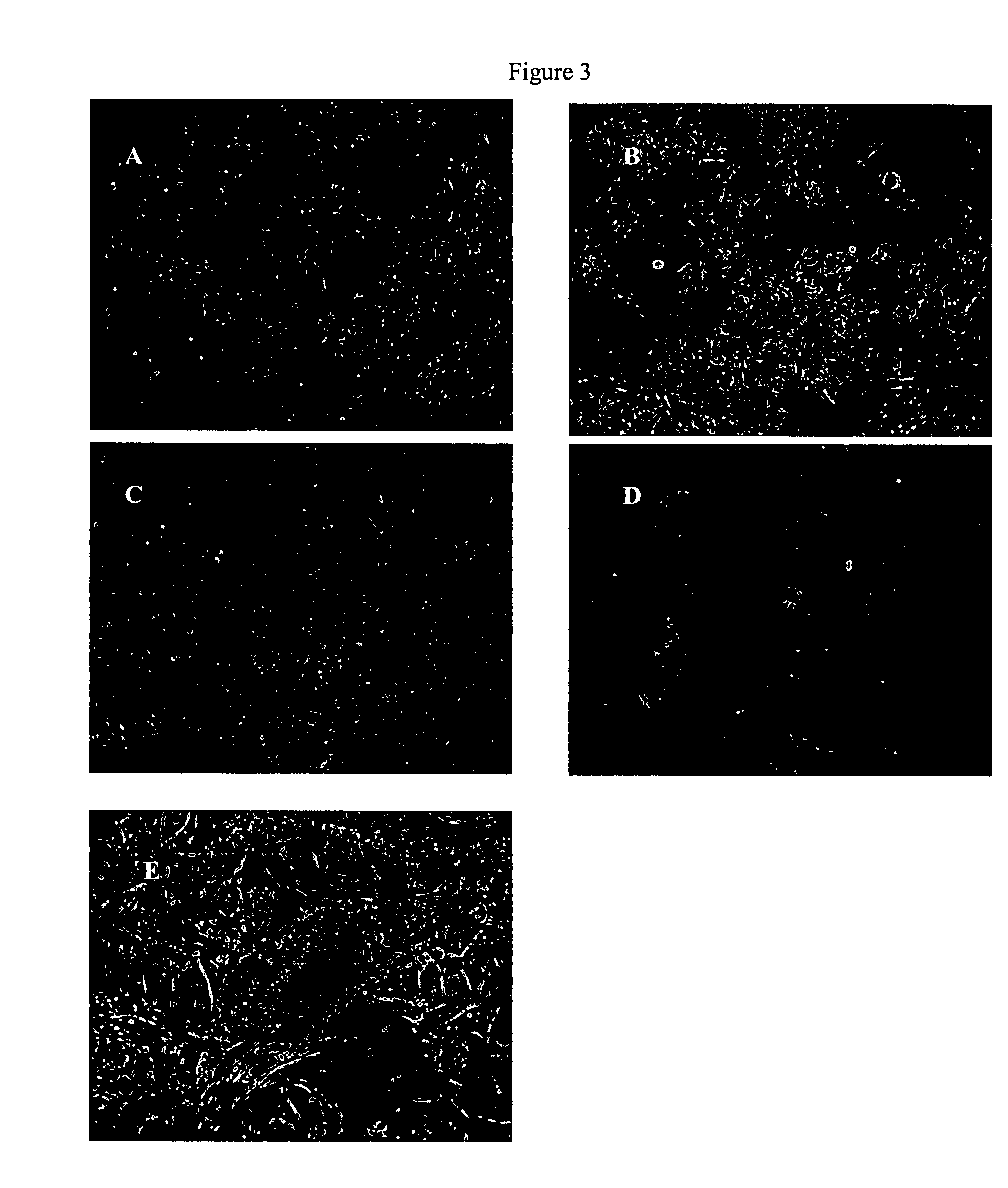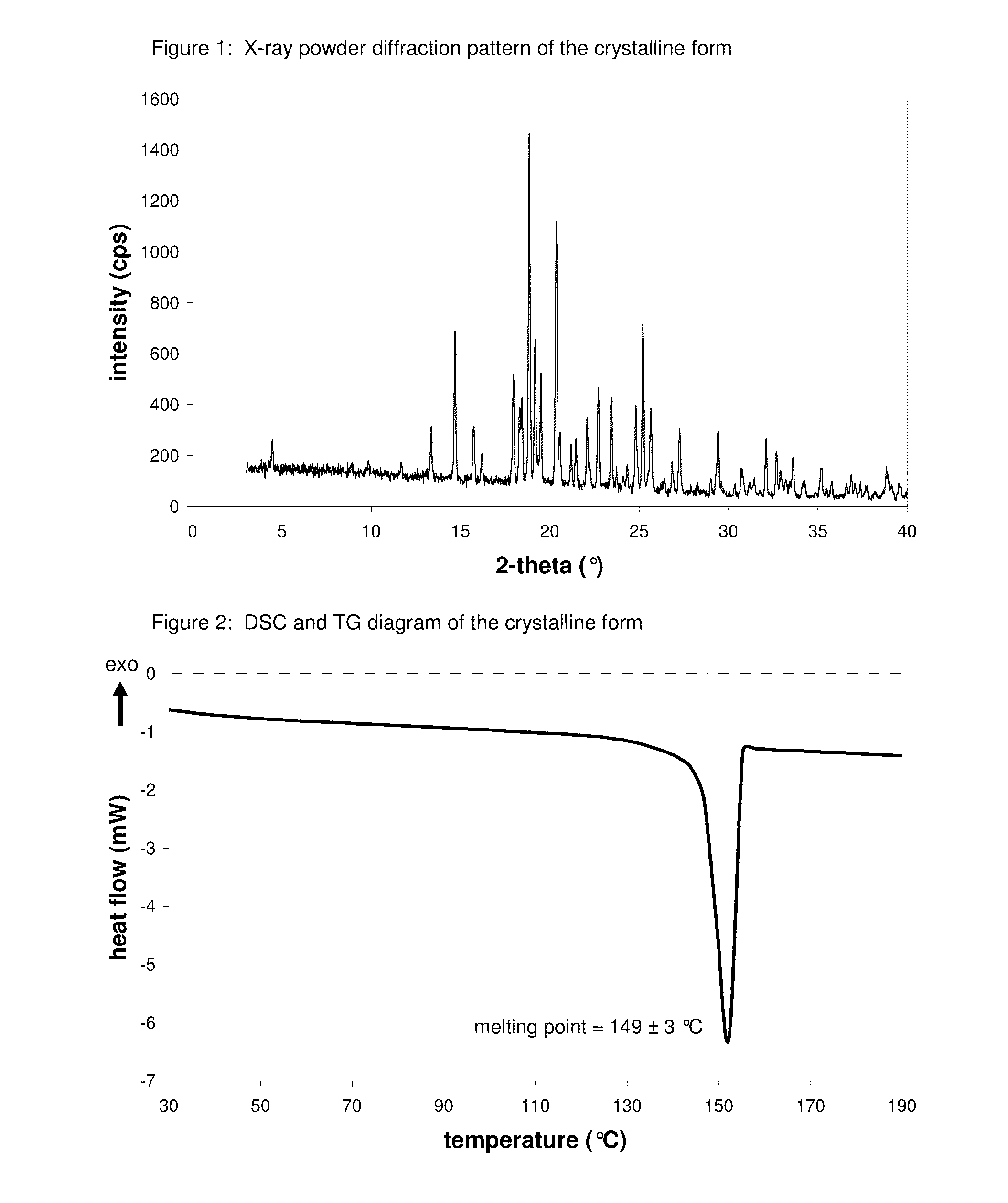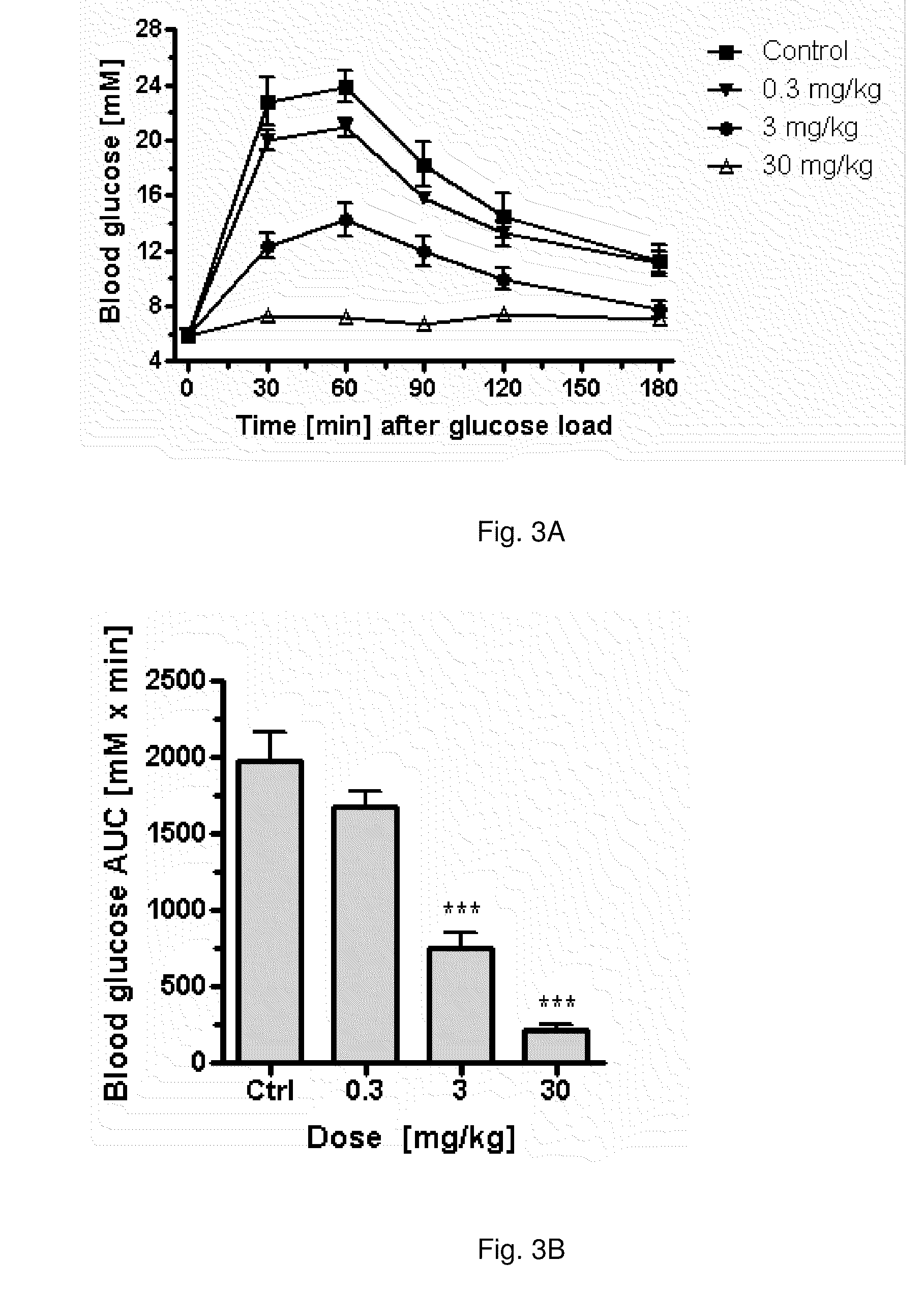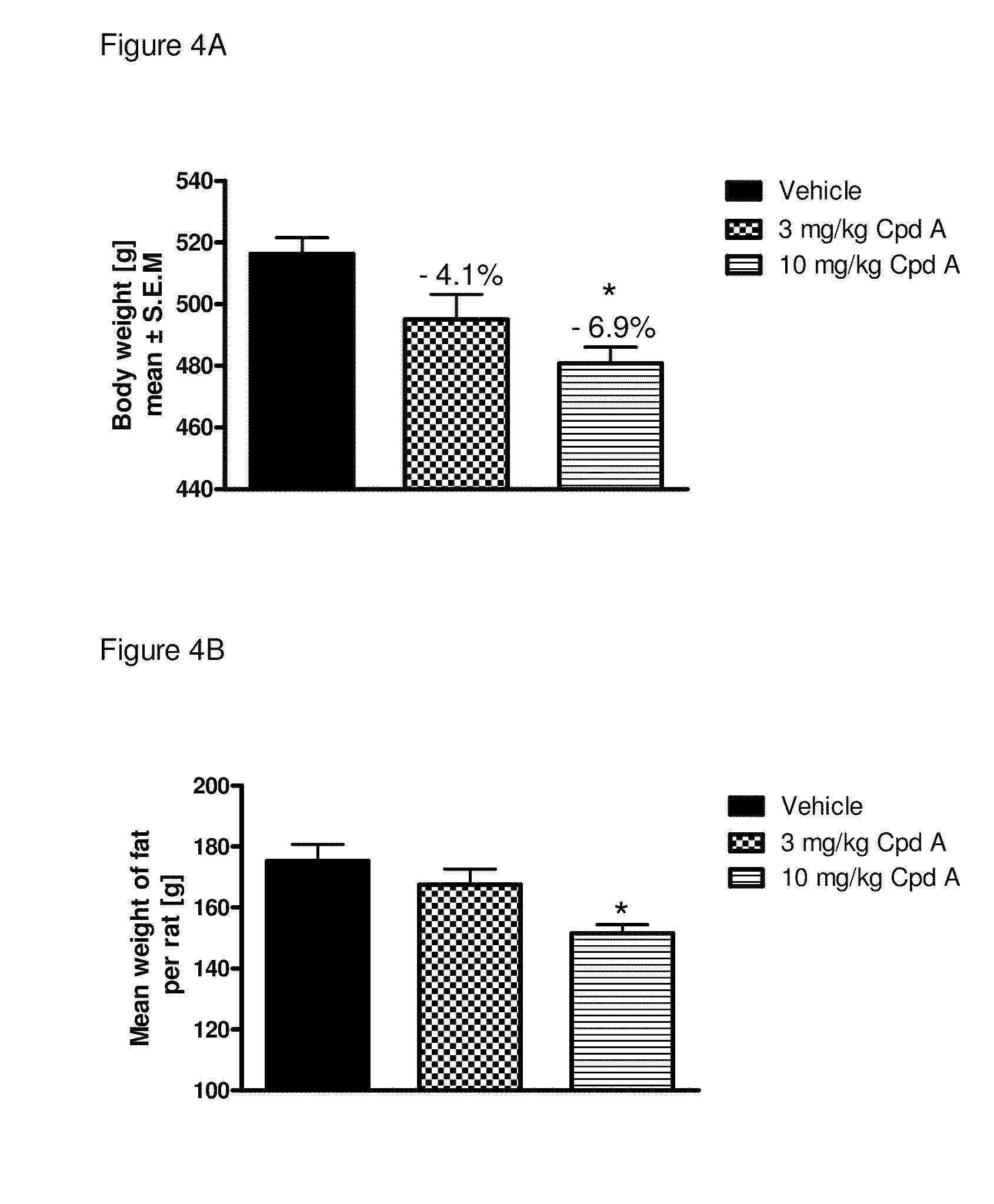Patents
Literature
1148 results about "Type 2 Diabetes Mellitus" patented technology
Efficacy Topic
Property
Owner
Technical Advancement
Application Domain
Technology Topic
Technology Field Word
Patent Country/Region
Patent Type
Patent Status
Application Year
Inventor
A type of diabetes mellitus that is characterized by insulin resistance or desensitization and increased blood glucose levels. This is a chronic disease that can develop gradually over the life of a patient and can be linked to both environmental factors and heredity.
Method and apparatus for gastrointestinal tract ablation for treatment of obesity
ActiveUS20080275445A1Reduce rateSlowing of gastric emptyingCatheterSurgical instruments for heatingBiological activationElectrode array
Devices and methods for ablating tissue in the wall of various organs of the gastrointestinal tract of a patient in order to cure or ameliorate metabolic pathophysiological conditions such as obesity, insulin resistance, or type 2 diabetes mellitus are provided. Ablational treatment of target areas may be fractional or partial, rendering a post-treatment portion of target tissue ablated and another portion that is substantially intact. Fractional ablation is achieved by controlling the delivery of ablational energy across the surface area being treated, and controlling the depth of energy penetration into tissue. Surface area control of energy delivery may controlled by the spatial pattern of distributed ablation elements or by the selective activation of a subset of a dense pattern of ablation elements. Embodiments of the device include an ablational electrode array that spans 360 degrees and an array that spans an arc of less than 360 degrees.
Owner:TYCO HEALTHCARE GRP LP
Fluorinated cyclic amides as dipeptidyl peptidase IV inhibitors
InactiveUS6710040B1Easy to prepareEase of detectabilityBiocideOrganic chemistryAcute coronary syndromeDisease progression
The invention relates to new therapeutically active and selective inhibitors of the enzyme dipeptidyl peptidase-IV, pharmaceutical compositions comprising the compounds and the use of such compounds for treating diseases that are associated with proteins that are subject to processing by DPP-IV, such as Type 2 diabetes mellitus, hyperglycemia, impaired glucose tolerance, metabolic syndrome (Syndrome X or insulin resistance syndrome), glucosuria, metabolic acidosis, cataracts, diabetic neuropathy, diabetic nephropathy, diabetic retinopathy, diabetic cardiomyopathy, Type 1 diabetes, obesity, conditions exacerbated by obesity, hypertension, hyperlipidemia, atherosclerosis, osteoporosis, osteopenia, frailty, bone loss, bone fracture, acute coronary syndrome, infertility due to polycystic ovary syndrome, short bowel syndrome, anxiety, depression, insomnia, chronic fatigue, epilepsy, eating disorders, chronic pain, alcohol addiction, diseases associated with intestinal motility, ulcers, irritable bowel syndrome, inflammatory bowel syndrome and to prevent disease progression in Type 2 diabetes. The invention also relates to a method of identifying an insulin secretagogue agent for diabetes.
Owner:PFIZER INC
Chemical composition and its delivery for lowering the risks of alzheimer's, cardiov ascular and type-2 diabetes diseases
Synergistic chemical compositions of bioactive compounds in a dietary supplement for lowering the risks of Alzheimer's, Cardiovascular and Diabetes diseases; chemical compositions of a sugar free super sweetener for people with Type-2 Diabetes disease and a targeted nano delivery of bioactive compounds and / or bioactive molecules are described. Furthermore, microelectro-mechanical system (Mems) based passive and active (based on feedback diagnostics data) delivery systems and methods of bioactive compounds and / or bioactive molecules are also described.
Owner:MAZED MOHAMMAD A +1
Method of treating benign forgetfulness
InactiveUS6335361B1Prevent and amelioratePrevent and ameliorate cognitive deficitBiocideNervous disorderMTBI - Mild traumatic brain injuryCarbon monoxide poisoning
Disclosed herein are methods to treat cognition disorders, particularly those associated with aging. The method comprises administering a combination of a carnitine and an oxidant. Preferably the oxidant is thioctic acid. Preferably 0.12 grams to 3 grams of carnitine (particularly ALC) and 0.12 and 1.5 grams of R-alpha-lipoic acid are administered. Optionally, coenzyme Q and / or creatine also are administered. Preferably 10 mg to 500 mg / day of coenzyme Q10 and 1 to 30 grams / day of creatine are administered. The same method can be used to treat cognition deficits associated with carbon monoxide poisoning, mild traumatic brain injury, Type 2 diabetes mellitus, obsessive-compulsive disorder, environmental toxin exposure, and other conditions.
Owner:JUVENON
GLP-1 gene delivery for the treatment of type 2 diabetes
ActiveUS7374930B2Efficient transfectionEasy to controlSugar derivativesPeptide/protein ingredientsGene deliveryGlucose polymers
This patent discloses compositions and methods of use thereof to normalize the blood glucose levels of patients with type 2 diabetes. It relates particularly to a plasmid comprising a chicken β actin promoter and enhancer; a modified GLP-1 (7-37) cDNA (pβGLP1), carrying a furin cleavage site, which is constructed and delivered into a cell for the expression of active GLP-1.
Owner:CLSN LAB
Chemical Compositon And Its Devlivery For Lowering The Risks Of Alzheimer's Cardiovascular And Type -2 Diabetes Diseases
ActiveUS20160004298A1Reduce riskInput/output for user-computer interactionTelevision system detailsThe InternetBiomarker (petroleum)
Chemical compositions of bioactive compounds and / or bioactive molecules for lowering the risks of Alzheimer's, Cardiovascular and Diabetes diseases are described. Targeted, passive and programmable / active deliveries of the bioactive compounds and / or bioactive molecules are described. Many embodiments of various subsystems for detection of disease specific biomarkers / an array of disease specific biomarkers and programmable / active delivery of the bioactive compounds and / or bioactive molecules in near real-time / real-time are also described. A portable internet appliance, a portable internet cloud appliance and an augmented reality personal assistant subsystem are also described along with various applications.
Owner:MAZED MOHAMMAD A +1
Biguanide and sulfonylurea formulations for the prevention and treatment of insulin resistance and type 2 diabetes mellitus
InactiveUS20030078269A1Maximum complementarityImprove effectivenessBiocidePeptide/protein ingredientsSulfonylureaTreatment level
The invention describes formulations that include either metformin, sulfonylurea or a biguanide-sulfonylurea combination as one active ingredient in addition to specific, other active ingredients. The compositions and dosage forms of the invention are clinically useful as methods for increasing the effectiveness, efficiency and safety of the included biguanide (metformin) and / or sulfonylurea in the prevention and treatment of insulin resistance and diabetes mellitus. The carefully chosen additional active ingredients of the invention are designed in a modular fashion to prevent and rectify adverse events associated with insulin resistance syndrome and diabetes mellitus, and those adverse incidences associated with the concurrent use of metformin and / or the sulfonylureas. When clinically administered, the invention will provide therapeutic levels of metformin and of a sulfonylurea, alone or in combination, and broaden their usefulness. The invention will retard the progression of insulin resistance to type 2 diabetes, and reduce the serious microvascular and macrovascular complications commonly associated with insulin resistance syndrome and diabetes mellitus.
Owner:CHRONORX
Novel compounds that inhibit dipeptidyl peptidase (DPP-IV) and neprilysin (NEP) and/or angiotensin converting enzyme (ACE)
This invention relates to novel compounds, compositions containing the compounds, that inhibit dipeptidyl peptidase (especially DPP-IV) and neprilysin (NEP, neutral endopeptidase) as well as dipeptidyl peptidase (especially DPP-IV) and angiotensin converting enzyme (ACE) and / or dipeptidyl Peptidase (especially DPP-IV) and vasopeptidases (especially ACE and NEP). These compounds and pharmaceutical compositions thereof are useful for the treatment as well as the prevention of type 2 diabetes mellitus.
Owner:MORPHOCHEM AG
Compounds and amyloid probes thereof for therapeutic and imaging uses
The present invention provides compounds and amyloid probes thereof that allow for an antemortem method of diagnosing AD and quantitating the extent or progression of amyloid deposits (plaques) by in vivo imaging of amyloid and / or amyloid deposits in the regions of the brain. Preferably, an amyloid probe of the invention can cross the blood-brain barrier and distinguish AD brain from normal brain. An amyloid probe can be administered to a patient in amounts suitable for in vivo imaging of amyloid deposits. Amyloid probes of the invention can also be used to detect and quantitate amyloid deposits in diseases including, without limitation, Down's syndrome, familial AD and homozygotes for the apolipoprotein E4 allele. In one aspect, the compounds may be used in the treatment or prophylaxis of diseases that include, without limitation, AD and type 2 diabetes mellitus. The compounds and amyloid probes of the invention include analogs, salts, pharmaceutical compositions, derivatives, prodrugs, racemic mixtures or tautomeric forms thereof.
Owner:MOLECULAR NEUROIMAGING
Azulene derivatives and salts thereof
The present invention provides an azulene derivative and a salt thereof, wherein an azulene ring is bonded to a benzene ring directly or via a lower alkylene which may be substituted with a halogen atom and the benzene ring is directly bonded to the glucose residue, and it is usable as a Na+-glucose cotransporter inhibitor, especially for a therapeutic and / or preventive agent for diabetes such as insulin-dependent diabetes (type 1 diabetes) and insulin-independent diabetes (type 2 diabetes), as well as diabetes-related diseases such as insulin-resistant diseases and obesity.
Owner:ASTELLAS PHARMA INC +1
Methods of treating type 2 diabetes with peptides acting as both GLP-1 receptor agonists and glucagon receptor antagonists
The invention provides polypeptides that act both as an agonist of the GLP-1 receptor and an antagonist of the glucagon receptor. Such polypeptides are useful for treating individuals with type 2 diabetes or other metabolic disorders.
Owner:BAYER HEALTHCARE LLC
Peptides acting as both GLP-1 receptor agonists and glucagon receptor antagonists and their pharmacological methods of use
InactiveUS20060003935A1Peptide/protein ingredientsMetabolism disorderMedicineNK1 receptor antagonist
The invention provides polypeptides that act both as an agonist of the GLP-1 receptor and an antagonist of the glucagon receptor. Such polypeptides are useful for treating individuals with type 2 diabetes or other metabolic disorders.
Owner:BAYER HEALTHCARE LLC
Device for local and/or regional delivery employing liquid formulations of therapeutic agents
InactiveUS20080181927A1Elimination reactionReduce riskBiocideSurgeryDiseasePercent Diameter Stenosis
Medical devices may be utilized for local and regional therapeutic agent delivery. These therapeutic agents or compounds may reduce a biological organism's reaction to the introduction of the medical device to the organism. In addition, these therapeutic drugs, agents and / or compounds may be utilized to promote healing, including the prevention of thrombosis. The drugs, agents, and / or compounds may also be utilized to treat specific disorders, including restenosis, vulnerable plaque, and atherosclerosis in type 2 diabetic patients. In regional delivery, liquid formulations may be desirable to increase the efficacy and deliverability of the particular drug. Various materials and coating methodologies may be utilized to maintain the agents or compounds on the medical device until delivered and positioned.
Owner:CARDINAL HEALTH SWITZERLAND 515 GMBH
Rapamycin coated expandable devices
Medical devices may be utilized for local and regional therapeutic agent delivery. These therapeutic agents or compounds may reduce a biological organism's reaction to the introduction of the medical device to the organism. In addition, these therapeutic drugs, agents and / or compounds may be utilized to promote healing, including the prevention of thrombosis. The drugs, agents, and / or compounds may also be utilized to treat specific disorders, including restenosis, vulnerable plaque, and atherosclerosis in type 2 diabetic patients.
Owner:CARDINAL HEALTH SWITZERLAND 515 GMBH
Method and apparatus for gastrointestinal tract ablation for treatment of obesity
ActiveUS8641711B2Reduce rateSlowing of gastric emptyingCatheterSurgical instruments for heatingBiological activationElectrode array
Devices and methods for ablating tissue in the wall of various organs of the gastrointestinal tract of a patient in order to cure or ameliorate metabolic pathophysiological conditions such as obesity, insulin resistance, or type 2 diabetes mellitus are provided. Ablational treatment of target areas may be fractional or partial, rendering a post-treatment portion of target tissue ablated and another portion that is substantially intact. Fractional ablation is achieved by controlling the delivery of ablational energy across the surface area being treated, and controlling the depth of energy penetration into tissue. Surface area control of energy delivery may controlled by the spatial pattern of distributed ablation elements or by the selective activation of a subset of a dense pattern of ablation elements. Embodiments of the device include an ablational electrode array that spans 360 degrees and an array that spans an arc of less than 360 degrees.
Owner:COVIDIEN LP
Compositions and methods relating to glucagon receptor antibodies
ActiveUS7947809B2Lowering blood glucoseImprove glucose toleranceMetabolism disorderDigestive systemPrevention of diabetes mellitus type 2Antigen binding
The present disclosure provides compositions and methods relating to antigen binding proteins, in particular, antibodies which specifically bind to the human glucagon receptor. The disclosure provides nucleic acids encoding such antigen binding proteins and antibodies and methods of making and using such antibodies including methods of treating and preventing type 2 diabetes and related disorders by administering such antibodies to a subject in need of such treatment.
Owner:AMGEN INC
Compositions and methods relating to glucagon receptor antibodies
ActiveUS20090041784A1Lowering blood glucoseImprove glucose toleranceImmunoglobulins against cell receptors/antigens/surface-determinantsFermentationPrevention of diabetes mellitus type 2Antigen binding
The present disclosure provides compositions and methods relating to antigen binding proteins, in particular, antibodies which specifically bind to the human glucagon receptor. The disclosure provides nucleic acids encoding such antigen binding proteins and antibodies and methods of making and using such antibodies including methods of treating and preventing type 2 diabetes and related disorders by administering such antibodies to a subject in need of such treatment.
Owner:AMGEN INC
Systems and Methods for Treatment of Obesity and Type 2 Diabetes
InactiveUS20110046537A1Reducing collateral tissue damageMinimize impactWound drainsOesophagiPylorusIt impact
The present invention provides systems and methods for treating and controlling obesity and / or type II diabetes. In one aspect of the invention, a device comprises a hollow sleeve sized and shaped for positioning within a duodenum of the patient, an anchor coupled to the proximal end of the sleeve and being sized and shaped to inhibit distal migration of the sleeve and a plurality of elastomeric objects coupled to the distal end of the sleeve and being sized and shaped to inhibit proximal migration of the sleeve through a pylorus of the patient. The bypass device can be placed and removed endoscopically through the patient's esophagus in a minimally invasive outpatient procedure and it is “self-anchoring” and does not require invasive tissue fixation within the patient's GI tract, thereby reducing collateral tissue damage and minimizing its impact on the digestive process.
Owner:E2 LLC DENTONS
Peptides acting as both GLP-1 receptor agonists and glucagon receptor antagonists and their pharmacological methods of use
The invention provides polypeptides that act both as an agonist of the GLP-1 receptor and an antagonist of the glucagon receptor. Such polypeptides are useful for treating individuals with type 2 diabetes or other metabolic disorders.
Owner:BAYER HEALTHCARE LLC
Chemical composition and its delivery for lowering the risks of alzheimer's, cardiovascular and type-2 diabetes diseases
ActiveUS20130338039A1Low risk of developingReduce productionPeptide librariesNucleotide librariesChemical compositionCvd risk
Chemical compositions of bioactive compounds and / or bioactive molecules for lowering the risks of Alzheimer's, Cardiovascular and Diabetes diseases are described. Targeted, passive and programmable / active deliveries of the bioactive compounds and / or bioactive molecules are described. Subsystems for detection of disease specific biomarkers / an array of disease specific biomarkers and programmable / active delivery of the bioactive compounds and / or bioactive molecules in near real-time / real-time are also described.
Owner:MAZED MOHAMMAD A +1
Use of cyclolignans for the treatment of type 2 diabetes and as contraceptives
There is disclosed use of certain cyclolignans for prophylaxis or treatment of diabetes mellitus type 2, nephropathy, retinopathy, macular degeneration, retinopathy of prematurity, central retinal vein occlusion, branch retinal vein occlusion, rubeotic glaucoma, thyroid eye disease, corneal graft rejection and corneal chemical burns; and for contraception. Preferred compounds are picropodophyllin, deoxypicropodophyllin and anhydropicropodophyllol. There is also described a method of treatment of an eye disease.
Owner:AXELAR
Synthesis of 3,3,4,4-tetrafluoropyrrolidine and novel dipeptidyl peptidase-IV inhibitor compounds
InactiveUS20040002609A1Easy to cutMetabolism disorderPhosphorus organic compoundsDisease progressionDisease cause
The present invention relates to a method of making novel dipeptidyl peptidase-IV ("DPP-IV') inhibitor compounds useful for treating, inter alia, diseases that are associated with proteins that are subject to processing by DPP-IV, such as Type 2 diabetes mellitus, metabolic syndrome (Syndrome X or insulin resistance syndrome), hyperglycemia, impaired glucose tolerance, glucosuria, metabolic acidosis, cataracts, diabetic neuropathy, diabetic nephropathy, diabetic retinopathy, diabetic cardiomyopathy, Type 1 diabetes, obesity, hypertension, hyperlipidemia, atherosclerosis, osteoporosis, osteopenia, frailty, bone loss, bone fracture, acute coronary syndrome, infertility due to polycystic ovary syndrome, short bowel syndrome and to prevent disease progression in Type 2 diabetes. The invention also relates to a method of making 3,3,4,4-tetrafluoropyrrolidine, a starting material utilized in the afore-mentioned method for preparing DPP-IV compounds.
Owner:PFIZER INC
Nerve stimulation for treatment of obesity, metabolic syndrome, and Type 2 diabetes
InactiveUS7702386B2Ameliorate or eliminate an attendant conditionElectrotherapyAcute hyperglycaemiaDyslipidemia
Owner:ADVANCED NEUROMODULATION SYST INC
Neural stimulation for treatment of metabolic syndrome and type 2 diabetes
InactiveUS7689277B2Reducing abdominal fat of a patientReduces attendant and contributing conditionElectrotherapySplanchnic nervesPeripheral neuron
Systems and methods are described for treating metabolic syndrome and / or Type 2 diabetes, and / or one or more of their attendant conditions, by neural stimulation. In one embodiment, an implantable pulse generator is electrically coupled to a peripheral nerve, such as the splanchnic nerve. Neural stimulation configured to either block transmission or stimulate transmission of the peripheral nerve may be used to treat metabolic syndrome and Type 2 diabetes.
Owner:ADVANCED NEUROMODULATION SYST INC
Cyclic guanidines, compositions containing such compounds and methods of use
The present invention relates to cyclic guanidines, compositions containing such compounds and methods of treatment. The compounds are glucagon receptor antagonists and thus are useful for treating, preventing or delaying the onset of type 2 diabetes mellitus.
Owner:MERCK SHARP & DOHME LLC
Methods of Preventing Cardiovascular Events in Residual Risk Dyslipidemic Populations
ActiveUS20180028505A1Reduce cardiovascular riskReduce riskMetabolism disorderPharmaceutical delivery mechanismDyslipidemiaPharmacological interventions
The present invention provides pharmacological interventions for the treatment of dyslipidemia, and to the reduction of residual risk of cardiovascular disease and adverse cardiovascular events in patients on intense statin use or with well-controlled LDL-C concentrations. In particular, the invention relates to the use of pemafibrate to prevent cardiovascular events in populations at-risk due to risk factors such as type 2 diabetes mellitus with dyslipidemia in spite of intense statin use or well-controlled LDL-C.
Owner:KOWA CO LTD
Layer - by - layer stereocomplexed polymers as drug depot carriers or coatings in medical devices
Medical devices, and in particular implantable medical devices, may be coated to minimize or substantially eliminate a biological organism's reaction to the introduction of the medical device to the organism. The medical devices may be coated with any number of biocompatible materials. Therapeutic drugs, agents or compounds may be mixed with the biocompatible materials and affixed to at least a portion of the medical device. These therapeutic agents or compounds may also further reduce a biological organism's reaction to the introduction of the medical device to the organism. In addition, these therapeutic drugs, agents and / or compounds may be utilized to promote healing, including the prevention of thrombosis. The drugs, agents, and / or compounds may also be utilized to treat specific disorders, including vulnerable plaque, and atherosclerosis in type 2 diabetic patients. Therapeutic agents may also be delivered to the region of a disease site. In regional delivery, liquid formulations may be desirable to increase the efficacy and deliverability of the particular drug. Various materials and coating methodologies may be utilized to maintain the agents or compounds on the medical device until delivered and positioned.
Owner:CARDINAL HEALTH SWITZERLAND 515 GMBH
Formulations for the prevention and treatment of insulin resistance and type 2 diabetes mellitus
InactiveUS7060295B2Improvement in therapeutic efficiency and safetyFavorable physiologic milieuPowder deliveryBiocideSulfonylureaBULK ACTIVE INGREDIENT
The compositions and dosage forms of the invention are clinically useful as methods for increasing the effectiveness, efficiency and safety of biguanides (metformin) and / or sulfonylureas in the prevention and treatment of insulin resistance and diabetes mellitus, alone or in combination, as a nutrient for humans. The carefully chosen active ingredients of the invention are designed in a modular fashion to prevent and rectify adverse events associated with insulin resistance syndrome and diabetes mellitus, and with the clinical use of biguanides (metformin) and / or the sulfonylureas. These modules are: (1) Mitochondrial Metabolic Group, (2) Plasma and Mitochondrial Membrane Integrity Group, (3) Nocturnal Group and, (4) Insulin Alternative Group. When used in concert with a biguanide, a sulfonylurea or with a combination of both, the invention will broaden the clinical usefulness of these drugs. The invention will retard the progression of insulin resistance to type 2 diabetes, and reduce the serious microvascular and macrovascular complications commonly associated with insulin resistance syndrome and diabetes mellitus.
Owner:CHRONORX
Peptides, derivatives and analogs thereof, and methods of using same
InactiveUS7393919B2Reduce needStimulating GLP-1 receptorsOrganic active ingredientsSenses disorderHuman Proislet PeptideProgenitor
Human proIslet Peptides (HIP) and HIP analogs and derivatives thereof, derived from or homologous in sequence to the human REG3A protein, chromosome 2p12, are able to induce islet neogenesis from endogenous pancreatic progenitor cells. Human proIslet Peptides are used either alone or in combination with other pharmaceuticals in the treatment of type 1 and type 2 diabetes and other pathologies related to aberrant glucose, carbohydrate, and / or lipid metabolism, insulin resistance, overweight, obesity, polycystic ovarian syndrome, eating disorders and the metabolic syndrome.
Owner:CUREDM GRP HLDG
Pharmaceutical composition, methods for treating and uses thereof
InactiveUS20110046087A1Prevent and slow progressionImprove blood sugar controlBiocideSenses disorderIGT - Impaired glucose toleranceAcute hyperglycaemia
The invention relates to the treatment or prevention of one or more conditions selected from type 1 diabetes mellitus, type 2 diabetes mellitus, impaired glucose tolerance and hyperglycemia using a SGLT-2 inhibitor. In addition the present invention relates to methods for preventing or treating of metabolic disorders and related conditions.
Owner:BOEHRINGER INGELHEIM INT GMBH
Features
- R&D
- Intellectual Property
- Life Sciences
- Materials
- Tech Scout
Why Patsnap Eureka
- Unparalleled Data Quality
- Higher Quality Content
- 60% Fewer Hallucinations
Social media
Patsnap Eureka Blog
Learn More Browse by: Latest US Patents, China's latest patents, Technical Efficacy Thesaurus, Application Domain, Technology Topic, Popular Technical Reports.
© 2025 PatSnap. All rights reserved.Legal|Privacy policy|Modern Slavery Act Transparency Statement|Sitemap|About US| Contact US: help@patsnap.com
